Here’s our look at the Trump administration and the rest of Washington:
- Hillary Clinton speaks in Washington D.C., criticizes Trump’s spending plan
- Former Trump advisor Michael Flynn offers to testify in return for immunity
- Trump threatens to fight his own party’s hard-right flank in 2018 elections
- Senate Intelligence Committee vows to follow facts in Trump-Russia probe
- Judge in Hawaii extends order blocking Trump’s travel ban
- Ivanka Trump gets formal position in White House
- Share via
Adam Schiff views documents White House says back Trump surveillance claim
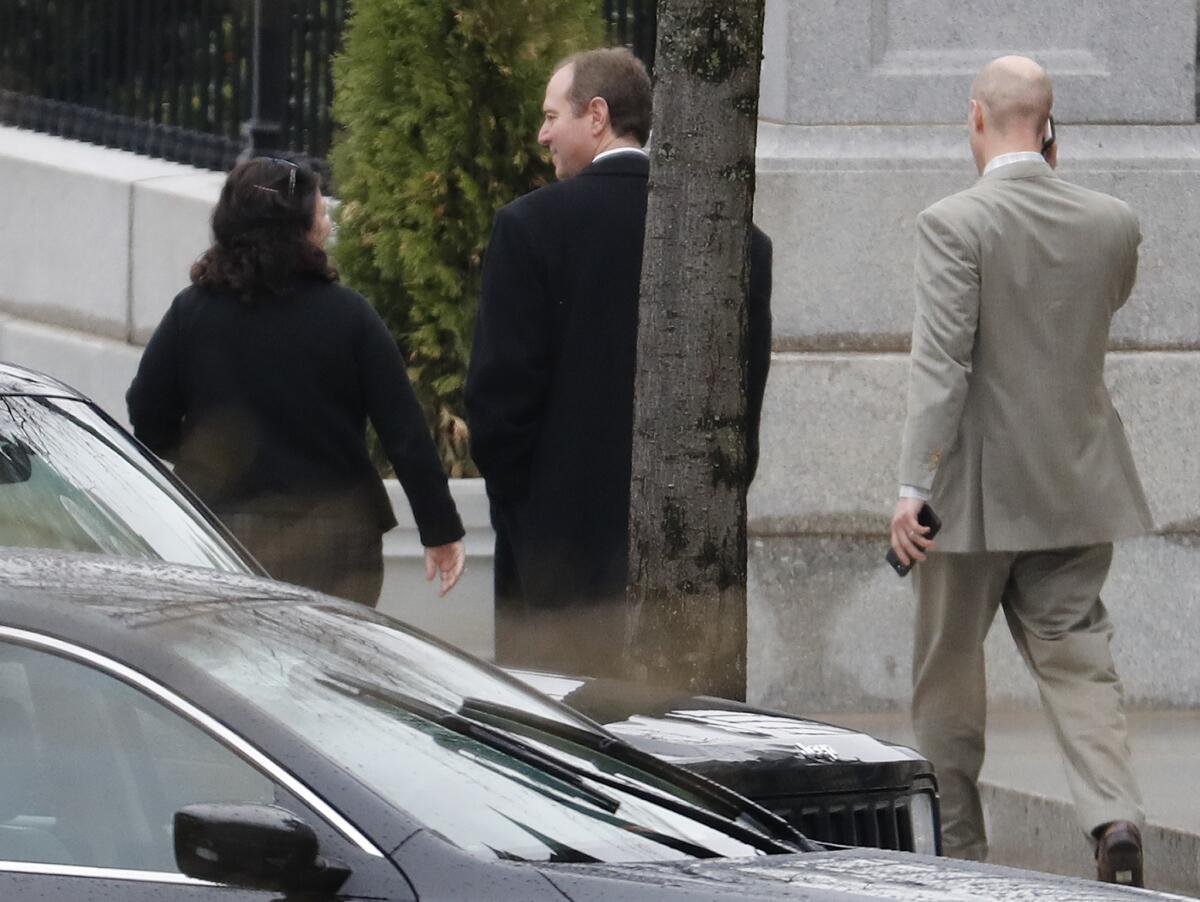
Rep. Adam Schiff (D-Burbank) traveled to the White House Friday to view documents President Trump has said partially vindicate his claim that his predecessor ordered surveillance of him during the campaign.
In a statement, the top Democrat on the House Intelligence Committee said he was told they were “precisely the same materials” viewed previously by the committee’s chairman, Rep. Devin Nunes (R-Tulare), which Schiff said should now be shared with the full panel membership.
“Nothing I could see today warranted a departure from the normal review procedures,” Schiff said, adding that he could not discuss the contents of the documents, which remain classified.
Nunes was shown the documents last week by White House officials surreptitiously, then announced to reporters the next day that he needed urgently to go to the White House to brief Trump about them.
Schiff, in his statement, said that “the White House has yet to explain why senior White House staff apparently shared these materials with but one member of either [Intelligence] committee, only for their contents to be briefed back to the White House.”
Schiff also had a brief but “cordial” meeting with Trump during his time at the White House, a spokesman said.
White House spokesman Sean Spicer told reporters earlier Friday that other Democrats have been invited to the White House to view the materials, which he said would “shed light” on their investigation.
Both the House and Senate Intelligence Committees are conducting separate reviews of Russian interference into the 2016 election; Trump has asked each panel to also probe his own claim that his predecessor engaged in wire tapping of his phones at Trump Tower during the campaign, an assertion that has been denied by Nunes as well as the heads of the FBI and intelligence agencies.
- Share via
Mnuchin regrets plugging ‘The Lego Batman Movie,’ pledges to ‘exercise greater caution’ in the future
Treasury Secretary Steven Mnuchin on Friday told a top government ethics official he should not have publicly plugged “The Lego Batman Movie” — a film in which he has a financial stake — and promised to “exercise greater caution” in the future.
“I take very seriously my ethical responsibilities as a presidential appointee and the head of the Department of the Treasury,” Mnuchin wrote to Walter Shaub, director of the U.S. Office of Government Ethics.
On Monday, Sen. Ron Wyden (D-Ore.) asked Shaub to determine whether Mnuchin had committed an ethics violation last week when he discussed the movie during an event hosted by the Axios news website that aired on C-SPAN2.
- Share via
Rep. Adam Schiff says it’s too early to consider an immunity deal for Michael Flynn
The top Democrat on the House Intelligence Committee says it’s too early to consider an immunity deal for President Trump’s former national security advisor.
Rep. Adam Schiff (D-Burbank) says that Michael Flynn even discussing possible immunity in exchange for protection from prosecution is a “grave and momentous” step because of the seniority of his former position.
Schiff says the House Intelligence Committee is interested in hearing Flynn’s story, but there would have to be coordination with the Senate Intelligence Committee and the Justice Department on the terms.
The House and Senate intelligence committees and the FBI are investigating Russia’s meddling in the 2016 election. The investigation includes scrutiny of Flynn’s ties with Russia.
- Share via
Trump administration admonishes California chief justice over claim that agents are ‘stalking’ immigrants
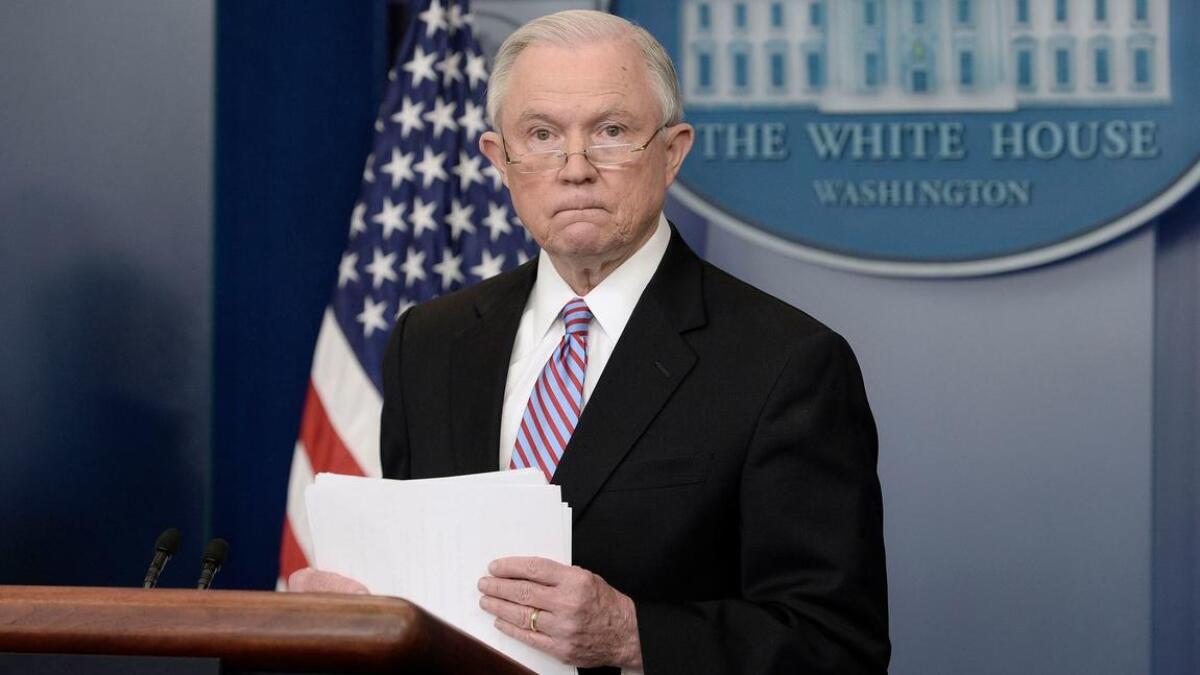
The Trump administration on Friday fired back at California’s top judge, disputing her characterization this month that federal immigration agents were “stalking” courthouses to make arrests.
In a letter to Chief Justice Tani Cantil-Sakauye, leaders of Trump’s Justice Department and Department of Homeland Security objected to her description of federal agents’ conduct.
“As the chief judicial officer of the state of California, your characterization of federal law enforcement is particularly troubling,” wrote Atty. Gen. Jeff Sessions and Homeland Security Secretary John Kelly, objecting to Cantil-Sakauye’s use of the word “stalking.”
They said agents with U.S. Immigration and Customs Enforcement (ICE) were using courthouses to arrest immigrants in the U.S. illegally, in part, because California and some of its local jurisdictions prohibit their officials from cooperating with federal agencies in detaining such immigrants under most conditions.
Sessions and Kelly told California’s top judge that she should consider taking her concerns to Gov. Jerry Brown and the cities and counties that limit local law enforcement’s involvement with immigration agents.
Cantil-Sakauye, a former prosecutor who rose through the judicial ranks as an appointee of Republican governors, said through a spokesman that she appreciated the Trump administration’s “admission that they are in state courthouses making federal arrests.”
“Making arrests at courthouses, in my view, undermines public safety because victims and witnesses will fear coming to courthouses to help enforce the law,” she said Friday.
She expressed disappointment that courthouses, given local and state public safety concerns, were not listed as sensitive areas offlimits to agents. Federal policy lists schools, churches and hospitals as “sensitive areas.”
The letter from the Justice Department officials defended the arrests of immigrants at courthouses.
By apprehending suspects after they have passed through security screening at courthouses, federal agents are less likely to encounter anyone who is armed, the letter said.
“The arrest of individuals by ICE officers and agents is predicated on investigation and targeting of specific persons who have been identified by ICE and other law enforcement agencies as subject to arrest,” they wrote.
Cantil-Sakauye had asked the Trump administration on March 16 to stop immigration agents from seeking immigrants at the state’s courthouses.
“Courthouses should not be used as bait in the necessary enforcement of our country’s immigration laws,” she wrote in a letter to Sessions and Kelly.
Her letter did not say which courthouses had been the location of such “stalking,” but judges and lawyers in Southern California have complained of seeing immigration agents posted near courts.
She said she feared the practice would erode public trust in the state courts.
Sessions and Kelly urged Cantil-Sakauye to speak to Brown and other officials “who have enacted policies that occasionally necessitate ICE officers and agents to make arrests at courthouses and other public places.”
- Share via
Back in the spotlight, Hillary Clinton takes aim at Trump’s budget
Hillary Clinton stepped back into the spotlight this week after laying relatively low since the election, and she had some advice for President Trump: Tear up the White House budget plan.
Clinton was at the Georgetown Institute for Women, Peace and Security to bestow an award named in her honor to Colombian leaders who helped bring an end to war in that country and elevate the role of women in the peace process.
She spoke of the progress the world has made in advancing women’s rights since she spoke forcefully on the issue two decades ago when the U.N. gathered world leaders to address it in Beijing. But she warned that progress is threatened by Trump.
“We are seeing signals of a shift that should alarm us all,” Clinton said. “This administration’s proposed cuts to international health, development and diplomacy would be a blow to women and children and a grave mistake for our country.”
Clinton then raised the letter signed by 120 former generals and admirals beseeching the Trump administration not to make the cuts.
“These distinguished men and women who have served in uniform recognize that turning our back on diplomacy won’t make our country safer. It will undermine our security and our standing in the world.”
A lot has changed since Clinton was on the campaign trail, but some things about her style on the stump haven’t. She pulled out a favorite line from last year as she began to talk about a study that backed up her point about the damage Trump’s budget plan could do.
“Here I go again,” Clinton said to whooping and cheering from an audience of mostly female students, “talking about research evidence and facts.”
- Share via
Seeking a way forward, Trump increasingly finds himself at odds with his own party
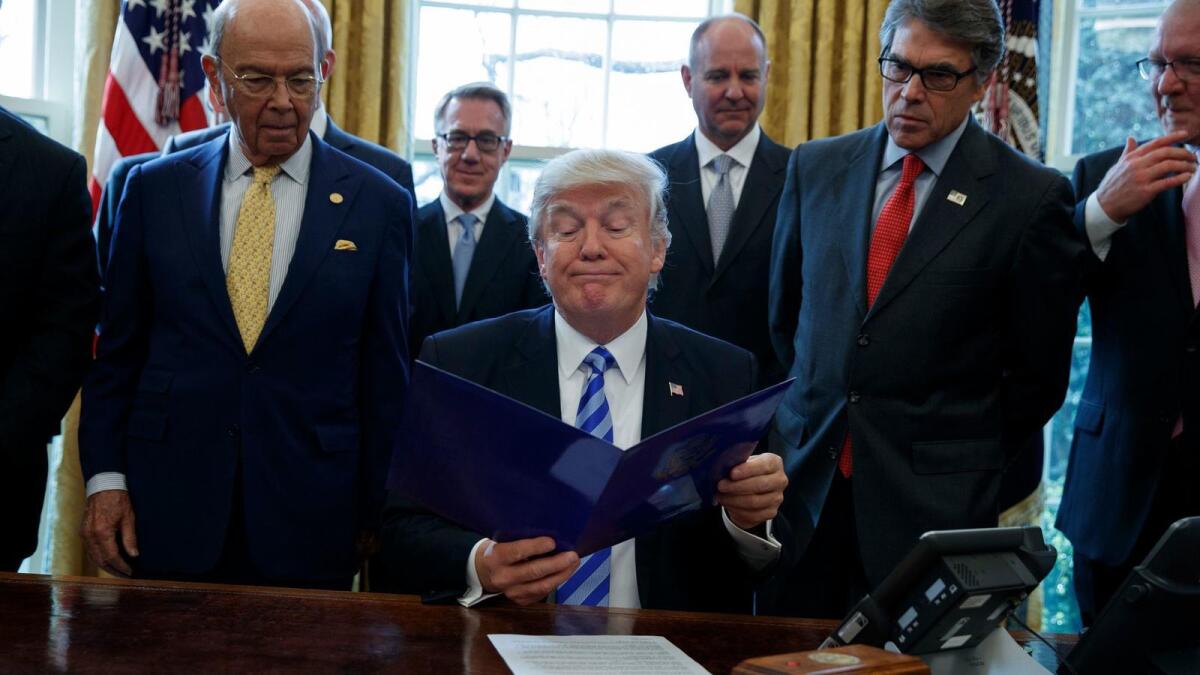
President Trump won his office in spite of the best efforts of some in his party.
Now, the tenuous nature of the bonds between Trump and the GOP are increasingly on public display as the president openly feuds with conservatives and White House officials debate whether to reach out to Democrats in order to restart his domestic agenda.
The latest and strongest evidence came Thursday as Trump escalated his political battle against the members of the House Freedom Caucus, the conservative lawmakers who helped block the healthcare bill he backed.
Early in the morning, he said on Twitter that the caucus would “hurt the entire Republican agenda if they don’t get on the team.”
“We must fight them, & Dems, in 2018!” he added.
It was an extraordinary message, suggesting that Trump might try to back challengers in primaries against lawmakers of his own party — something few presidents have tried, none with much success.
- Share via
Tillerson tells NATO allies to pay more, do more to fight terrorism
Secretary of State Rex Tillerson on Friday promised NATO allies that the United States will stand by their side but also expected them to spend more on defense and do more to fight terrorism.
Tillerson participated in a day of discussions with foreign ministers from the 27 other NATO member nations, his first with the full roster of allies, who were sent scrambling last week to accommodate the top U.S. diplomat after he said he could not attend the meeting originally planned for early April.
“The United States is committed to ensuring NATO has the capabilities to support our collective defense. We understand that a threat against one of us is a threat against all of us,” Tillerson said.
But, he added, “as President Trump has made clear, it is no longer sustainable for the U.S. to maintain a disproportionate share of NATO’s defense expenditures.”
The United States is amping up pressure on NATO members to increase their defense spending to 2% of gross domestic product, in line with a 2014 agreement among the alliance’s 28 member countries to meet the target by 2024.
Only five NATO countries meet the 2% threshold. The U.S. spends 3.61% of its GDP on defense, more than any other member of the alliance.
Tillerson said that if countries have not met the 2% spending goal by the end of the year, they should at least have a concrete plan “that clearly articulates how, with annual milestone progress commitments, the pledge will be fulfilled.”
Pressure to meet that strict deadline is likely to upset some allies.
German Vice Chancellor Sigmar Gabriel told reporters before Friday’s meeting that he thinks it would be “completely unrealistic” for Germany to bring its military defense spending up to 2% of GDP.
“I don’t know any politician in Germany who thinks that this would be reachable or desirable,” Gabriel said.
Germany is increasing its military spending this year to $39 billion, or 1.2% of its GDP. Gabriel rejected the Trump administration’s focus on military expenditures, arguing that humanitarian aid and Germany’s spending to take in refugees should be considered part of the defense budget.
Tillerson also called on allies to take a greater role in the fight against terrorism.
“NATO can and should do more,” he said. “Fighting terrorism is the top national security priority for the United States, as it should be for all of us.”
Tillerson’s earlier announcement that he would skip the meeting struck a nerve among the alliance members, coming at a sensitive time when tensions between the Trump administration and NATO allies have soared.
The schedule change caused an awkward protocol shuffle, with a handful of foreign ministers unable to make it to Brussels. What was supposed to be a two-day meeting was compressed into half of a day.
NATO Secretary-General Jens Stoltenberg tried to cast optimism on the last-minute schedule change, calling it “a sign of the strong transatlantic unity and flexibility of our alliance that we were able to find a date.”
The foreign ministers’ meeting is crucial because it lays the groundwork for a NATO summit with heads of state in May, which will be President Trump’s first overseas trip since taking office.
Tillerson’s day of talks at NATO headquarters in Brussels follows visits from Defense Secretary James Mattis and Vice President Mike Pence, who attempted to dispel fears that the Trump administration will seek to loosen ties with the alliance.
Trump called NATO “obsolete” in an interview published days before his inauguration. He later insisted, during German Chancellor Angela Merkel’s visit to the White House earlier this month, that the U.S. will maintain its “strong commitment” to the alliance.
Tillerson arrived in Brussels on Friday morning after meeting Thursday in Ankara, Turkey, with that country’s President Recep Tayyip Erdogan and Foreign Minister Mevlut Cavusoglu to discuss terrorism and Syria, though the leaders failed to reach an agreement on how to combat Islamic State.
- Share via
Trump weighs in on Michael Flynn’s request for immunity
President Trump’s former national security advisor, retired Army Lt. Gen. Michael Flynn, is seeking immunity from prosecution in return for testifying to the House and Senate intelligence committees, a congressional aide said. The development was first reported by the Wall Street Journal.
“Gen. Flynn certainly had a story to tell, and he very much wants to tell it, should the circumstances permit,” his lawyer, Robert Kelner, said in a statement. “No reasonable person, who has the benefit of advice from counsel, would submit to questioning in such a highly politicized, witch-hunt environment without assurances from unfair prosecution.”
On Friday morning, Trump tweeted his support for Flynn’s request.
Flynn was ousted as Trump’s national security advisor last month after news reports disclosed that he had misled Vice President Mike Pence about phone conversations with Sergey Kislyak, Russia’s ambassador to the U.S.
The calls were picked up by U.S. surveillance targeting the Russian envoy, and a description of the contents was leaked to the Washington Post after the Justice Department warned the White House that Flynn could be subject to blackmail.
- Share via
Former national security advisor Michael Flynn seeks immunity
President Trump’s former national security advisor, retired Lt. Gen. Michael Flynn, has been seeking immunity from prosecution in return for testifying to the House and Senate intelligence committees, a congressional official confirmed Thursday.
The negotiations were first reported by the Wall Street Journal.
In a statement, Flynn’s lawyer, Robert Kelner, said “Gen. Flynn certainly had a story to tell and he very much wants to tell it, should the circumstances permit.”
“No reasonable person, who has the benefit of advice from counsel, would submit to questioning in such a highly politicized, witch-hunt environment without assurances from unfair prosecution.”
Trump fired Flynn three weeks into the new administration after news reports disclosed that he had lied to White House colleagues, including Vice President Mike Pence, about his contacts with Sergey Kislyak, Russia’s ambassador to the U.S.
In December, Flynn had telephone conversations with Kislyak in which he discussed sanctions that the Obama administration had recently imposed on Russia to punish Moscow for its interference in the 2016 presidential election.
Flynn denied to Pence and other officials that he had discussed the sanctions with Kislyak.
So far, the committees, which are investigating Russian interference and whether anyone close to Trump colluded with Moscow, have not taken Flynn up on his offer, the Journal reported.
- Share via
Trump administration appeals Hawaii judge’s order against travel ban
The Department of Justice has appealed a Hawaii court order that brought President Trump’s travel ban to a national halt.
The government has argued that the president was well within his authority to restrict travel from six Muslim-majority countries and put a pause on refugee resettlement.
The appeal Thursday to the U.S. 9th Circuit Court of Appeals came a day after U.S. District Judge Derrick Watson in Honolulu refused to dismiss his temporary block of the travel ban that he issued on March 15.
With the appeal, the government is now fighting to reinstate the travel ban in two appeals courts on opposite ends of the country. That increases the likelihood that one of the cases will make it to the U.S. Supreme Court.
Earlier this month, the Department of Justice appealed a Maryland district judge’s order against the travel ban to the U.S. 4th District Court of Appeals in Richmond, Va.
Both rulings in Hawaii and Maryland said Trump’s executive order discriminated against Muslims. Watson and U.S. District Judge Theodore Chuang in Maryland cited Trump’s campaign promises to suspend Muslim travel to the U.S. as proof of his order’s anti-Muslim bias.
The Hawaii ruling is broader than the Maryland one. It blocks a 90-day pause on travel to the U.S. from nationals of six majority-Muslim countries and a 120-day moratorium on new refugee resettlement. The Maryland ruling only halted the ban on travel into the U.S. by citizens of Iran, Libya, Somalia, Sudan, Syria and Yemen.
The 9th Circuit, which has jurisdiction over nine Western states, is the same court where a panel of three judges denied a government request last month to reverse ruling against the first travel ban by a federal judge in Washington state.
Trump, in turn, lambasted the “bad court” and signed a new executive order on travel on March 6 that was modified in an attempt to survive court challenges.
- Share via
Senate heads for ‘nuclear option’ if Democrats filibuster Gorsuch nomination
One of the Senate’s most serious jobs – confirming the president’s choice for a lifetime appointment to the Supreme Court – has devolved into a game of political chicken.
Senators are heading toward an institution-defining showdown next week as Democrats promise to try to block President Trump’s nominee, Judge Neil M. Gorsuch, with a filibuster, a rarely seen maneuver for high court appointments.
Republicans are threatening to respond by changing long-standing Senate rules to circumvent the 60 votes that would be needed to overcome a filibuster. Instead they would allow confirmation with a simple majority.
The outcome has the potential to not only shape the future of the Supreme Court — which has been without a full bench since the sudden death of Justice Antonin Scalia last year — it also could crush one final vestige of bipartisanship in the Senate, altering the upper chamber for years to come.
The battle over the Supreme Court seat was always expected to be a partisan affair in today’s heated political climate. But the polemics intensified after the Republican majority denied President Obama’s nominee, Judge Merrick Garland, a confirmation hearing ahead of last year’s presidential election.
- Share via
Scalia’s seat has been vacant longer than any Supreme Court justice’s in nearly 50 years
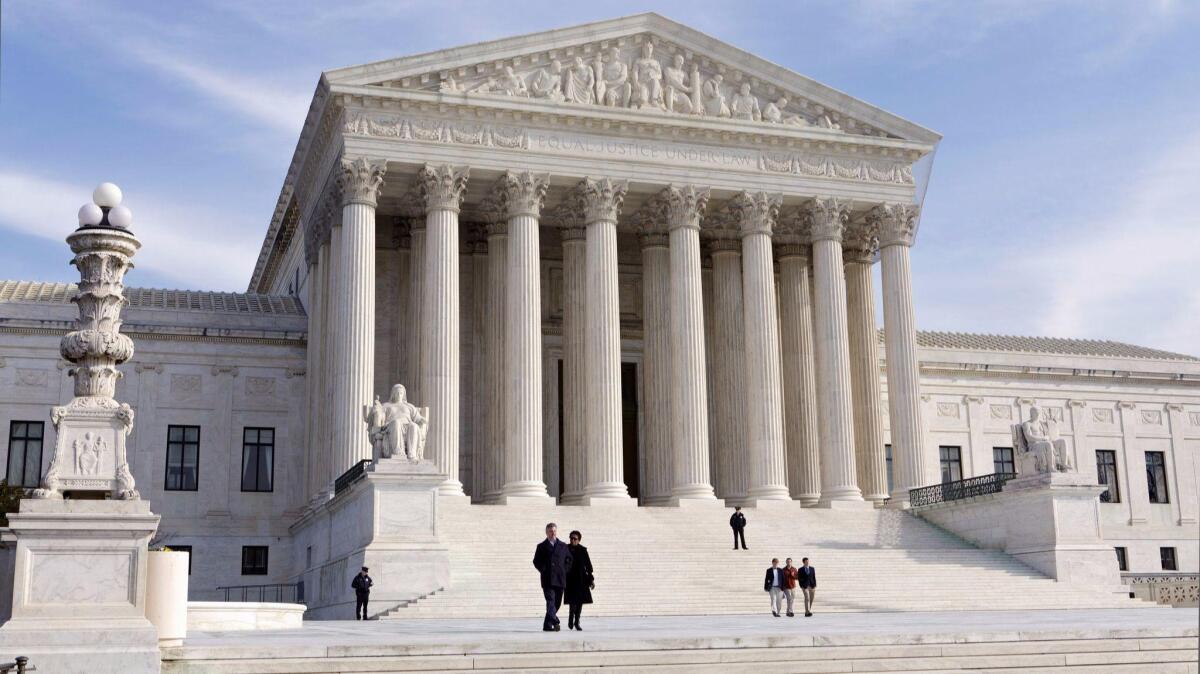
It’s been more than 400 days since Supreme Court Justice Antonin Scalia’s death left his seat vacant. With Republicans having blocked a vote on then-President Obama’s nominee, Judge Merrick Garland, and with Senate Democrats now making plans to filibuster President Trump’s nominee, Judge Neil M. Gorsuch, it could take even longer to replace Scalia.
It’s not unheard of for a justice’s seat to remain empty for a considerable amount of time. Pew Research Center did the math and found that the longest gap was 841 days, in the mid-1840s, from the time of Henry Baldwin’s death to his replacement Robert Grier’s confirmation.
But the last time in recent history that a vacancy’s duration in this range occurred was after Abe Fortas resigned in 1969. It took 391 days to fill that seat, an interval that ended in 1970 when Harry Blackmun – the justice who authored the court’s landmark opinion in Roe vs. Wade – was confirmed. Blackmun was President Nixon’s third pick to fill that seat.
The second-longest vacancy in recent years occurred in 1988. It took 237 days to fill Lewis Powell’s seat after he retired, with Anthony Kennedy succeeding him.
It’s been 58 days and counting since Trump nominated Gorsuch. Here’s how his waiting time from nomination to confirmation stacks up against the current justices:
- Elena Kagan: 87 days
- Sonia Sotomayor: 66 days
- Samuel A. Alito Jr.: 82 days
- John G. Roberts Jr.: 23 days
- Stephen G. Breyer: 73 days
- Ruth Bader Ginsburg: 50 days
- Clarence Thomas: 99 days
- Anthony M. Kennedy: 65 days
If Gorsuch is confirmed soon, he won’t start considering cases until the court’s new term in October.
And if he’s not confirmed? Trump would nominate another successor to Scalia – there’s no limit on how many times he can do that. Until Scalia’s seat is filled, lower courts’ decisions serve as tie-breakers.
- Share via
Sens. Manchin and Heitkamp become first Democrats to announce support for Gorsuch
Sens. Joe Manchin of West Virginia and Heidi Heitkamp of North Dakota became the first Democrats to say they will vote for Judge Neil Gorsuch and not support the effort to filibuster his confirmation to the Supreme Court.
Their announcements came as no surprise. Both are centrists who have to run for reelection next year in states that voted overwhelmingly for Trump.
“After considering his record, watching his testimony in front of the Judiciary Committee and meeting with him twice, I will vote to confirm him to be the ninth justice on the Supreme Court,” Manchin said. “I have found him to be an honest and thoughtful man.... I have not found any reasons why this jurist should not be a Supreme Court justice.”
Heitkamp said she was impressed with Gorsuch’s record as a judge. “This vote does not diminish how disturbed I am by what the Republicans did to Judge [Merrick] Garland,” referring to the GOP-led Senate’s refusal last year to consider President Obama’s choice to fill the seat of the late Justice Antonin Scalia. “But I was taught that two wrongs don’t make a right,” she said.
The Republican majority in the Senate needs six more Democrats to join with them if they hope to stop the expected filibuster of President Trump’s Supreme Court nominee.
It takes 60 votes to end the debate under the Senate’s current rules. But the 52 Republicans may vote to simply eliminate this requirement if the Democrats stand firm against Gorsuch.
On Monday, the Senate Judiciary Committee is expected to approve Gorsuch on a party line vote and send the nomination to the Senate floor. A final vote is expected April 7.
- Share via
White House invites lawmakers to see intelligence material after New York Times report
The White House has invited House and Senate intelligence committee chairs to review documents that it says were recently discovered by national security staff that could help determine whether information gathered about American citizens was mishandled.
White House spokesman Sean Spicer would not say whether these are the same documents that Rep. Devin Nunes, the Tulare Republican who chairs the House intelligence committee, said he reviewed last week.
Nunes has refused to identify his sources. Some saw his disclosure as an attempt to give credence to President Trump’s widely refuted claim that President Obama had ordered wiretaps on his phone during the campaign. Nunes said the material he reviewed suggested that intelligence agencies had incidentally collected information about Trump or his associates. He has declined to be more specific or share the information with the committee.
But the New York Times reported Thursday, citing unnamed sources, that two White House officials helped Nunes get access to the documents. And now the same information may be provided to other members of the Intelligence committee.
In a letter to the bipartisan group of intelligence leaders sent Thursday, White House Counsel Donald McGhan said administration lawyers would supervise the review “given the sensitivity of the documents” to “protect the extremely sensitive intelligence sources and methods.”
The letter calls on the committee to investigate the possibility that classified information was inappropriately gathered and handled and whether civil liberties of American citizens were violated.
Rep. Adam Schiff (D-Burbank), the ranking Democrat on the House Intelligence Committee, told reporters that he welcomed the chance to review the materials, though he said he would be obligated to share them with the rest of his committee.
More troubling to Schiff, he said, was the “cloak and dagger stuff” and “circuitous route” that the White House national security staff appears to have used to disseminate the materials in that secret meeting with Nunes. Schiff said White House staff may have been trying to “launder information through the committee,” rather than simply providing it directly to the president.
“If that was designed to hide the origin of the materials, that raises profound questions about just what the White House is doing,” Schiff said. “We need to get to the bottom of whether this was some sort of stratagem by the White House.”
In a letter to McGhan, Schiff said answering the White House’s questions would require asking intelligence agencies how the information in the documents was gathered.
“I hope you will confirm to the committee whether these materials are the same as those first shared with” Nunes, Schiff wrote.
2:11: This story was updated with staff reporting
- Share via
Trump’s team: A network of ties to Russia
The FBI is investigating possible coordination between people associated with the Trump campaign and Russian authorities during the 2016 election. The U.S. intelligence community has said it is confident that the Russian government directed hacking operations and “intended to interfere with the U.S. election process.”
Take a look at how some high-profile people have been drawn into the investigation. See the graphic »
- Share via
Former RNC official is first to depart senior West Wing staff
A former top Republican National Committee official and ally of White House chief of staff Reince Priebus will depart her West Wing post in the first significant shake-up of President Trump’s senior staff.
Politico first reported that Katie Walsh, the deputy White House chief of staff, will leave to take on an advisory position with political groups that were formed to support the president’s agenda from the outside.
Walsh had served as chief of staff at the RNC when Priebus was party chair. At the White House, she served in a similar capacity under Priebus, tasked with overseeing the senior staff and the scheduling operation.
Though White House officials denied the move was a signal of disharmony within the senior ranks, her departure spoke to issues dogging the new administration — a top-heavy operation in the West Wing and also the inability of the president to sustain the kind of grassroots support for his agenda that proved key to his electoral win.
“It was abundantly clear we didn’t have air cover when it came to the calls coming into lawmakers, and nobody can fix this problem like Katie Walsh,” Priebus told reporters later, according to Time.
- Share via
Putin: ‘Read my lips,’ there was no Russian meddling in U.S. vote
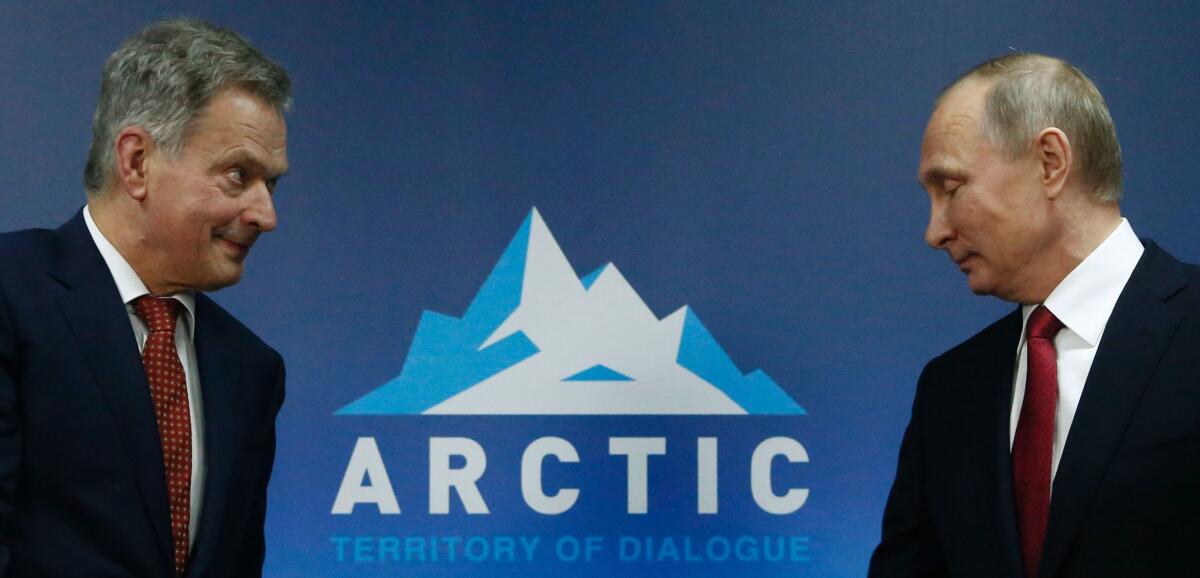
Calling the accusations “lies,” Russian President Vladimir Putin on Thursday denied that Moscow meddled in last year’s U.S. elections.
“Read my lips, no,” Putin said during a panel moderated by CNBC, according to a report on the news agency’s website.
“All those things are fictional, illusory and provocations, lies,” the Russian president said. “All these are used for domestic American political agendas. The anti-Russian card is played by different political forces inside the United States to trade on that and consolidate their positions inside.
Putin’s comments came as the Senate Intelligence Committee was set to begin a hearing entitled “Disinformation: A Primer in Russian Active Measures and Influence Campaigns,” which will focus on understanding the method of Russia’s active disinformation campaign and assess the extent of Moscow’s interference.
FBI Director James Comey confirmed earlier this month that his agency was investigating Russia’s intrusion into the 2016 poll and whether there was any collusion between Moscow and President Trump’s campaign.
- Share via
Trump levels extraordinary threat against GOP conservatives; Ryan says he understands president’s frustration
House Speaker Paul D. Ryan commiserated with President Trump Thursday after the president launched a Twitter assault on the group of rebellious Republicans known as the Freedom Caucus.
“I understand the frustration, I share the frustration,” Ryan told reporters Thursday, when asked to respond to Trump’s threat to campaign against fellow Republicans.
Freedom Caucus members, who back limited government and have defined themselves in opposition to the Washington establishment, have been a major headache for GOP leaders. Ever since the Republicans took control of the House in 2010, conservative refusal to back key bills to fund government agencies has forced GOP leaders to negotiate with Democrats for the votes they need.
Freedom Caucus members helped lead the charge against former Speaker John A. Boehner (R-Ohio).
The caucus was blamed by many Republicans last week for torpedoing the leadership’s plan, backed by Trump, to make significant changes to Obamacare.
Still, Trump’s threat to “fight them” in the 2018 elections was an extraordinary step. Trump had previously made electoral threats against wayward members of his party, but Thursday’s tweet was especially direct, threatening to treat them the same way as Democrats.
Freedom Caucus members have begun pushing back aggressively. A spokeswoman for the group argued on Twitter that Trump did not have his facts right and that Republican moderates were equally responsible for sinking the healthcare bill.
Finding Trump supporters to challenge Republicans in a primary would be hard and could further thrust the GOP into civil war.
Trump, despite low poll numbers nationally, remains popular in core Republican districts. Many members of Congress, however, ran ahead of him in their districts in the last election.
The president has also suggested he might be open to cutting deals with Democrats, something the White House has discussed but not followed through on. That would also be difficult, given the rancor on the left.
Ryan said Thursday that the best path is for Republicans to come together on healthcare and other issues
“About 90% of our conference is for this bill to repeal and replace Obamcare, and about 10% are not. And that’s not enough to pass a bill,” he said.
“What I am encouraging our members to do is to keep talking with each other until we can get the consensus to pass this bill. But it’s very understandable that the president is frustrated that we haven’t gotten to where we need to go, because this is something that we all said we would do.”
- Share via
Pence casts tie-breaking vote to advance bill that would let states withhold federal funds from Planned Parenthood
Republicans needed Vice President Mike Pence to cast a tie-breaking vote Thursday in the Senate to advance legislation that rolls back rules preventing states from withholding certain federal funds to Planned Parenthood and other abortion providers.
With opposition from two Republican women, Sens. Susan Collins of Maine and Lisa Murkowski of Alaska, Republicans did not have enough votes with their slim 52-seat majority to advance the bill.
Pence, a longtime opponent of abortion, arrived to cast the vote breaking the 50-50 tie — and will be expected to do so later Thursday on final passage.
“We just saw a historic moment,” said Sen. Patty Murray (D-Wash.) “It is a sad day for the United States Senate.”
The measure rolls back a regulation finalized at the end of President Obama’s administration that explicitly prevented states from denying federal Title X family planning funds to clinics, like Planned Parenthood, that also provide abortion services.
Under longstanding practice, no federal funds can be used for abortions, but federal family planning money can flow to the clinics to provide other healthcare services.
Some Republican-led state governments had been moving in recent years to choke off Title X funds from any clinics that offered abortion service. The Obama rule sought to prohibit such practices.
The bill Thursday, sponsored by Sen. Joni Ernst (R-Iowa), has already cleared the House.
It is part of a series of bills being passed by Congress under the so-called Congressional Review Act, which allows federal regulations put in place during the final days of the previous administration to be undone by simple majority passage.
Passage by the Senate later Thursday would send it to the White House for President Trump’s signature.
- Share via
Senate committee narrowly approves Acosta’s nomination to be Labor secretary
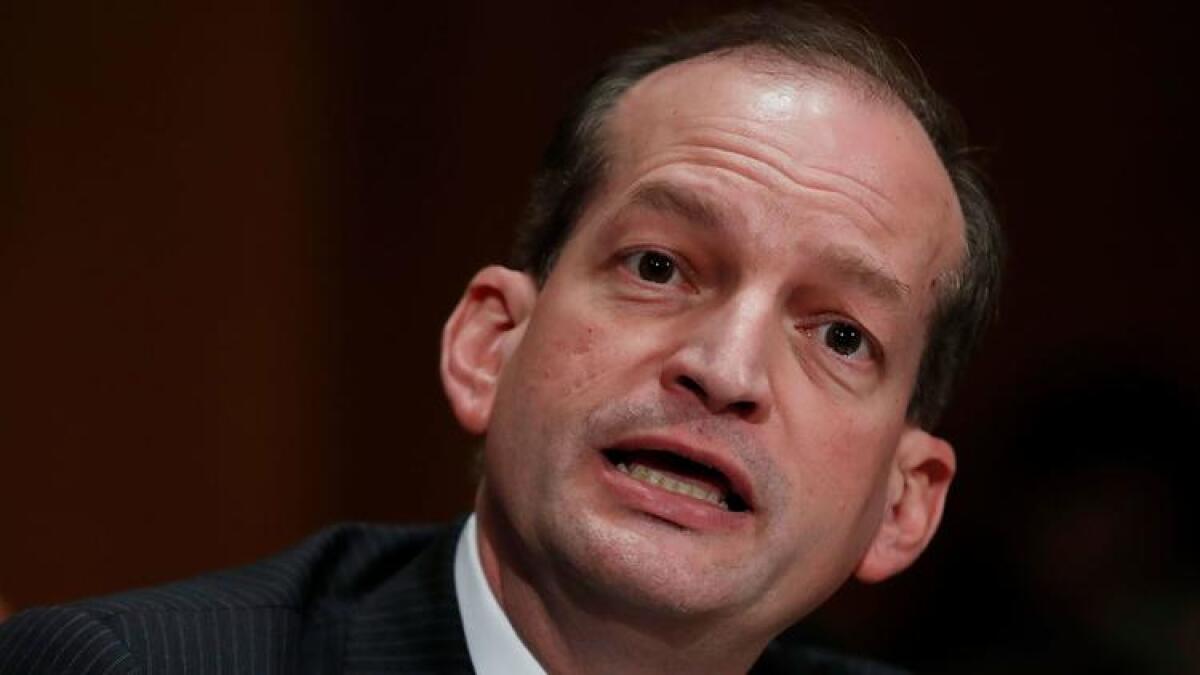
A Senate committee on Thursday narrowly approved R. Alexander Acosta to be Labor secretary, moving to fill one of President Trump’s few remaining vacant Cabinet posts.
The nomination of Acosta, a law school dean and former Justice Department official, was approved by a 12-11 vote by the Senate Health, Education, Labor and Pensions Committee. All of the panel’s Republicans supported the nomination; all of the Democrats were opposed.
If confirmed in a full Senate vote, which is expected soon, Acosta will be the only Latino in Trump’s Cabinet. A date for the final vote hasn’t been set.
- Share via
Follow the money and the trail of ‘dead Russians,’ expert urges senators
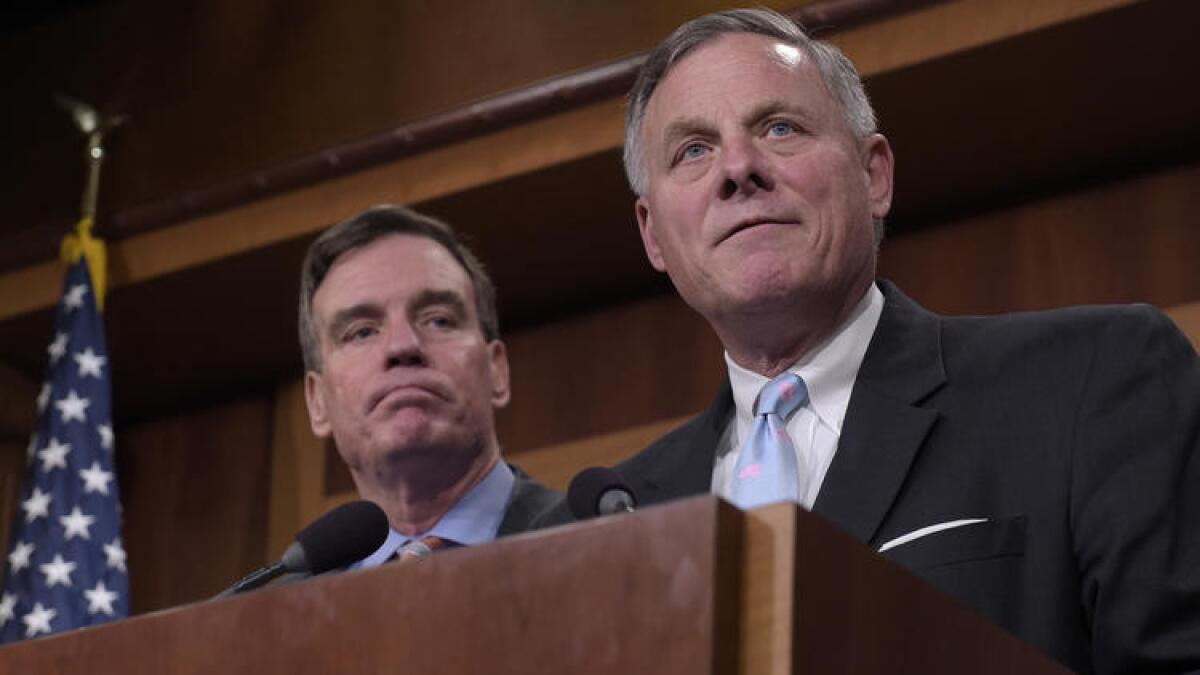
The Senate Intelligence Committee hearing Thursday into Russian efforts to influence the November elections has been a long history lesson, tracing Moscow’s decades-long efforts to use misinformation to undermine democracies.
But Clinton Watts, of the Center for Cyber and Homeland Security at George Washington University, provided a roadmap to better understanding the Kremlin’s efforts. He urged senators and the U.S. government to follow the money to figure out how misinformation websites and social media outlets are being funded.
While the Russians conducted their hacking in the Internet’s shadows, their efforts to influence the election was hardly a secret, he said.
“You can hack stuff and be covert, but you can’t influence and be covert,” he said. “You have to ultimately show your hand. And that’s why we have been able to discover it online.”
The second way to trace Russian influence was more ominous: “Follow the trail of dead Russians,” he said.
“There have been more dead Russians in the past three months that are tied to this investigation,” he added. “They are dropping dead, even in Western countries.”
Watts didn’t finish the thought but was likely referring to a spate of deaths of high-profile Russians, some of which appeared to be assassinations although others appear to have been from natural causes.
With the daytime execution of a Russian politician in Ukraine last week, at least eight Russian politicians, activists, ambassadors and a former intelligence official have died since the U.S. election.
- Share via
Russia has stepped up efforts to influence elections, experts tell Senate panel

Moscow has stepped up its interference in U.S. and European elections, using social media, hacking and other tools to undermine public confidence and to raise doubts about the U.S as an ally, Russia experts told the Senate Intelligence Committee on Thursday.
The committee was taking testimony from experts in Russian propaganda and intelligence operations as part of its investigation into Moscow’s meddling in the 2016 election.
Sen. Mark Warner (D-Va.), the top Democrat on the panel, emphasized that in addition to examining the broad topic of Russian efforts to influence the election, the panel also must seek to answer whether President Trump’s campaign had contact with Russian officials last year, noting the the FBI has opened its own probe.
“I will not prejudge the outcome of our investigation. We are seeking to determine if there is an actual fire, but there is clearly a lot of smoke,” Warner said.
Dr. Eugene Rumer, Director of the Russia and Eurasia Program at the Carnegie Endowment for International Peace, told the panel that Russian President Vladimir Putin probably viewed Moscow’s meddling in the U.S. election as an “unqualified success.”
- Share via
Trump levels extraordinary threat to ‘fight’ GOP right wing in 2018 elections
President Trump lobbed an electoral threat against hard right members of his party Thursday, saying on Twitter that he would fight them in the 2018 election if they did not “get on the team.”
The Freedom Caucus salvo came less than a week after the group of about 30 Republican House members was blamed for derailing the GOP healthcare bill, despite efforts from Trump to negotiate with them.
Trump had previously made electoral threats to wayward members of his party, but Thursday’s tweet was especially direct, threatening to cast them in the same light as Democrats.
Rep. Justin Amash, a Michigan Republican in the caucus, was not happy. “No shame,” he wrote in a rebuttal.
Like Trump, Freedom Caucus members consider themselves anti-establishment, and many were strong supporters during the election. But they are more ideologically focused on smaller government and have a history of bucking party leadership. Thursday’s tweet was the second time Trump accused them of helping Democrats.
Here’s a detailed look at Trump’s relationship with the caucus.
The Freedom Caucus roars back to relevance to challenge Trump’s agenda and strategy >>
- Share via
Tillerson meets Turkish officials to seek support for battle against Islamic State in Syria
Secretary of State Rex Tillerson on Thursday met for more than two hours with Turkey’s president, Recep Tayyip Erdogan, as they hoped to shore up troubled relations between their nations.
Making his first trip to Turkey, Tillerson became the highest-ranking Trump administration official to hold a face-to-face session with Erdogan, an increasingly authoritarian leader who is also a NATO member and key ally in the fight against Islamic State in Syria.
The meeting went longer than planned. Turkey and the United States disagree sharply on how to combat Islamic State: Washington supports Kurdish militias that Erdogan regards as an arm of the Kurdistan Workers’ Party (PKK), which Turkey and the U.S. consider a terrorist organization.
“Trying to fight against Daesh through terrorist organizations such as ... extensions of the PKK, would be like shooting yourself in the foot,” Erdogan’s senior advisor, Ibrahim Kalin, said ahead of Thursday’s meeting. Daesh is a pejorative Arabic acronym for Islamic State.
- Share via
Hawaii judge extends national halt on Trump’s travel ban
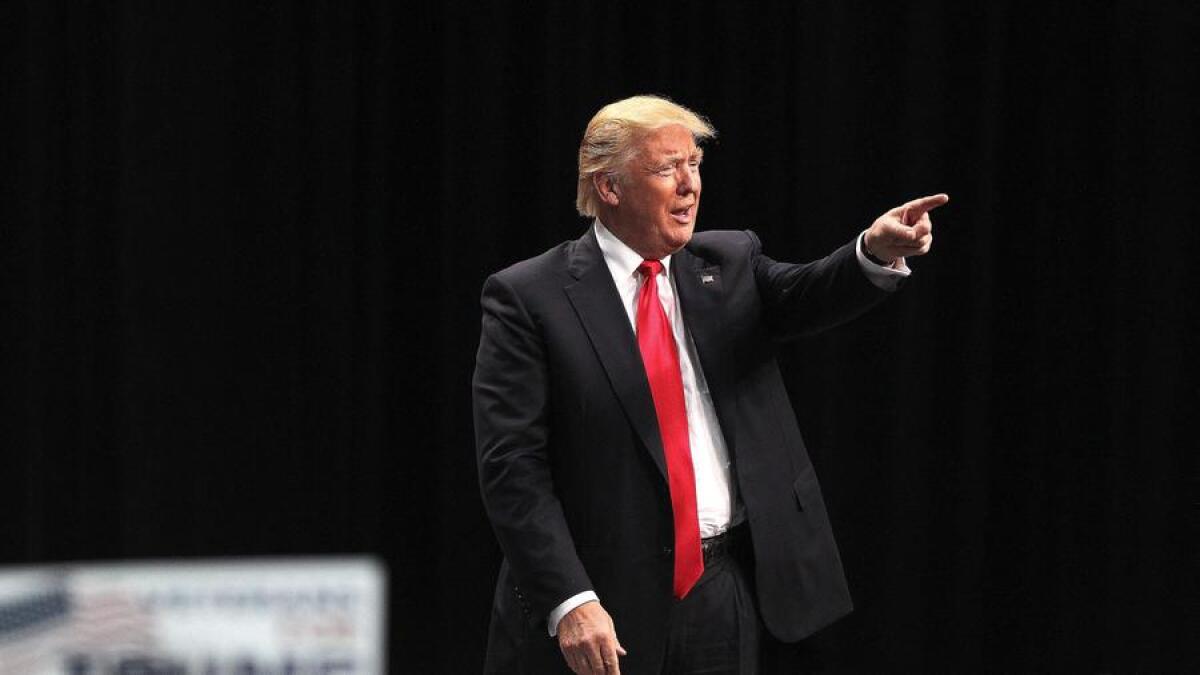
The Hawaii federal judge who brought President Trump’s revised travel ban to a national halt this month extended his order blocking the ban’s enforcement.
The move Wednesday sets the stage for the Justice Department to appeal to the U.S. 9th Circuit Court of Appeals to reverse the ruling.
U.S. District Judge Derrick Watson’s original order halting the travel ban was issued March 15, a day before the ban was to go into effect, in the form of a temporary restraining order.
At a hearing in Honolulu on Wednesday, federal lawyers asked Watson to either dismiss that order or narrow the restrictions to apply to fewer parts of the travel ban.
Instead, Watson said he would turn the order into a preliminary injunction, which has the effect of extending his order blocking the travel ban for a longer period.
Watson said he would keep intact the restrictions on the travel ban -- a block of its 90-day moratorium on travel to the U.S. from nationals of six majority-Muslim countries and its 120-day pause on new refugee resettlement.
If the Justice Department appeals the case, it will be heard in the same court that upheld a national halt to Trump’s first travel ban last month after a Seattle federal judge ruled against it.
The administration has already appealed to the U.S. 4th Circuit Court of Appeals a Maryland judge’s more limited March 16 ruling that stopped enforcement of the travel order’s country-specific ban.
Both the Hawaii and Maryland judges found Trump’s executive order to discriminate against Muslims. They used the president’s campaign statements promising to suspend Muslim travel to the U.S. as evidence of the order’s anti-Muslim bias.
Government lawyers have argued that the president is not singling out Muslims but instead acting within his power to restrict immigration and safeguard national security while better vetting procedures are developed to prevent potential terrorists from entering the U.S.
Trump has said he’ll take the case over the travel ban to the U.S. Supreme Court.
- Share via
Ivanka Trump gets formal White House role, with ethics obligations but no pay
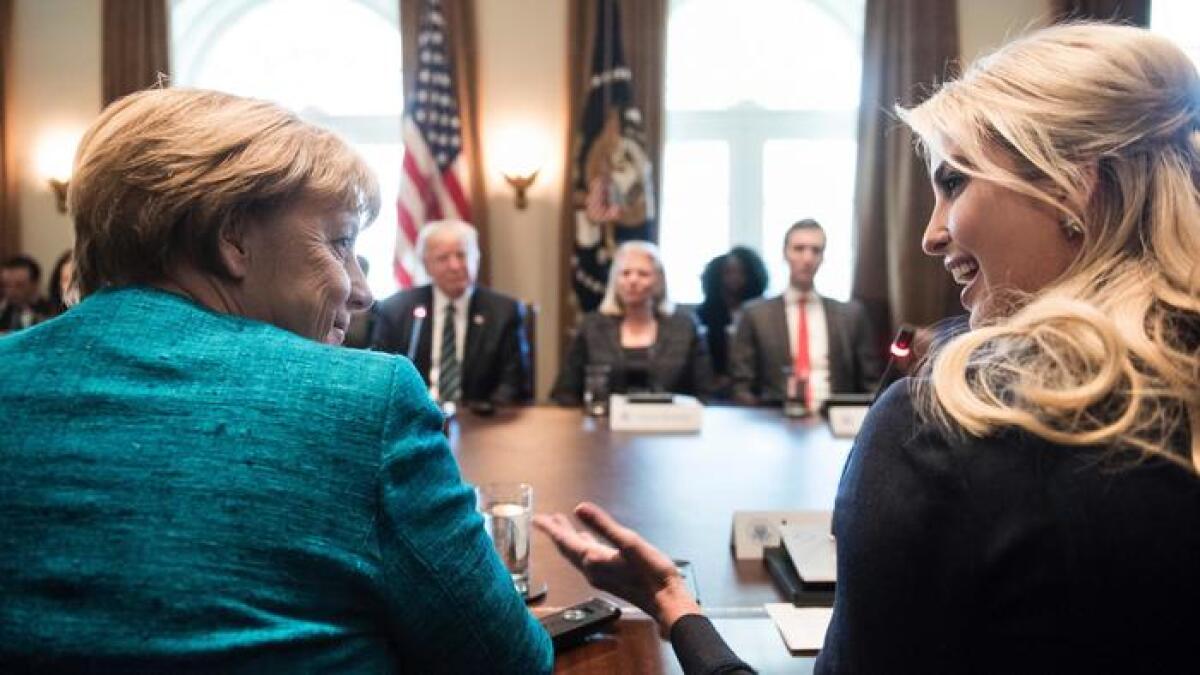
Ivanka Trump is taking on a more formal White House role — with a title but not a paycheck — a move intended to quell ethics concerns raised about her status in her father’s administration.
In a statement, the White House noted that the president’s elder daughter already had an “unprecedented role” in the administration different from that of previous presidential children.
She now will take the title of special advisor to the president, and therefore assume the same responsibility to abide by ethics standards that other federal employees have, the statement said. The decision demonstrates the administration’s “commitment to ethics, transparency and compliance,” the administration said.
Although Ivanka Trump already had a West Wing office — as does her husband, senior advisor Jared Kushner — she now will have “increased opportunities to lead initiatives driving real policy benefits for the American public that would not have been available to her previously,” a White House spokesman said.
The announcement came on a day when President Trump sought to promote his administration’s commitment to empowering women. He delivered remarks at an East Room event that included other top women in his Cabinet, including U.N. Ambassador Nikki Haley and Small Business Administration head Linda McMahon.
Ivanka Trump held a roundtable with female business owners earlier, Press Secretary Sean Spicer said.
Earlier Wednesday, leading Senate Democrats sent a letter to the Office of Government Ethics raising concerns about the “increasing, albeit unspecified” position Ivanka Trump had held and the potential conflicts of interest that her government position might trigger with her personal businesses, including a retail clothing brand.
The letter from Sens. Elizabeth Warren (D-Mass.) and Tom Carper (D-Del.) asked the agency whether Trump would be required to divest herself of personal assets or if she could be required to recuse herself from certain functions.
Trump’s new position was first reported by the New York Times. In a statement to the paper, Trump said she was acting in response to ethics concerns, but noted she already had been voluntarily complying with “all ethics rules.”
- Share via
Russia inquiry ‘one of the biggest’ congressional probes in decade, senators say
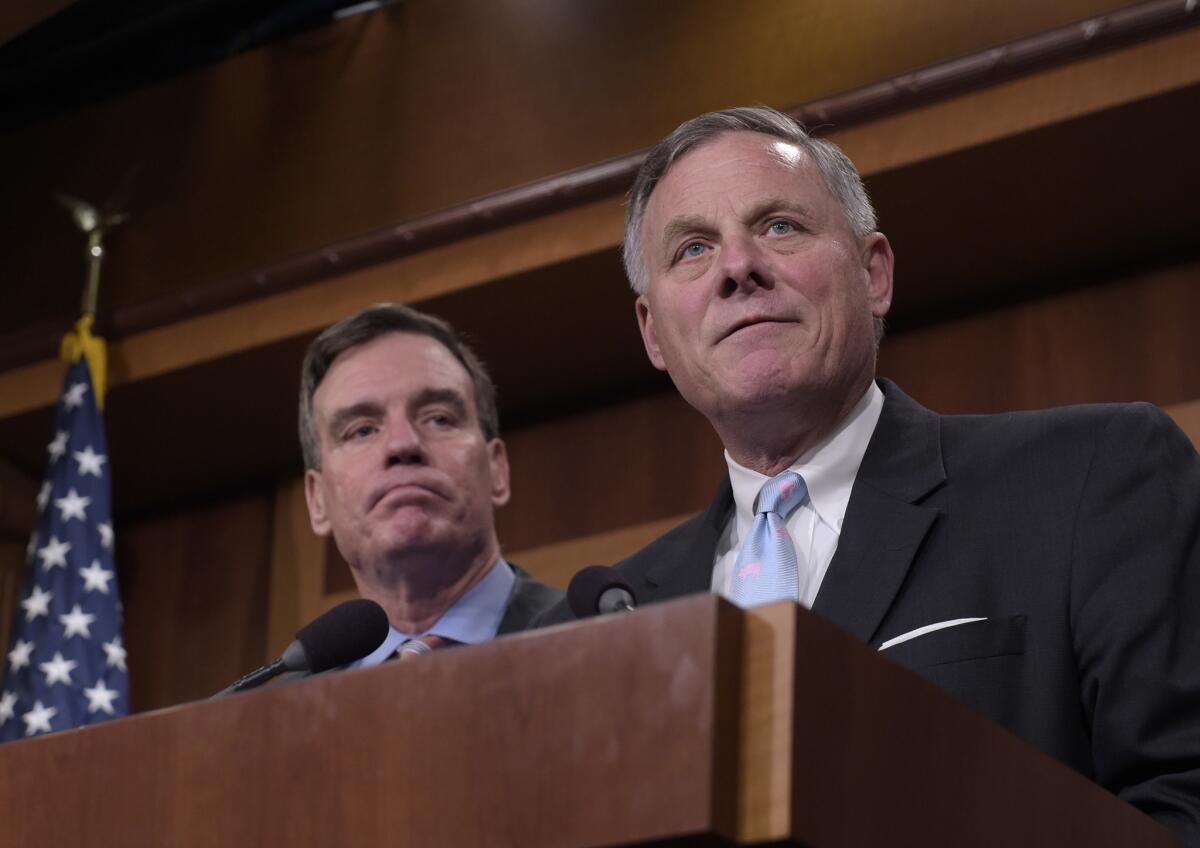
The Senate Intelligence Committee’s probe into Russian involvement in the 2016 U.S. presidential election will be “one of the biggest investigations” in years and has already involved an “unprecedented” level of cooperation between Congress and U.S. spy agencies, the panel’s chairman said Wednesday.
At a Capitol Hill news conference, the committee chairman, Sen. Richard Burr of North Carolina, and its ranking Democrat, Sen. Mark Warner of Virginia, emphasized the bipartisan nature of the panel’s efforts, drawing a determined, though unstated, contrast with the partisan dysfunction of a parallel investigation in the House.
“The committee will go wherever the intelligence leads us,” Burr said.
And he pointedly refused to endorse White House statements that investigators inevitably will find that there was no collusion between President Trump’s campaign and the Russians.
“It would be crazy to try to draw any conclusions” at this point, Burr said. “We know that our challenge is to answer that question to the American people,” Burr said, referring to the issue of Trump’s involvement.
Warner said he had “confidence in Richard Burr” to run a fair investigation and produce a bipartisan conclusion.
Warner said Americans should “not lose sight of what the investigation is about: An outside foreign adversary effectively tried to hijack” the election and “favor one candidate over the other.”
“They didn’t do it because it was in the best interest of the American people,” he said. “[Russian President] Vladimir Putin’s goal is a weaker United States.”
The Russian action “should be a concern of all Americans regardless of party affiliation,” he added.
The committee staff already has reviewed thousands of pages of intelligence documents and has begun scheduling interviews with a list of 20 preliminary witnesses, who will be questioned in private before the panel holds public hearings, Burr said.
He strongly implied that one of the potential witnesses is retired Gen. Michael Flynn, who was fired from his post as national security advisor to Trump after the disclosure that he had misled Vice President Mike Pence and others about his contacts with Russia’s ambassador to the U.S.
“You would think less of us” if the committee had not talked with Flynn, Burr told reporters.
The witnesses, including Jared Kushner, the president’s son-in-law and advisor, will be questioned when the committee is ready, he said.
- Share via
Justice Department watchdog finds DEA cash seizure program may pose risk to civil liberties

The way the Drug Enforcement Administration seizes cash and other assets may pose a risk to civil liberties, the Justice Department’s internal watchdog reported Wednesday.
The Justice Department’s inspector general also determined that the agency does not measure or track how its asset seizure activities advance criminal investigations.
Over the last decade, more than $28 billion has been seized through the department’s asset forfeiture program.
The effort and others in states have generated intense controversy in recent years, with critics contending that many seizures are unfair because some who lose their assets are never charged with crimes.
Law enforcement officials, however, say that seizing property and cash is a key tool in disrupting criminal organizations and compensating the victims of crimes.
Former Atty. Gen. Eric Holder in 2015 limited how state and local authorities can obtain seized funds by working with federal agents.
In its report released Wednesday, the inspector general examined 100 cases in which the DEA seized cash. Eighty-five of the cases involved interdiction at transportation hubs, such as airports or parcel centers. Nearly 80 of those seizures resulted from the direct observation of agents or local police. The inspector general and the Justice Department have raised concerns in the past about such stops and searches, in part, due to the potential for racial profiling.
Of the 100 cases, the DEA could verify that only 44 advanced ongoing investigations, led to a new investigation, or resulted in an arrest or prosecution, the inspector general found.
“When seizure and administrative forfeitures do not ultimately advance an investigation or prosecution, law enforcement creates the appearance, and risks the reality, that it is more interested in seizing and forfeiting cash than advancing an investigation or prosecution,” the report said.
The inspector general also found that the Justice Department does not provide enough training or require state and local officers working on federal task forces to be trained on asset forfeiture policies.
The Justice Department responded in a letter to the inspector general that its analysis was flawed and its sample “significantly underreported” the amount of seized funds that are ultimately returned.
In a statement, Justice Department spokeswoman Sarah Isgur Flores said, “Asset forfeiture is a powerful and effective law enforcement tool, allowing the department to compensate victims, deprive criminals of the proceeds of their crimes, remove the tools of crime from criminal organizations, and deter crime.”
“The department believes that the ongoing public debate about asset forfeiture is healthy,” she added, “but as outlined in our formal response, we strongly disagree with large swaths of this report and its flawed methodology that failed to address the essential role asset forfeiture plays combating some of the most sophisticated criminal actors and organizations, including terrorist financiers, cyber criminals, fraudsters, human traffickers, and drug cartels.”
9:23 a.m.: This story was updated with Justice Department comment.
- Share via
Hoax. Con job. Chinese plot. Trump tweets have bashed climate science for years
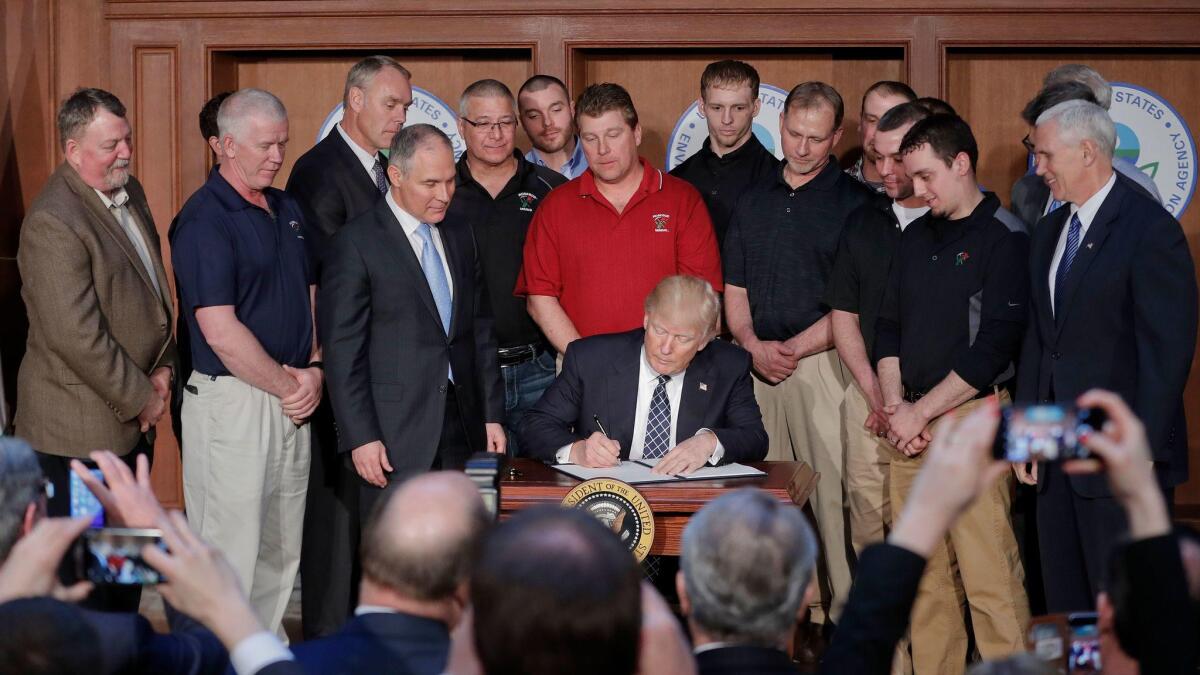
As President Trump moved to halt federal efforts against global warming on Tuesday, he avoided an important phrase: climate change.
It was the same story during his campaign for president; Trump rarely mentioned it.
When he pledged in May to withdraw the United States from the Paris treaty, a pact among nearly every nation on Earth to reduce the carbon emissions that cause global warming, it was one of the few occasions when Trump broached the topic.
Trump’s muted approach made political sense. To reject science is to risk alienating millions of moderate voters who support action to stop global warming.
But before Trump started running for president, he often bluntly attacked climate science. Some highlights from his Twitter feed:
- Share via
Supreme Court rules in favor of merchants who want to advertise credit card fees
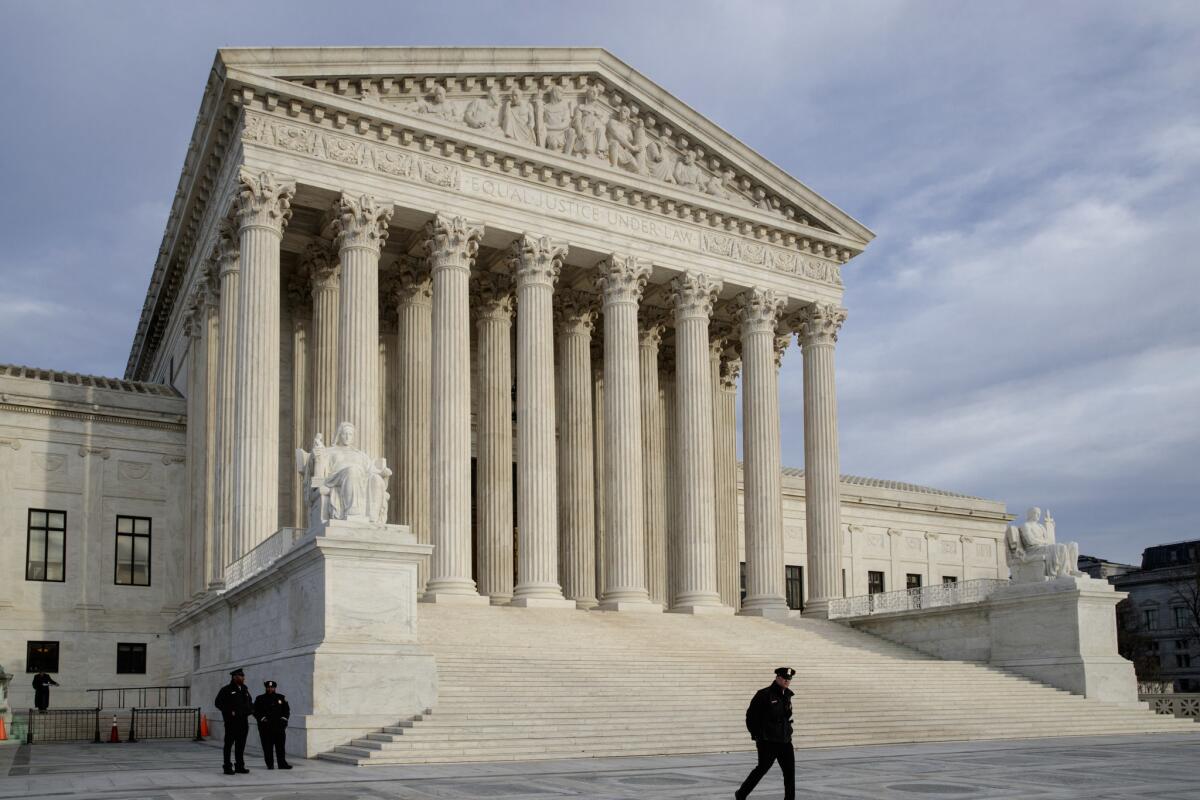
Merchants may soon have the right to tell customers that they will pay a surcharge if they use a credit card rather than pay with cash.
The Supreme Court cast doubt Wednesday on laws in California, New York, Florida and seven other states that make it illegal for sellers to “impose a surcharge” on credit card sales.
In a 8-0 decision, the justices said these laws “regulate speech” and may be challenged as violations of the 1st Amendment.
Chief Justice John G. Roberts Jr. said these laws do not prevent merchants from offering a discount for those who pay cash. Rather, they simply forbid disclosing that a posted price includes a surcharge of 2% to 3% for using a credit or debit card.
“Merchants want to pass the fees along only to their customers who choose to use credit cards,” he said. “They also want to make clear that they are not the bad guys -- that the credit card companies, not the merchants, are responsible for the higher prices.”
But the ruling Wednesday was only a partial victory for the five New York businesses, including a hair salon and an ice cream parlor in Brooklyn, that sued to challenge the ban on advertising or disclosing “surcharges” for using credit cards.
The U.S. 2nd Circuit Court of Appeals in New York had upheld the law on the grounds it was a price regulation, not a speech restriction.
Roberts and the high court disagreed. “What the law does is regulate how sellers may communicate their prices,” he said. “A merchant who wants to charge $10 for cash and $10.30 for credit may not convey that price any way he pleases. He is not free to say ‘$10, with a 3% credit card surcharge.’”
But the justices did not strike down the state laws, instead sending the case back to the New York court to decide whether this “speech regulation” could be justified. Sometimes, laws are used to regulate the words of commercial transactions to prevent buyers from being fooled or confused.
Until recently, the major credit card companies had imposed contract restrictions that prevented merchants from disclosing surcharges. But those provisions have challenged and knocked down.
That in turn led to new legal challenges against the state laws which forbid sellers from disclosing these surcharges.
The case decided Wednesday was Expressions Hair Design vs. Schneiderman.
- Share via
Trump’s poll numbers are low. But the people who put him in office say it’s not time to judge him — yet
It’s been five months since the euphoria of a Donald Trump rally at the local arena brought optimism to this former Democratic stronghold. The snow from a long winter has begun melting into the rocky soil, and the digital sign in a torn-up parking lot blinks hopefully: “Warm days are coming.”
President Trump has yet to deliver jobs or the repeal of Obamacare. But here, in an area crucial to his unexpected election victory, many residents are more frustrated with what they see as obstruction and a rush to judgment than they are with Trump.
Give him six months to prove himself, said an information technology supervisor. Give him a year, said a service manager. Give him four years, said a retired print shop owner.
“Give the man a chance,” said Crystal Matthews, a 59-year-old hospital employee. “They’re just going to fight him tooth and nail, the whole way.”
- Share via
To fight woman’s defamation claim, Trump cites the Bill Clinton-Paula Jones case – which the president lost
President Trump is citing Bill Clinton’s famous sexual harassment battle in his effort to block a California woman’s lawsuit claiming Trump lied about groping her in the Beverly Hills Hotel in 2007.
Problem is, Clinton lost that bid for legal immunity when the Supreme Court ruled unanimously in 1997 that the chief executive is not shielded from responding to a civil suit regarding his private behavior.
- Share via
House sends Trump bill to kill landmark broadband privacy regulations
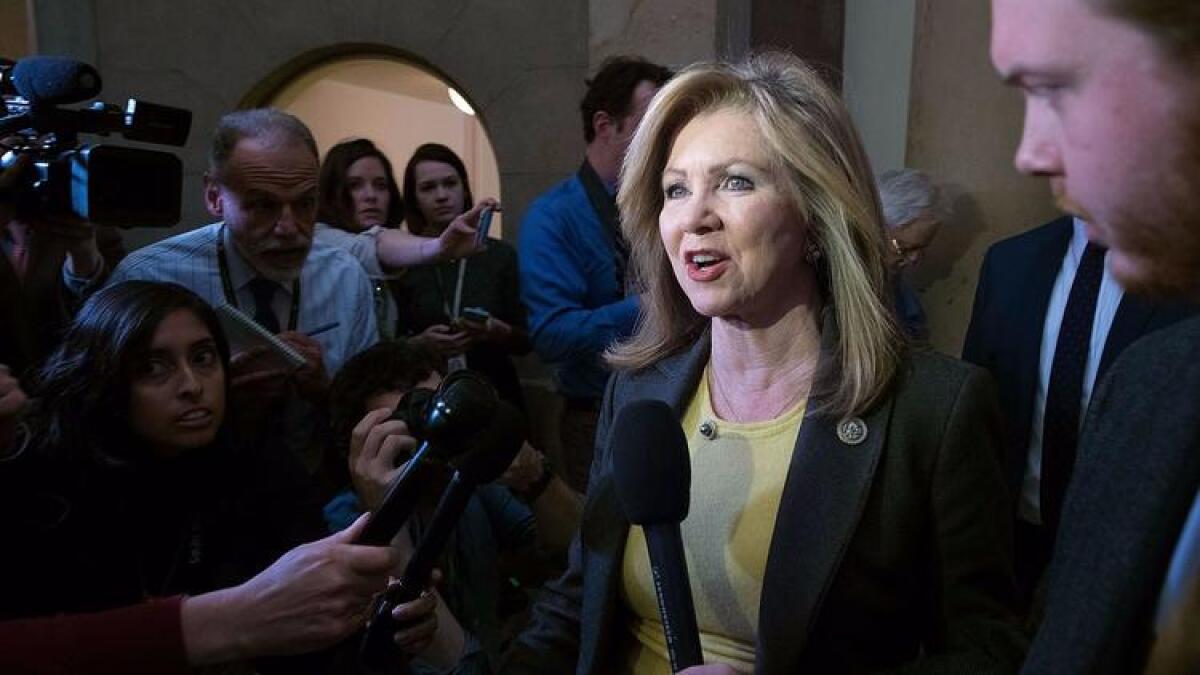
The House voted Tuesday to kill landmark privacy restrictions for Internet service providers and sent the bill to the White House, which indicated President Trump would sign it and invalidate the rules before they go into effect.
The measure, approved largely along party lines, repeals tough new Federal Communications Commission regulations that would require broadband companies to get explicit customer permission before using or sharing most of their personal information.
The data include health information, website browsing history, app usage and the geographic information from mobile devices. The rules also tighten data security requirements.
Republicans, along with AT&T Inc., Charter Communications Inc., Comcast Corp. and other providers of high-speed Internet service, strongly opposed the rules. They argued that the restrictions are tougher than those for websites and social networks that also collect and use the highly valuable consumer data, which companies use to target advertising.
- Share via
U.S. commander says there’s a ‘fair chance’ that coalition airstrike is responsible for civilian casualties in Mosul

The top U.S. general commanding the fight against Islamic State in Iraq and Syria said that the U.S.-led coalition was probably responsible for a blast that killed more than 200 people.
“If we did it, and I would say there’s at least a fair chance that we did, it was an unintentional accident of war and we will transparently report it to you,” Lt. Gen. Stephen Townsend told reporters Tuesday via teleconference from Baghdad.
He made the comments in response to witness reports that an airstrike by the U.S.-led coalition leveled a large apartment block and killed scores of civilians, including women and children, in west Mosul’s Jadidah neighborhood on March 17.
“My initial assessment is that we probably had a role in these casualties,” Townsend said.
But investigators are still trying to determine whether other factors -- possibly including repeated airstrikes in the neighborhood or an explosive device accidentally or deliberately planted near the building -- could have led to its collapse.
“The fact that the whole building collapsed contradicts our involvement,” Townsend said. “The munition that we used should not have collapsed an entire building. So that’s one of those things we’re trying to figure out in the investigative process.”
- Share via
Gov. Jerry Brown calls Trump energy plan a ‘colossal mistake’ that will galvanize climate change activists
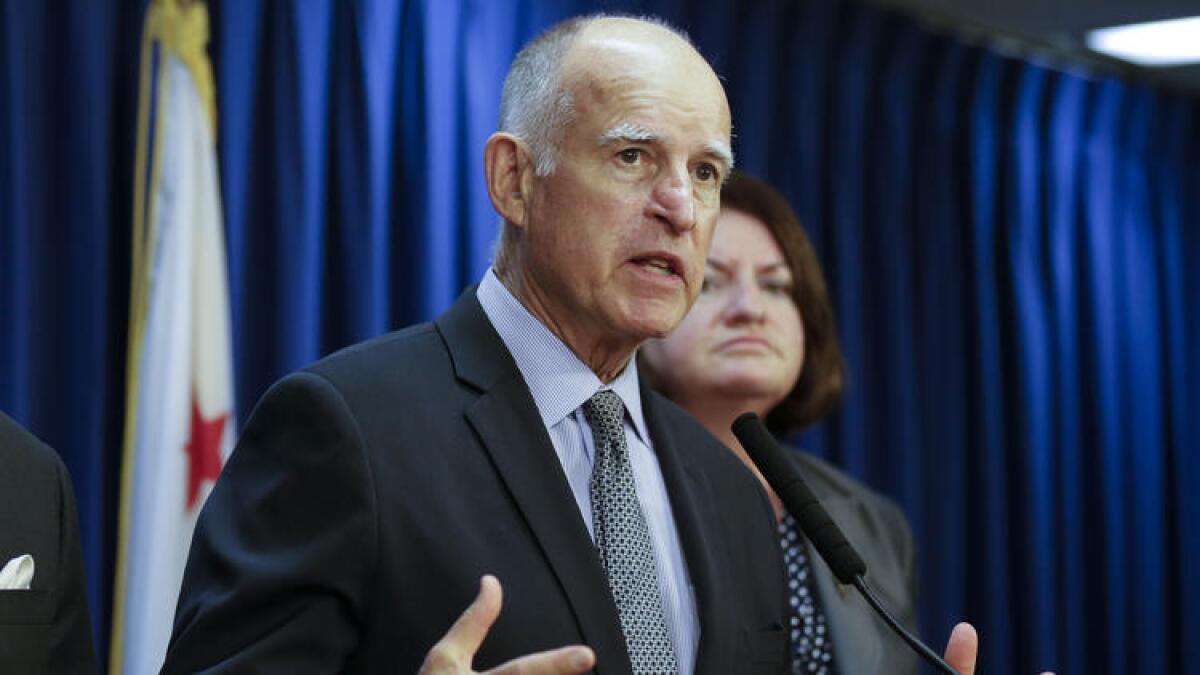
California Gov. Jerry Brown warned that President Trump has just made a “colossal mistake” in gutting the federal government’s effort to combat climate change, which will ignite a response Trump is unprepared to handle.
“It defies science itself,” Brown said in a call to The Times shortly after Trump signed an executive order that aims to bring an abrupt halt to the United States’ leadership on global warming. “Erasing climate change may take place in Donald Trump‘s mind, but nowhere else.”
“Yes, there is going to be a counter-movement,” Brown vowed, predicting Trump’s actions will mobilize environmentalists in a way President Obama never could. “I have met with many heads of state, ambassadors. This is a growing movement. President Trump’s outrageous move will galvanize the contrary force. Things have been a bit tepid [in climate activism]. But this conflict, this sharpening of the contradiction, will energize those who believe climate change is an existential threat.”
Brown and other big-state governors and mayors are moving swiftly to fill the global leadership vacuum Trump created with Tuesday’s directive, which stops short of officially pulling the U.S. out of the Paris climate accord of 2015.
“I see Washington declining in influence, but the momentum being maintained by California and other states aligned with China and those who are willing to do something,” said Brown, who will be traveling to China soon for meetings on climate. “There is a growing activism on the part of millions of people who will not stand by and let Donald Trump effectively tear up the Paris agreement and destroy America’s climate leadership and jeopardize the health and well being of so many people.”
In the face of Trump’s retreat on climate, Brown said California will step up its own efforts to push others toward clean energy. “We are not fully meeting the challenge of climate change yet,” he said. “We are doubling down on our commitment. We are reaching out to other states in America and throughout the world and other countries …. We have plenty of fuel to build this movement.”
“This is real,” Brown said of the threat created by climate change. “The nations of the world have recognized it in Paris … I will continue doing my best to work with and rouse the world community, whatever the politicians in Washington do or don’t do.”
- Share via
Trump orders government to dismantle Obama’s climate change policies

President Trump ordered an abrupt halt to America’s crusade against climate change. (March 29, 2017) (Sign up for our free video newsletter here http://bit.ly/2n6VKPR)
President Trump on Tuesday ordered the federal government to retreat from the battle against climate change launched by President Obama, issuing a directive aimed at dismantling the core policies that have made the U.S. a global leader in curbing emissions.
The plan unveiled by Trump reflects an about-face for the U.S. on energy, and it puts into jeopardy the nation’s ability to meet the obligations it agreed to under the global warming pact signed in Paris with 194 other nations. It would shelve the landmark Clean Power Plan that mandates electricity companies reduce their emissions. It seeks to dislodge consideration of climate throughout the federal government, where it has been a factor in every relevant decision in recent years.
“My administration is putting an end to the war on coal,” Trump said. “I am taking historic steps to lift the restrictions on American energy to reverse government intrusions and to cancel job killing regulations.”
Under the order, the government will abandon the “social cost of carbon” that regulators had painstakingly calculated and begun factoring into their decision on permit applications and rulemaking. Restrictions on methane releases at oil and gas drilling facilities would be eased.
Agencies will also stop contemplating climate impacts as they launch into new projects, and restrictions on coal leasing and fracking on federal lands will be lifted.
The directive, for which progressive states and environmentalists have been preparing for months, is certain to set off years of litigation and conflicts between Washington and state capitols.
Some of the most far-reaching policies Trump is seeking to bring to a halt cannot be canceled unilaterally and require lengthy administrative proceedings. But others he can end with the stroke of his pen.

- Share via
A trade war is brewing inside the White House between rival camps
Soon after President Trump took office, an executive order was quietly drafted to suspend talks with China on an obscure but potentially far-reaching treaty about bilateral investment.
After eight years and two dozen rounds of negotiations, the treaty terms were almost in final form. Pulling out after so much time and effort would send a clear message that the Trump administration meant to take a new and tougher approach to China.
But the executive order never even got to the president’s desk. It was quietly shelved, according to sources inside and outside the White House, at the behest of former Goldman Sachs President Gary Cohn, now Trump’s top economic advisor.
Killing the order was a small victory for a White House faction that supports free trade and the global economy. But it was only an opening skirmish in what promises to be a long and bitter struggle over trade policy that so far is being waged behind the scenes in the Trump administration.
- Share via
Supreme Court reverses death sentence for Texas inmate who could not tell time or name the days of the week
The Supreme Court set aside a death sentence on Tuesday for a Texas inmate who as a 13-year-old could not tell time or name the days of the week, concluding he should not be executed in light of his mental disability.
In a 5-3 decision, the justices reversed the Texas state appeals court that had restored a death sentence given to Bobby James Moore, a 57-year old prisoner who shot and killed a store clerk in a botched robbery in 1980.
At issue was whether Moore had a mental disability that would make his execution “cruel and unusual punishment” under the 8th Amendment. The justices banned states from executing prisoners with a mental disability, but they left states some flexibility to set the standards.
But three years ago, the justices faulted Florida authorities for relying almost entirely on I.Q. scores.
In the Texas case decided Tuesday, the justices said state judges had ignored ample evidence that Moore had severe mental disability as a child. That evidence was not overcome by the fact that he had adapted well in prison, they said.
“At 13, Moore lacked the basic understanding of the days of the week, the months of the year and the seasons; he could scarcely tell time or comprehend the standards of measure,” said Justice Ruth Bader Ginsburg. “After failing every subject in the ninth grade, Moore dropped out of high school. Cast out of his home, he survived on the streets, eating from trash cans, even after two bouts of food poisoning.”
After fatally shooting the clerk in the 1980 robbery, he was sentenced to death.
The Texas courts reexamined his sentence after the high court abolished capital punishment in 2002 for defendants with a mental disability. A state judge listened to experts and set aside Moore’s death sentence, But the state’s criminal appeals court disagreed. Its judges said Moore had demonstrated “adaptive strength” by living on the streets and carrying out a robbery, and therefore did not qualify as having a severe mental impairment.
Ginsburg said the state judges had relied on an outdated understanding of mental disability, and her opinion in Moore vs. Texas said the state court must reconsidere its decision. Justices Anthony M. Kennedy, Stephen G. Breyer, Sonia Sotomayor and Elena Kagan agreed.
Chief Justice John G. Roberts Jr. dissented. While he agreed the state’s authorities may have used outdated standards, Moore had I.Q. scores ranging from 69 to 79 that show he did not have the “significantly sub-average intellectual functioning” that would exempt him from the death penalty. Justices Clarence Thomas and Samuel A. Alito agreed.
- Share via
The Freedom Caucus roars back to relevance to challenge Trump’s agenda and strategy
When House Speaker Paul D. Ryan pulled the plug on the GOP’s Obamacare overhaul, lawmakers spilled out of the Capitol basement, angry, frustrated and stunned.
But Rep. Mark Meadows (R-N.C.), leader of the conservative and rebellious House Freedom Caucus that led the fight against the bill, was uncharacteristically quiet, downplaying his political victory and mulling over the next move.
After coming together to battle President Obama and becoming a driving force in the Republican Party, this 30-member-plus bloc of deficit hawks and right-flank conservatives had appeared for a while to be pushed aside by the movement that swept President Trump into office.
But after helping defeat the GOP healthcare overhaul, the Freedom Caucus has roared back to relevance as a political power in the Trump era. It has reasserted itself as not just a renegade assemblage of mostly back-bench lawmakers, but as a core block of votes that Trump will need to push past the healthcare debacle to tax reform, budget battles and other issues.
“These guys saved the Republicans,” said Adam Brandon, president of FreedomWorks, a group that organized a North Carolina rally on Monday in honor of Meadows. “As beaten and battered as they are, we’ve got a group that’s willing to take the hard decisions. If you’re going to drain the swamp, these are the guys who are going to do it.”
- Share via
White House stopped Yates testimony about Russian meddling in presidential election, lawyer says
A lawyer for former Deputy Atty. Gen. Sally Yates said in letters last week that the Trump administration had moved to squelch her testimony in a hearing about Russian meddling in the presidential election.
In the letters, attorney David O’Neil said he understood the Justice Department was invoking “further constraints” on testimony she could provide at a House Intelligence Committee hearing that had been scheduled for Tuesday. He said the department’s position was that all actions she took as deputy attorney general were “client confidences” that could not be disclosed without written approval.
The Washington Post first reported the letters. A person familiar with the situation confirmed them as authentic to the Associated Press.
The White House called the Post story “entirely false.”
Rep. Devin Nunes (R-Tulare), chairman of the House Intelligence Committee and part of Trump’s transition team, last week announced that the committee was canceling the planned public hearing with Yates and two former Obama administration intelligence officials — the former director of national intelligence, James Clapper, and former CIA Director John Brennan.
- Share via
Adam Schiff calls on Devin Nunes to recuse himself from Russia investigation
Rep. Adam B. Schiff (D-Burbank) on Monday urged fellow Californian Rep. Devin Nunes (R-Tulare) to remove himself from their investigation into Russian meddling in the 2016 election.
Before late last week, Schiff had gone out of his way not to be critical of Nunes throughout the fledgling investigation. They have held the top positions on the House Intelligence Committee for two years, and have served in Congress together for more than a decade.
“This is not a recommendation I make lightly, as the Chairman and I have worked together well for several years; and I take this step with the knowledge of the solemn responsibility we have on the Intelligence Committee to provide oversight on all intelligence matters, not just to conduct the investigation,” Schiff said in a statement.
Nunes last week surprised many when he told reporters that conversations between Trump and his transition team may have been accidentally picked up during legal intelligence gathering. Nunes briefed the media and President Trump before informing his committee.
- Share via
Did Mnuchin cross an ethical line in plugging ‘The Lego Batman Movie’? A senator wants to know
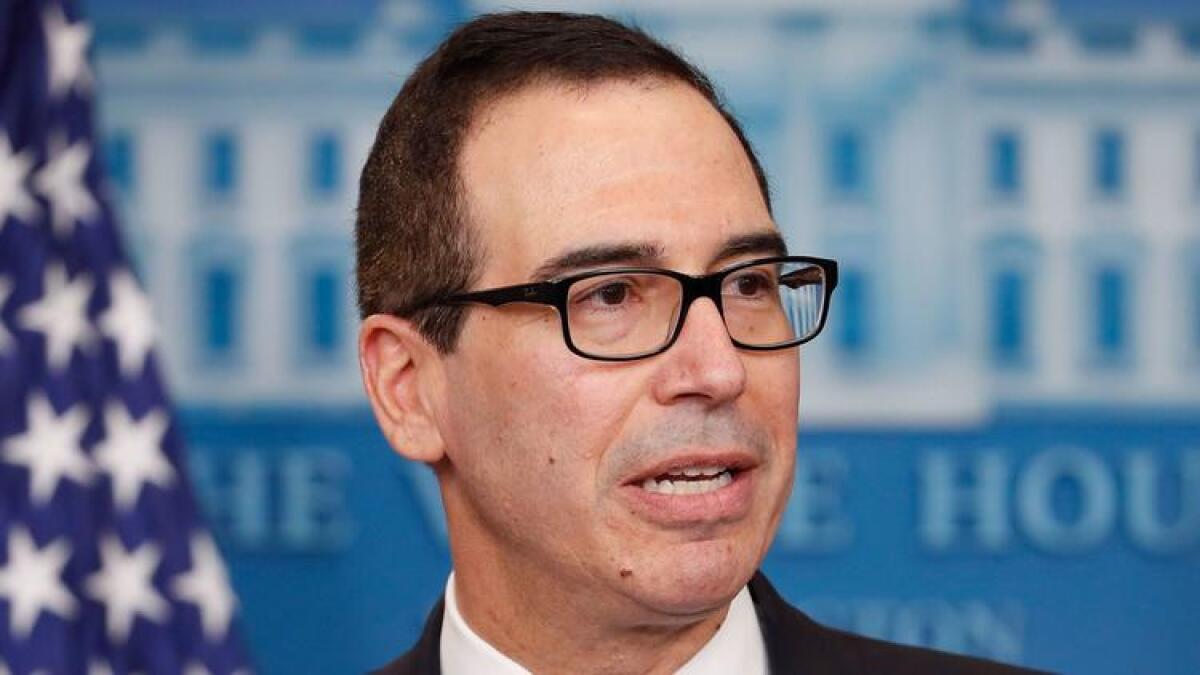
A Democratic senator wants to know if Treasury Secretary Steven Mnuchin committed an ethics violation when he publicly plugged “The Lego Batman Movie,” a film in which he has a financial stake.
A former Hollywood financier, Mnuchin was asked at the end of a question-and-answer session on Friday hosted by the Axios news website to name a movie people should see.
“Well, I’m not allowed to promote anything that I’m involved in. So I just want to have the legal disclosure, you’ve asked me the question and I am not promoting any product,” Mnuchin said at the event, which aired on C-SPAN2.
“But you should send all your kids to ‘Lego Batman,’ ” he said.
The crowd laughed.
But Sen. Ron Wyden of Oregon, the top Democrat on the Senate Finance Committee, wasn’t amused. He’s asking the U.S. Office of Government Ethics to look into the comments.
- Share via
Venezuela hits back in showdown with OAS, U.S. over democracy
The Venezuelan foreign minister had harsh words Monday for the regional organization that is considering sanctioning her country for its failure to hold democratic elections.
Delcy Rodriguez, the foreign minister, accused the Organization of American States of wanting not to punish Venezuela but to destroy it.
Rodriguez appeared at an OAS panel convened in Washington. D.C., after the United States and 13 other of the hemisphere’s nations united to demand the leftist Venezuelan government free political prisoners and set a date for long-overdue elections.
Failure to do so, the 14 countries warned, could trigger a decision to suspend Venezuela from the 69-year-old regional body.
OAS Secretary-General Luis Almagro, a former Uruguayan foreign minister, has been especially critical of Venezuela’s embattled government. He noted that President Nicolas Maduro canceled both a referendum that could have recalled his government and later regional elections, after the opposition made huge gains in parliamentary voting in 2015.
In addition, thousands of people have been arrested for their political beliefs, Almagro said, including opposition leader Leopoldo Lopez, who has been in jail for three years.
But Rodriguez, in a speech to the OAS panel, said Venezuela’s “revolution” continues strong. She accused Almagro of being a stooge of the U.S. government, a “lying mercenary who is a traitor to everything a Latin American diplomat should represent.”
“He lacks independence when he voluntarily bows to the wishes of the most powerful nation of this organization -- and becomes its spokesman,” Rodriguez said.
Although the OAS has often been accused of pro-Washington tendencies, 13 nations in addition to the United States have joined to condemn Venezuela, a significant shift in Latin America away from populist regimes. Other leftist-ruled countries, like Bolivia, have said they will support Venezuela.
Rodriguez said the accusations against her government were “unilateral,” unjustified and biased. She called on the OAS to suspend discussion of Venezuela, but another session was scheduled to proceed on Tuesday -- the same day Maduro’s Socialist Party is planning big “anti-imperialism” marches at home.
All of the countries most critical of Venezuela, including the United States, say suspension of the oil-rich, Caribbean country from the OAS should be a measure of last resort.
Despite its oil wealth, Venezuela is in the throes of an economic and humanitarian disaster, with severe shortages of food and medicine and skyrocketing inflation and homicide rates.
- Share via
Atty. Gen. Jeff Sessions criticizes ‘sanctuary cities’ but offers no new policies

Decrying the safety risk posed when cities don’t cooperate with federal immigration authorities, Atty. Gen. Jeff Sessions repeated previous statements that the Trump administration would seek to deny so-called sanctuary cities some federal grant fun
Decrying the safety risk posed when cities don’t cooperate with federal immigration authorities, Atty. Gen. Jeff Sessions repeated previous statements that the Trump administration would seek to deny so-called sanctuary cities some federal grant funds, but offered no new policies.
Despite his high-profile appearance at the White House briefing room, Sessions merely reiterated Obama administration policy related to immigration. Justice Department officials said any new measures would be “weeks or months” in the future.
The Obama administration issued instructions last July that required any cities applying for Justice Department grant programs be in compliance with federal law requiring cooperation between local, state and federal agencies with requests from the Immigration and Naturalization Service.
Sessions noted that any jurisdiction applying for grants from his department would have to certify that compliance. The Justice Department already has been requiring that, which indicates that police and sheriff departments which currently have Justice Department grants already have been asserting that they are meeting the requirements of federal law.
Although many cities have policies that they, or critics, characterize using the label “sanctuary,” those policies do not necessarily mean they are violating the law.
Sessions did say that the Justice Department could in the future institute additional requirements, but announced none.
“Fundamentally, we intend to use all the lawful authority we have to make sure that our state and local officials, who are so important to law enforcement, are in sync with the federal government,” he said.
He did offer a warning to jurisdictions considering adopting “sanctuary” status. The California legislature is considering a proposal to institute the designation statewide; Sessions, though, singled out Maryland for a similar proposal.
“That would be such a mistake,” Sessions said, while noting Maryland’s Republican governor opposes the change proposed by the heavily-Democratic legislature.
Sessions cited a high-profile case in San Francisco where a 32-year-old woman was killed by man who had been previously deported multiple times despite a request by immigration authorities to continue his detention to illustrate the administration’s case against such policies.
“Countless Americans would be alive today and countless loved ones would not be grieving today if these policies of sanctuary cities were ended,” Sessions claimed.
- Share via
Devin Nunes plot thickens, as his spokesman concedes he met source for surveillance claim at White House
The day before the House Intelligence Committee chairman revealed that conversations by Trump transition officials may have been inadvertently picked up by U.S. surveillance, he met with the source of the information at the White House, his spokesman said Monday
Rep. Devin Nunes (R-Tulare), went to the White House because there was a facility there for reviewing classified information, said Jack Langer, a spokesman for Nunes, who has refused to divulge the identity of his source.
“Chairman Nunes met with his source at the White House grounds in order to have proximity to a secure location where he could view the information provided by the source,” Langer said.
The latest news added another twist to a bizarre series of events last week:
On Monday, FBI Director James Comey testified before Nunes’ committee that his investigators were looking at possible “coordination” during the presidential campaign between Russian officials and people close to Preisdent Trump.
Tuesday night, Nunes went to the White House where someone showed him documents related to U.S. intelligence surveillance, according to his statement.
On Wednesday, Nunes announced to reporters that he had seen evidence indicating that people close to Trump had been subjects of surveillance during the transition. He then went to the White House, saying that he needed to brief Trump about the revelations.
On Thursday, Nunes apologized to committee members for not having shown the evidence to them before briefing the president.
Later that day, his spokesman conceded that Nunes did not know “for sure” that any Trump aides had actually been subject to surveillance, just that their names had appeared in intelligence reports, which could have resulted from other people talking about them.
That sequence of events could buttress Democrats’ claims that the episode last week was a White House ploy to shift attention away from the FBI investigation.
Democrats already have been saying Nunes should be disqualified from heading an inquiry into whether Trump’s aides had improper contacts with Russia.
Nunes’ statement left several questions unanswered. One is why he would have had to go to the White House unless his source worked there, because members of Congress have access to a secure facility at the U.S. Capitol.
Asked to explain Nunes’ actions, Langer said in an email, “The information comprised executive branch documents that have not been provided to Congress. Because of classification rules, the source could not simply put the documents in a backpack and walk them over to the House Intelligence Committee space. “
He added: “The White House grounds was the best location to safeguard the proper chain of custody and classification of these documents, so the Chairman could view them in a legal way.”
Last week, White House Press Secretary Sean Spicer had dismissed speculation that the White House had supplied Nunes with the information, saying that the suggestion did not pass the “smell test.” He added, however, that he did not for sure what Nunes had told Trump or where his information came from.
After Nunes apologized to members of his committee Thursday and promised to “thoroughly investigate” the surveillance, several lawmakers said Nunes had promised to provide them the surveillance information he had received. That has not occurred yet.
In his first statement last week, Nunes said he was concerned that some Trump transition officials’ identities might have been improperly revealed in intelligence reports, despite rules requiring them to be kept confidential in most cases.
“The Chairman is extremely concerned by the possible improper unmasking of names of U.S. citizens, and he began looking into this issue even before President Trump tweeted his assertion that Trump Tower had been wiretapped,” Langer said.
Whether any officials’ names actually were unmasked is unclear. The ranking Democrat on the committee, Rep. Adam Schiff (D-Burbank) has questioned Nunes’ assertions about improper unmasking. But Schiff noted that he has not seen the documents Nunes claims to have seen.
Schiff had no comment on the news that Nunes had seen the documents at the White House.
UPDATES
10:20 a.m.: This article was updated with staff reporting.
This article was originally published as an Associated Press report at 9:06 a.m.
- Share via
Venezuela in showdown with OAS, U.S. over political prisoners
The besieged leftist government of Venezuela is under mounting pressure after the United States and 13 of the hemisphere’s other leading nations demanded the release of political prisoners and other pro-democracy concessions.
The Organization of American States, the region’s main collective body, has threatened to suspend Venezuela because of what it called the autocratic repression imposed by President Nicolas Maduro.
Maduro’s foreign minister, Delcy Rodriguez, will appear Monday before an OAS panel in Washington to plead her government’s case. This comes after members of the Venezuelan delegation stormed out of OAS meetings last week, according to diplomats.
OAS Secretary-General Luis Almagro, in a report on Venezuela, noted that Maduro canceled both a referendum that could have recalled his government and later regional elections, after the opposition made huge gains in parliamentary voting in 2015. A Maduro-controlled Supreme Court then stripped the parliament of much of its power.
In addition, thousands of people have been arrested for their political beliefs, Almagro said, including opposition leader Leopoldo Lopez, who has been in jail for three years.
The OAS is demanding Venezuela hold elections or risk suspension from the group, a drastic measure. The last time a country was suspended was when the military and right-wing politicians staged a coup against the elected president in Honduras in 2009.
Under OAS regulations, a country can be suspended when the “democratic order” is “altered.”
Venezuela is in the throes of a devastating economic and humanitarian crisis. The oil-rich country has among the highest homicide and inflation rates in the world and suffers from severe shortages of food and medicine.
The Maduro government angrily condemned the OAS actions as “imperialist interference” and vowed to resist. Adan Chavez, brother of the late Hugo Chavez, the socialist strongman who set Venezuela on its revolutionary path, claimed the OAS was plotting a coup against Maduro.
Maduro views much of his opposition as right-wing oligarchs who have long repressed the poor.
Although the OAS has often been accused of pro-Washington tendencies, it is significant that 13 nations in addition to the United States are united in condemning Venezuela. This marks a shift away from populist regimes in much of Latin America.
The Trump administration, which has shown little interest in Latin America beyond Mexico, did issue instructions to diplomats to find ways through the OAS to put pressure on Venezuela, according to people familiar with the matter.
Those instructions came despite parallel administration plans to slash funds to the OAS and other multilateral institutions like the United Nations.
Trump recently spoke by telephone to the presidents of Chile and Brazil and in both cases discussed Venezuela, the White House said. And he met at the White House with Lilian Tintori, the wife of Lopez, the jailed opposition leader, as she lobbied for her husband’s freedom.
The Treasury Department earlier this year slapped sanctions on Venezuela’s vice president, Tareck El Aissami, alleging he was a major drug trafficker, charges he denied.
“We’re not pushing for Venezuela’s expulsion from the OAS at this time,” State Department spokesman Mark Toner said late last week.
“However, we do think the OAS is the appropriate venue to deal with the ongoing situation in Venezuela,” he said. “Elections are essential to securing accountability, and the Venezuelan people deserve a voice in creating solutions to the myriad economic, political, and social and humanitarian challenges that they face.”
- Share via
Trump takes to Twitter to blame GOP hard-liners over healthcare failure
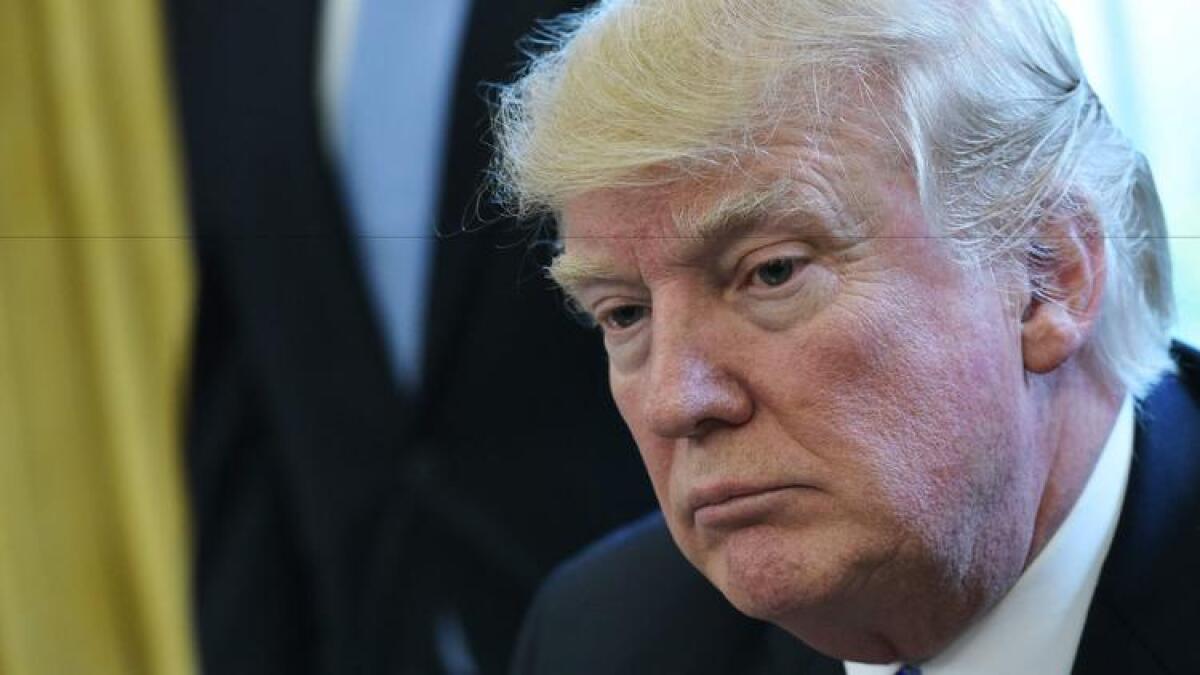
President Trump on Sunday blamed fellow Republicans and two influential conservative advocacy groups for last week’s failure of the GOP healthcare plan.
The president had said on Friday that it was the fault of Democrats that House Speaker Paul D. Ryan pulled the measure from consideration rather than putting it forth for a floor showdown that the GOP leadership would have lost.
In a Sunday morning tweet, the president appeared to shift culpability to the House Freedom Caucus, a conservative group of GOP lawmakers who were key to depriving Trump and his camp of the votes needed for passage.
“Democrats are smiling” over the bill’s failure, Trump declared on Twitter. The Freedom Caucus, he said, had “saved” President Obama’s Affordable Care Act with the help of Heritage Action and the Club for Growth, two organizations that had opposed the GOP measure.
The chairman of the House Freedom Caucus, Rep. Mark Meadows (R-N.C.), declined to engage in any sparring with the White House, instead predicting that a Trump-led Republican effort to overhaul Obama’s signature healthcare legislation eventually would move ahead.
“At the end of the day, the most valuable player will be President Trump,” he said on ABC’s “This Week.”
Meadows also insisted there had been “no conversation” about any attempt to force out Ryan, who is being blamed for failing to marshal sufficient support for the measure he had spearheaded.
Trump so far has refrained from public criticism of the speaker, but — again on Twitter — he specifically urged followers to watch a Fox News segment on Saturday night, featuring commentator Jeanine Pirro excoriating Ryan and calling for him to be ousted.
That gave rise to speculation that Trump would seek to force the speaker to take the fall for the debacle.
- Share via
After the GOP healthcare bill fizzles, Trump blames the Democrats and says he ‘learned a lot about loyalty’

President Trump addresses the cancellation of a vote Friday on the GOP’s plan to overhaul the Affordable Care Act.
After failing to land a deal on the healthcare bill, President Trump on Friday blamed Democrats, even though the GOP controls Congress and the White House, and made few overtures across the aisle when pushing the bill.
“When you get no votes from the other side -- meaning Democrats -- it is really a difficult situation,” Trump told reporters in the Oval Office after a revolt by Republican lawmakers forced House leaders to stop a vote in their bid to overhaul the Affordable Care Act.
Trump insisted that the current healthcare law, commonly known as Obamacare, will collapse under its own weight, and then Democrats will want to make a deal with the White House.
“I truly believe the Democrats will come to us,” Trump said.
In the meantime, Trump is moving his attention to pushing through a tax reform bill, he said.
“We will probably be going really hard for the big tax cuts and tax reform -- that’s next,” he said.
Trump, who has spent decades negotiating real estate deals and seeing many of them fall through, seemed sanguine discussing the effort he put into getting a healthcare reform bill passed.
“This was an interesting period of time,” Trump said. “We learned a lot about loyalty and we learned a lot about the vote-getting process.”
Trump stopped short of blaming House Speaker Paul D. Ryan (R-Wis.) and avoided singling out the group of conservative Republican lawmakers, who dug in their heels in opposition.
Lawmakers in the House Freedom Caucus that largely stood against the bill are “very good people” and “friends of mind,” he said.
“I was disappointed because we could have had it,” he said. “I’m a little surprised,” he said.
When asked by a reporter if he would reach out now to Democrats for ideas on how to get a deal, Trump said, “No, I think we need to let Obamacare go its way for a little while. Then we’ll see how things go.”
- Share via
Tillerson will meet with NATO counterparts, after all
Secretary of State Rex Tillerson will meet with NATO allies next week in Brussels, a move that could quell controversy over his earlier decision to skip a long-planned summit of the transatlantic alliance.
The State Department said Friday that Tillerson added a stop at NATO headquarters in Brussels to a previously scheduled trip to the Turkish capital of Ankara.
Tillerson will be in Ankara on Thursday to meet with President Recep Tayyip Erdogan and other senior Turkish officials to discuss the fight against Islamic State militants in Syria and to “reaffirm Turkey’s important role in ensuring regional stability,” the State Department said.
The next day, he will go to NATO, the State Department said. NATO officials were attempting to put together a session with the other 27 allied nations.
Earlier this week, news that Tillerson would miss the NATO ministerial meeting set for April 5-6, roiled the alliance. Administration officials said Tillerson would have to be in Washington to attend President Trump’s first face-to-face meetings with Chinese President Xi Jinping on April 6-7.
At the same time, Tillerson’s aides announced he would be traveling to Moscow the following week.
Criticism was swift from European allies but also from several former American diplomats and key U.S. lawmakers, who said the decision raised questions about the Trump administration’s commitment to NATO.
During his campaign, Trump called the alliance “obsolete,” although more recently he has voiced support for it while also demanding members spend more money on defense.
In response, Tillerson’s aides said they were exchanging possible alternative dates with NATO to attempt to arrange a meeting in which all parties could participate. It was not yet clear if next Friday’s meeting will take the place of the April 5-6 session, which as of late Friday remained on NATO’s formal calendar.
Diplomats considered the ministerial meeting as especially important because it will lay the groundwork for a May 25 NATO summit of heads of state and government, which Trump has said he will attend.
- Share via
Charter promises Trump something new ($25-billion investment) and something old (20,000 jobs)
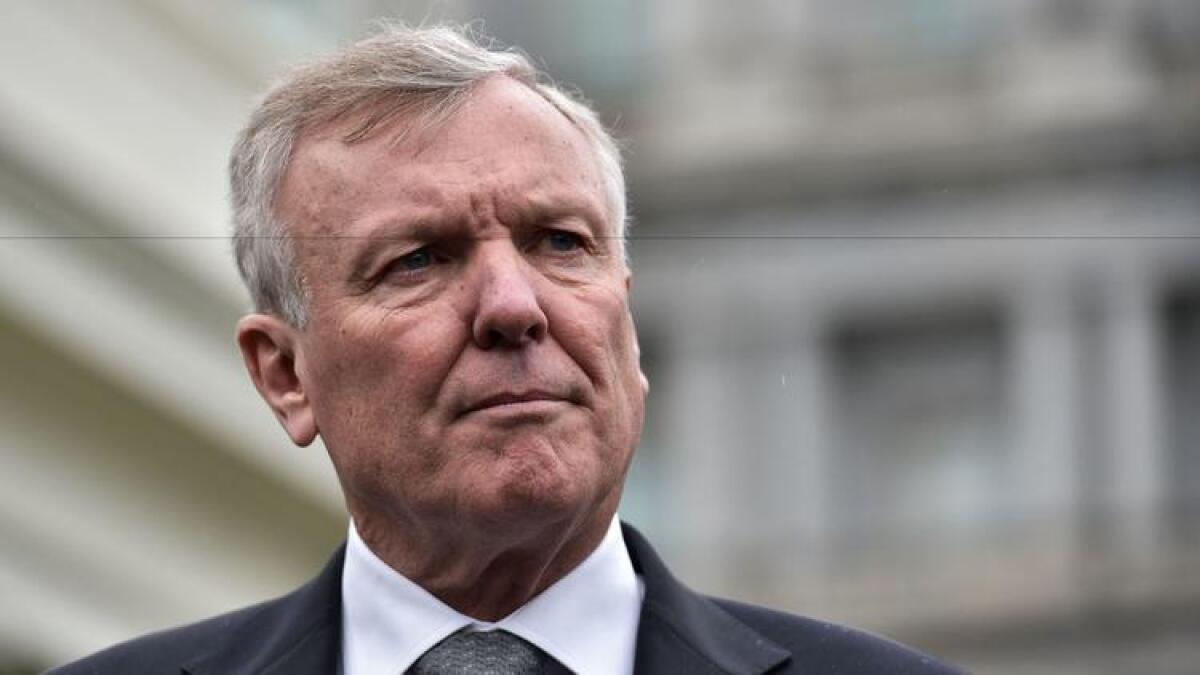
The chief executive of Charter Communications committed in a meeting with President Trump on Friday to invest $25 billion on broadband infrastructure while joining a trend of business leaders touting previously announced job creation at the White House.
In the case of Charter — Southern California’s dominant cable-TV and Internet service provider — Chief Executive Thomas Rutledge said he expected to hire 20,000 new U.S. employees over the next four years.
Charter had made the hiring promise in 2015 when it was purchasing Time Warner Cable. The new development was the time period in which it will occur.
Nevertheless, Trump indicated the job creation was triggered by his election.
- Share via
Threats made against Hawaii judge who ruled against travel ban
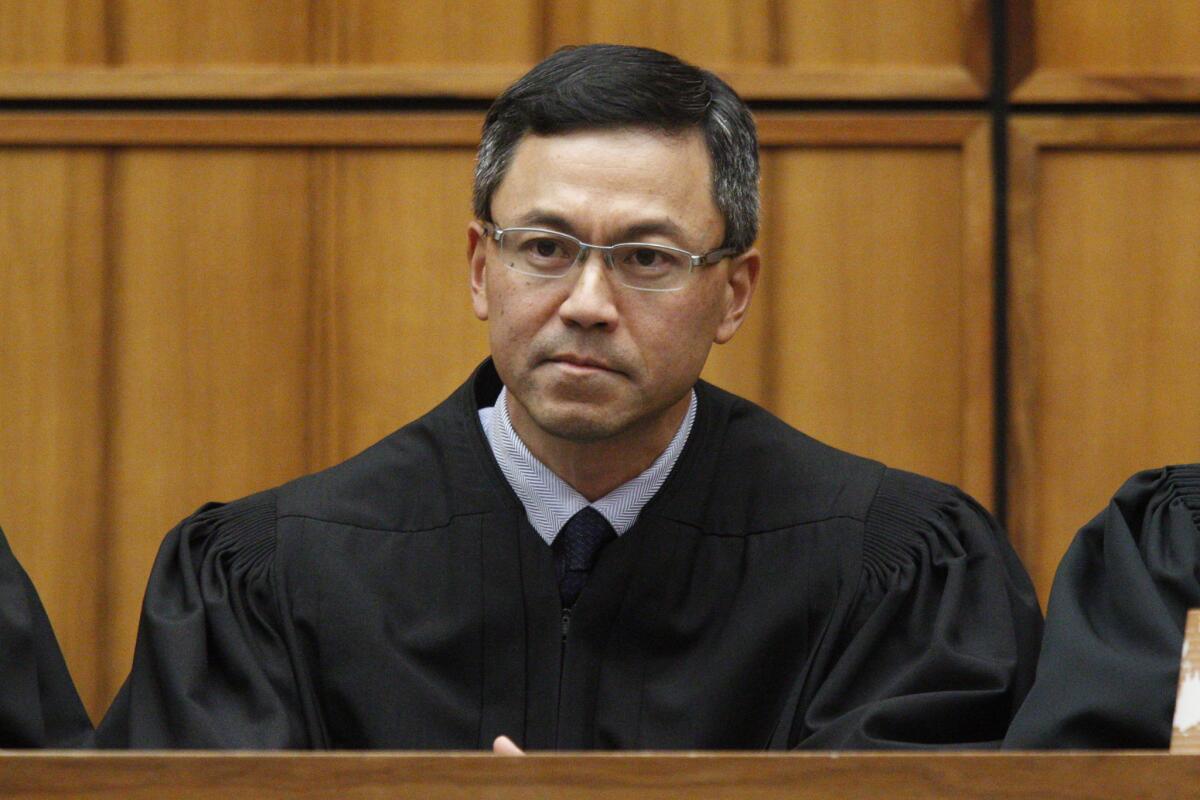
The Hawaii federal judge who brought President Trump’s revised travel ban to a national halt last week has become the target of threats.
U.S. District Judge Derrick Watson has received the threats since his March 15 ruling, according to FBI spokeswoman Michele Ernst.
Ernst said the FBI is ready to assist but declined to provide more information.
The U.S. Marshals Service also said it would not give details.
“The U.S. Marshals Service is responsible for the protection of federal judicial officials, including judges and prosecutors, and we take that responsibility very seriously,” the agency said in a statement.
“While we do not discuss our specific security measures, we continuously review the security measures in place for all federal judges and take appropriate steps to provide additional protection when it is warranted.”
Watson, a judge in the U.S. District Court of Hawaii in Honolulu, issued a scathing 43-page opinion against the travel ban the day before it was to go into effect.
He wrote that, despite the ban’s “stated secular purpose,” Trump’s own words marked the executive order as a fulfillment of the president’s campaign promise to temporarily bar Muslims from coming to the U.S. “The illogic of the government’s contention is palpable,” Watson said.
In response, Trump said Watson’s ruling was “terrible” and “makes us look weak.”
Trump has vowed to take the travel ban case to the U.S. Supreme Court. An appeal of a separate Maryland federal judge’s ruling against the travel ban is currently pending in the U.S. 4th District Court of Appeals.
- Share via
House GOP gives up on healthcare bill as Trump suffers first legislative defeat
Unable to muster enough support from his own party, House Speaker Paul D. Ryan again postponed a vote Friday on the GOP’s plan to overhaul the Affordable Care Act.
The move came at the request of President Trump, who just Thursday night issued an ultimatum that lawmakers should hold the vote regardless of the outcome.
It was the second time House GOP leaders had to delay a final reckoning on the measure to avoid an embarrassing defeat.
Republicans could afford to lose no more than21 or 22 votes from their own members, but defections appeared at times to exceed 30.
The conservative House Freedom Caucus wanted Trump and Ryan to go further and faster in unwinding Obamacare rules and taxes. Centrist Republicans were worried the GOP plan would leave too many Americans without health insurance.
- Share via
White House sounds resigned to defeat of GOP healthcare reform plan
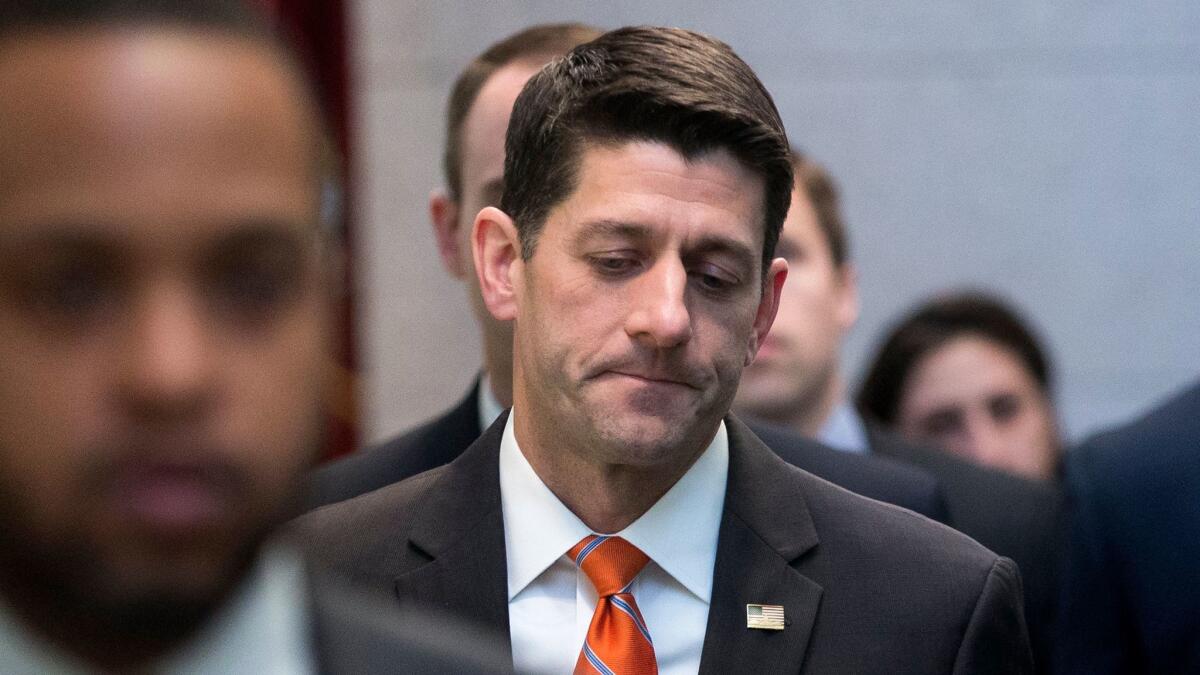
Hours before President Trump faced his first big legislative test, the White House sounded resigned to the possibility that a GOP plan to overhaul the Affordable Care Act could be defeated.
“At the end of the day, this isn’t a dictatorship and we’ve got to expect members to vote the way they will vote,” White House spokesman Sean Spicer said.
“There is no question that the president and his team have left everything on the field,” Spicer told reporters in the West Wing. “At some point you can only do so much.”
The president asked House Speaker Paul D. Ryan to meet him at the White House and the two discussed where the vote count stands.
“We’ve seen the whip count. We know where the vote count stands. We don’t need a live vote to tell us where the votes are,” Spicer said.
While the White House was not giving up hope that the bill could pass, Spicer’s comments hinted that it didn’t look good.
He said the president doesn’t want to drag out discussions on the healthcare bill because he wants to move on to other issues such as tax reform, immigration and funding the border wall.
Several high-profile Republicans, including House Appropriations Committee Chairman Rodney Frelinghuysen, signaled they would vote against the measure, fueling growing doubts about whether it will win enough votes to pass.
Trump surrogate Rep. Chris Collins (R-N.Y.) said he “can’t guarantee” the GOP bill has the votes. He said he was “very disappointed” in party members who were not on board.
- Share via
Virginia federal judge rules in favor of Trump’s revised travel ban
Unike federal judges before him, a judge in Virginia on Friday ruled in favor of President Trump’s revised travel ban in a case brought by Muslims who said the president’s executive order illegally discriminated against their religion by restricting travel from six majority-Muslim countries.
U.S. District Judge Anthony Trenga of the Eastern District Court of Virginia in Alexandria wrote that the plaintiffs, the Council on American-Islamic Relations and other Muslim community leaders from across the country, probably would not prevail in their suit.
Trenga said the travel ban likely “falls within the bounds” of Trump’s authority as president, and he rejected a request to halt the order.
Trenga’s ruling doesn’t have an immediate effect on the ban, which was put on hold by federal judges in Hawaii and Maryland last week. But it gives ammunition to government lawyers arguing for the ban across several U.S. courts where cases against it are pending.
- Share via
What we learned about Neil Gorsuch during his Supreme Court confirmation hearing
Confirmation hearings for Supreme Court nominees act out a peculiar Washington ritual in which inquisitive senators gather before TV cameras to hear an aspiring justice politely refuse to answer their questions on all the pressing legal issues of the day.
To no one’s surprise, Judge Neil M. Gorsuch, President Trump’s nominee, portrayed himself as an earnest, idealistic jurist who did not want to “tip his hand” by voicing his views. Justice Sonia Sotomayor and Chief Justice John G. Roberts Jr. followed the same script on their way to confirmation, as does virtually every nominee.
But three days of testimony before the Senate Judiciary Committee revealed some of Gorsuch’s thinking and gave hints as to what kind of justice he could be.
Gorsuch, 49, appears to be a strict “textualist” who believes in following the exact words of a law, even if doing so leads to a seemingly unfair or undesired result.
But he may not be as much of a true “originalist” as the late Justice Antonin Scalia, who advocated following the meaning of the Constitution as it was understood at the time it was written.
- Share via
Tensions rise in House Intelligence Committee probe; former Trump advisers offer to testify
Tensions between the two leaders of the House investigation into links between the Trump campaign and Russia escalated Friday as the committee announced it would soon question President Trump’s former campaign chairman.
Rep. Devin Nunes (R-Tulare), chairman of the House Intelligence Committee, told reporters at a news conference that former Trump campaign chairman Paul Manafort, who has worked as a lobbyist for a Russian businessman and for a pro-Russian Ukrainian politician, had volunteered to be interviewed by the committee.
He said the panel would consult with Manafort’s attorney on whether he would testify in public or private.
But Nunes also announced that the committee was canceling a planned public hearing with former Acting Atty. Gen. Sally Yates and two former Obama administration intelligence officials -- the former director of national intelligence, James Clapper, and former CIA Director John Brennan.
The decision to cancel the hearing prompted the panel’s top Democrat to accuse Nunes of seeking to avoid further bad publicity for the White House after a tumultuous week.
Rep. Adam Schiff (D-Burbank) said in a separate news conference that he “strongly objected” to the cancellation of the hearing, calling it a “dodge” by Nunes to aid the White House.
Nunes apologized to the committee Thursday after abruptly announcing publicly that he had received information that Trump transition officials were inadvertently picked up on surveillance by U.S. intelligence agencies and then briefing Trump on the information before sharing it with fellow panel members.
Calling Nunes’ actions a “dead of the night” maneuver, Schiff suggested that the chairman’s decisions had been aimed at buttressing Trump’s debunked claim that President Obama had wiretapped him.
“That effort to defend the indefensible has led us down this terrible rabbit hole and threatens the only investigation that is authorized in the House,” Schiff said.
Schiff did not say that Democrats would pull out of the investigation, but said it was for Speaker Paul D. Ryan to decide if Nunes should continue as chairman of the intelligence panel.
In addition to Manafort, two other Trump associates said they were willing to answer questions from the committee.
Carter Page, a Manhattan energy consultant with business ties to Russia who served as a campaign foreign policy adviser to Trump, sent a letter to the committee March 23 volunteering to testify. Page provided The Times a copy of the message.
Page was one of several Trump associates cited by Schiff and other Democrats at the committee’s hearing last Monday. He was also was named in a unverified dossier about Trump ties to Russia compiled by Christopher Steele, a former British intelligence officer, that was given to the FBI.
“I would eagerly welcome the chance to speak with the Committee to help finally set the record straight following the false evidence, illegal activities as well as other lies distributed by certain politically-motivated suspects in coordination with the Obama Administration, which defamed me and other Americans,” Page said in his letter.
Separately, Roger Stone, a political consultant who once advised Trump, said he wanted to answer questions. Stone has admitted having contacts last summer with a pro-Russian hacker accused by the FBI of being involved in the cyber attack on the Democratic National Committee.
“I have been anxious to testify for some time,” Stone said in an interview. “My name was dragged through the mud in a public session, and I should be permitted to rebut that in a public session. They don’t even have to subpoena me. I have volunteered to testify, and I would prefer that testimony to be in public.”
12:15 p.m.: This post was updated with statements by Roger Stone and Carter Page.
- Share via
Speaker Ryan rushes to the White House for a last-minute meeting with Trump
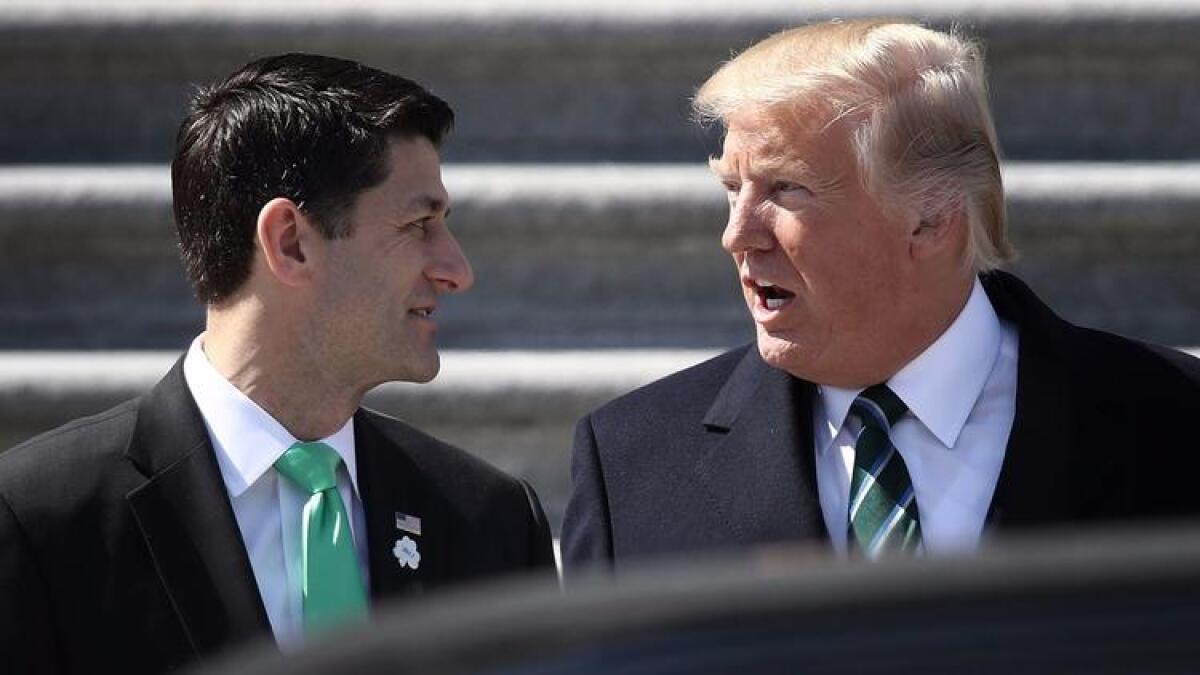
Hours away from a crucial healthcare vote, House Speaker Paul D. Ryan (R-Wis.) rushed Friday to the White House for a meeting with President Trump.
As Ryan met the president in the West Wing, the GOP effort to overturn the Affordable Care Act was in jeopardy. A number of key House Republicans said during the day they would vote “no” on the final passage of the bill. Ryan’s visit to the White House lasted about an hour.
Ryan has struggled to keep his coalition of fiscal hawks and more centrist conservatives together to repeal and replace Obamacare, as the current law is called.
As support for the bill seemed to waver Thursday, Trump issued an ultimatum that lawmakers must pass the bill or he would move on to other issues, such as tax reform.
Trump “left everything on the field” in the effort to pass the bill, White House press secretary Sean Spicer said in his daily press briefing. “We’ve done everything,” he said.
Spicer insisted that White House officials continued to believe that the bill might pass. The vote is currently scheduled for roughly 3:30 p.m. EDT.
This post was updated with Sean Spicer’s comments and corrected the length of Ryan’s visit to the White House.
- Share via
Watch live: House debates legislation to repeal Obamacare
- Share via
Former Trump campaign chairman Paul Manafort has offered to be interviewed by House Intelligence Committee
The Republican chairman of the House Intelligence Committee says former Trump campaign chairman Paul Manafort has volunteered to speak with the panel as part of its ongoing investigation into Russia’s alleged interference in the 2016 election.
Rep. Devin Nunes (R-Tulare) told reporters that Manafort’s counsel contacted the committee Thursday to offer lawmakers the opportunity to interview him.
Nunes said he does not know whether the interview will take place in a public forum or behind closed doors.
The Associated Press reported this week that Manafort, before signing up with the Trump campaign, secretly worked for a Russian billionaire and wrote a proposal aimed at benefiting the government in Moscow.
The House Intelligence Committee is investigating whether any ties exist between Trump associates and Russia.
- Share via
GOP’s Obamacare repeal bill clears hurdle, heads toward final vote
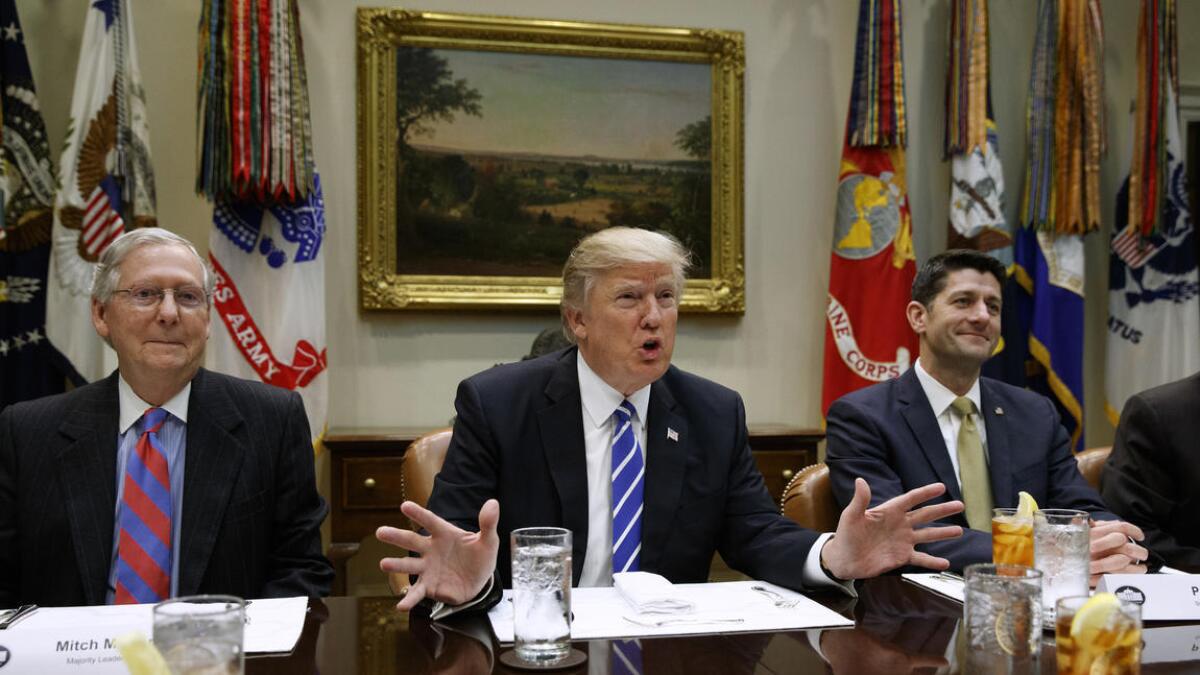
The GOP effort to undo the Affordable Care Act crossed a key hurdle when House Republicans approved a procedural step, setting up a final vote expected later Friday.
UPDATE: At Trump’s request, House again pulls Obamacare vote amid crumbling support >>
But the bill to repeal and replace Obamacare, as the law is called, is still in serious doubt amid deep Republican dissent.
Late Thursday, President Trump issued lawmakers an ultimatum to either pass the bill or he would move on to other issues. The White House said it was done negotiating with the conservative House Freedom Caucus, which wants a tougher bill, and more centrist and moderate Republicans worried about Americans losing coverage under the GOP plan.
Trump’s threat changed the tenor of what had been relatively congenial negotiations. Some lawmakers embraced the moment as their battle cry to act, while others resented the president’s hard-sell language.
On Friday, Trump went a step further, criticizing the caucus publicly for its opposition.
“The irony is that the Freedom Caucus, which is very pro-life and against Planned Parenthood, allows P.P. to continue if they stop this plan!,” the president tweeted.
House Speaker Paul D. Ryan (R-Wis.) has struggled to build majority support for passage and Trump’s message cut both ways.
Approval of the rules package Friday morning by a 230-194 vote does not ensure final passage later in the day. Six Republicans voted against advancing the bill.
- Share via
Trump attacks House Freedom Caucus for opposing his healthcare bill
- Share via
Trump administration to give green light to Keystone XL pipeline
Reviving a big oil project which environmentalists had hoped was dead and buried, the Trump administration plans to announce Friday that it has issued a permit for the Keystone XL pipeline.
The project, which would ship 800,000 barrels of oil a day from Canada’s tar sands to Gulf Coast refineries, had been rejected by the Obama administration last year, a move heralded by climate activists. The rejection came just before the former president signed an international agreement on global warming in Paris.
But Trump vowed to undo the previous administration’s work on climate change. He announced soon after taking office that he would seek to restart the pipeline project, a clear signal that he would move aggressively to promote oil development.
The pipeline’s future, though, remains uncertain. Keystone was conceived at a time of significantly higher oil prices. Its developers had not envisioned prices would drop and remain so low, for so long. Extracting oil from the tar sands is costly, and it remains to be seen if the project will ultimately cost out.
Already, the White House has retreated from a demand that the builders of the pipeline use American steel -- a vow that Trump announced with considerable fanfare. That requirement would have raised the cost of the project substantially.

About half the steel being used to build the pipeline would be imported, much of it from India and some from a Canadian company owned by a wealthy Russian. White House officials said they exempted the project from Trump’s buy-American order because it was already underway at the time the order was signed.
Trump plans to speak about the project this morning, according to a tweet from White House Press Secretary Sean Spicer.
The State Department earlier announced that the pipeline developer, TransCanada, has been given the required permit to construct a line that crosses the U.S. border. The State Department concluded that building Keystone is in the national interest, reversing the view of the Obama administration.
Secretary of State Rex Tillerson, the former chief executive of ExxonMobil, had recused himself from the decision-making process. The permit was signed by Tom Shannon, a career diplomat serving as undersecretary of state for political affairs.
- Share via
Trump’s travel ban could remain blocked for weeks
A federal appeals court said Thursday that it would hear arguments in early May over the Trump administration’s appeal of a lower court’s ruling against its travel ban, potentially leaving the ban stalled for several more weeks.
The U.S. 4th Circuit Court of Appeals filed notice scheduling oral arguments for May 8 on the Justice Department’s appeal. The federal government is asking the court to reverse a ruling by a federal judge in Maryland that called for a national halt to the 90-day ban in President Trump’s executive order on travel from six majority-Muslim countries.
The Justice Department said it planned to file a motion in the appeals court on Friday asking for the Maryland decision to be reversed more quickly for national security purposes. According to the court’s schedule that was released Thursday, the court would wait until at least April 5 to rule on that request, though the process could take longer.
U.S. District Judge Theodore D. Chuang’s decision in the Maryland case against the travel ban came down on March 16, the day the ban was supposed to go into effect. A day earlier, a federal district court in Honolulu also ruled against Trump. The Hawaii ruling blocked enforcement of the ban affecting the six countries, as well as a 120-day pause on refugee resettlement.
The Trump administration has not appealed the Hawaii decision. If it appeals, the case would go to the U.S. 9th Circuit Court of Appeals in San Francisco.
The court is the same one where three judges last month unanimously rejected the Trump administration’s request to reverse a Seattle federal judge’s order halting the first travel ban. A different set of judges would likely hear any new appeal.
Trump has said he wants to take the case over the travel ban -- which was retooled in an attempt to pass court muster -- to the U.S. Supreme Court.
- Share via
Revised GOP bill to overhaul Obamacare would save less money, still lead to 24 million more uninsured
House Republicans’ revised plan to overhaul the Affordable Care Act would reduce the deficit by half as much as their original plan, according to a new analysis by the nonpartisan Congressional Budget Office.
But the legislation, which GOP leaders are scrambling to advance, would still double the number of Americans without coverage over the next decade, increasing the ranks of the uninsured by 24 million.
The new CBO estimate does not take account of current negotiations among GOP lawmakers about rolling back Obamacare further.
Conservative lawmakers are pushing to scrap requirements in the current law that all health plans cover a basic set of benefits.
Eliminating that requirement could have an impact on how many Americans have coverage.
But if House leaders proceed with their plans to vote Friday on a revised bill, it is unlikely the CBO would have enough time to evaluate the impact before lawmakers vote.
- Share via
President will likely be making calls ‘throughout the night’ on healthcare bill, aides say
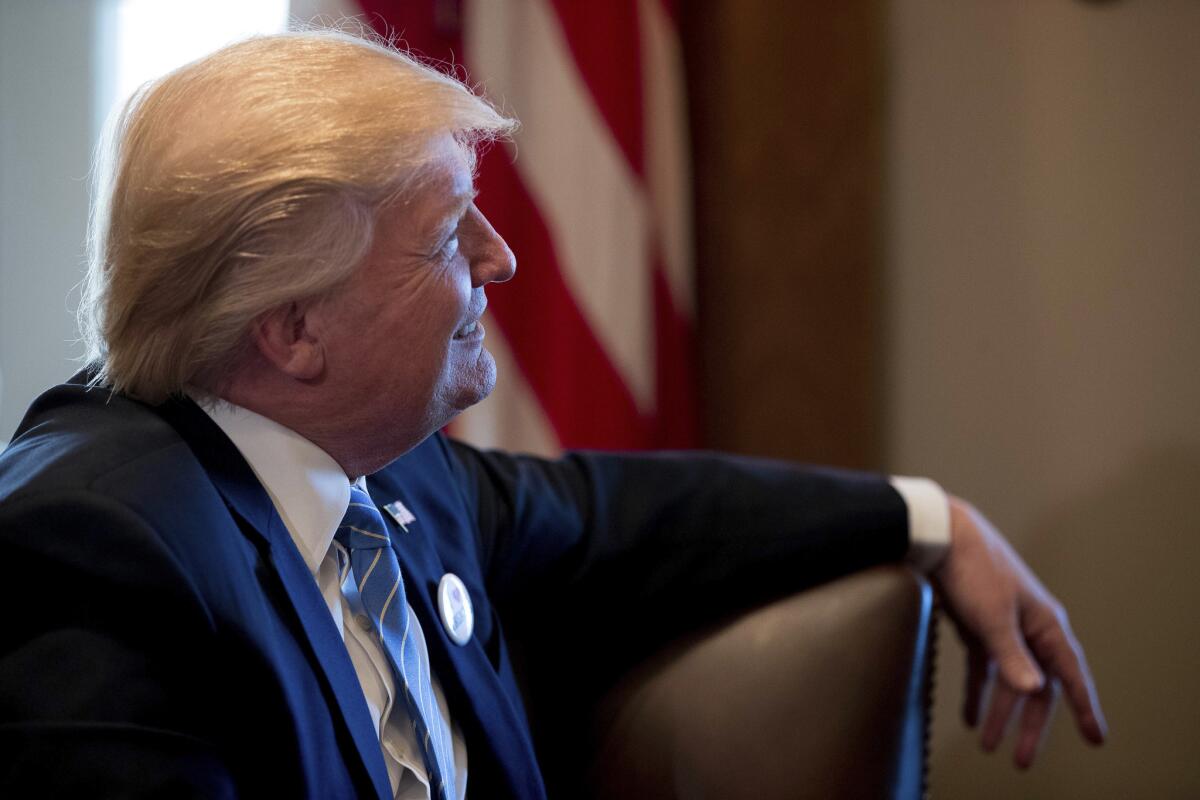
As Republicans scrambled for votes to overhaul the Affordable Care Act, President Trump will likely be making calls “throughout the night” to shore up support, a White House official said Thursday.
“I wouldn’t be surprised if he is continuing to make the calls throughout the night,” White House Deputy Press Secretary Sarah H. Sanders told reporters.
GOP lawmakers decided to postpone the vote on the bill until at least Friday morning when it became clear that there weren’t enough “yes” votes to pass it. The decision came only about an hour after White House spokesman Sean Spicer said that there would be no delay, and it appeared to catch the White House by surprise.
Even at this late hour, Sanders said that Trump was still open to hearing from lawmakers on “ways to make the bill better.”
- Share via
Changes to lease mean Trump doesn’t have a conflict at his Washington hotel, agency rules
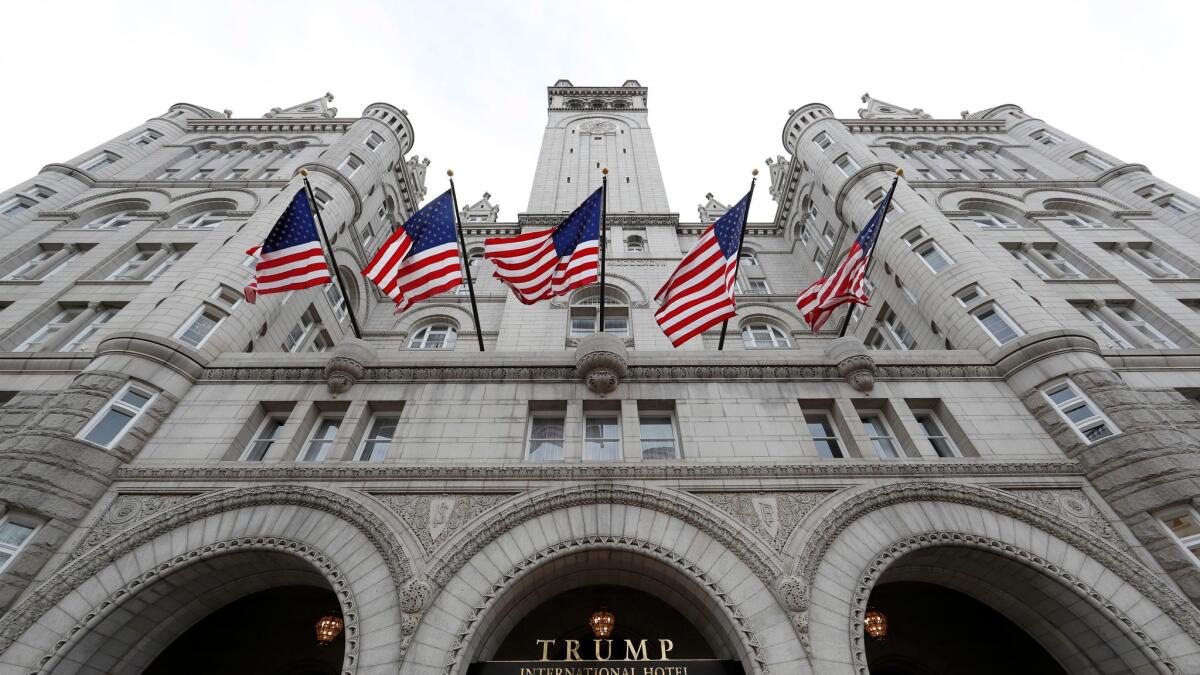
President Trump can continue to lease a downtown Washington hotel from the federal government, a federal agency has decided, determining that the unprecedented arrangement does not present a conflict.
The Trump organization has changed the lease to prevent the president from receiving any of the proceeds from hotel operations, a contracting officer with the General Services Administration, the agency that serves as the government’s landlord, wrote in a letter released Thursday afternoon.
Together with the president’s decision to turn operation of the business over to his sons, that was enough to satisfy GSA that the president’s company, Trump Old Post Office LLC, was not in violation of a provision of its lease that forbids any federal official from benefiting from the deal.
“Accordingly, the lease is valid and in full force and effect,” said the letter signed by the contracting officer, Kevin M. Terry.
The luxury Trump International Hotel a few blocks from the White House is one of the most visible examples of the complications presented by Trump serving as president while continuing to own a worldwide network of hotels, golf courses and other properties.
One recent lawsuit, filed by a Washington restaurant owner, argues that the Trump hotel will unfairly grab business because lobbyists, foreign governments and others will be trying to buy favor from the White House.
According to the GSA, the Trump organization wrote an amendment saying that all revenues from the hotel will stay with the hotel — and not flow to the president’s trust company.
“In other words, during his term in office, the president will not receive any distributions from the trust that would have been generated from the hotel,” Terry wrote.
But the leader of one watchdog group called the GSA’s stand a “very tortured reading” of the contract. Trump will continue to benefit from having money flow to a company that he owns, said Fred Wertheimer, president of Democracy21, which advocates for transparency and limits on political spending.
“So this doesn’t make any sense to me, and it seems like GSA has leaned over backwards to accommodate the president here,” he said. “This is one more example of why President Trump should have divested his assets into a blind trust,” he added.
1:12 p.m. This post was updated with reaction from Fred Wertheimer.
- Share via
House GOP scrambles to salvage Obamacare overhaul as conservative Freedom Caucus, moderates revolt
A planned vote Thursday on the GOP’s Obamacare overhaul was postponed after President Trump failed to broker a deal with the conservative House Freedom Caucus and the bill continued losing support from moderate Republicans.
Instead of an expected floor debate, the day became a frenzy of closed-door meetings as different GOP factions huddled in rooms across the Capitol complex.
Early in the morning, it became clear that the caucus — whose strength comes from the estimated 30 votes the group brings to the table — was splintering.
GOP leaders worked late into the night to cut a deal with the group that has been pushing changes — namely repeal of all the mandates of the Affordable Care Act, including 10 essential health benefits, such as maternity coverage, that insurers are required to provide.
While the White House appeared willing to compromise, many headed into a morning meeting with Trump complained that GOP leaders did not go far enough to meet their concerns.
“They haven’t met us at all,” Rep. Paul Gosar (R-Ariz.) said.
Some caucus members simply wanted to start over. Others bristled at maintaining some of Obamacare’s more popular provisions, such as banning lifetime caps on coverage and allowing young people to remain on their parents’ plans until they are 26.
“There’s a split,” acknowledged Rep. Morgan Griffith (R-Va.), who is among the few from the group backing the new bill, the American Health Care Act.
Without a deal at the White House and as moderates resisted the conservatives’ changes, Thursday’s vote appeared increasingly in doubt.
House Speaker Paul D. Ryan (R-Wis.) was struggling to cobble together a majority for passage, but attempts to win conservatives pushed moderate Republicans farther away and doomed the bill’s chances in the Senate.
One lawmaker, Rep. Phil Roe (R-Texas), emerged from a chairman’s meeting with Majority Leader Kevin McCarthy (R-Bakersfield), and said the vote likely would be pushed to Friday.
That would dash the GOP’s plans to pass the bill on the seventh anniversary of Obamacare.
Rep. Nancy Pelosi (R-San Francisco) said Trump was making a “rookie’s mistake” as he tried to close the deal.
Meanwhile, moderates were huddling on the first floor of the Capitol, and some left their meeting confident the essential benefits that conservatives wanted to eliminate would survive, at least on health insurance plans purchased on the individual marketplaces.
While that might ease some concerns, an increasing number of Republicans are simply uneasy about the details of the GOP bill.
They are being hammered by ad campaigns and phone calls from outside groups on both sides of the issue, and many complain that the process failed to create a workable product. They worry that it will be abandoned in the Senate, where Republican resistance is strong.
The bill aims to fulfill the GOP’s long promise of repealing the Affordable Care Act, but creating a replacement system has proved more daunting. The nonpartisan Congressional Budget Office said 24 million more Americans would be without insurance after the first decade if the new bill becomes law.
Times staff writer Noam N. Levey contributed to this report.
- Share via
GOP leaders postpone vote on healthcare overhaul
House GOP leaders postponed a vote Thursday on legislation to overhaul the Affordable Care Act amid a Republican revolt that raised doubts about the fate of the measure.
Leaders hope to reschedule a vote Friday.
Despite personal appeals from the president and a flurry of last-minute negotiations with House Speaker Paul D. Ryan (R-Wis.), wary lawmakers remained unconvinced.
Conservatives argued the bill did not go far enough in dismantling the healthcare law known as Obamacare, while moderates feared millions of Americans would be left without health coverage.
Republican leaders hoped to swiftly regroup to amend the bill, the American Health Care Act, but options for generating more support appeared limited because making concessions to one faction risked losing support from another. Efforts were complicated by resistance in the Senate, where Republicans have largely panned the House package as unacceptable.
The decision to cancel the vote leaves in limbo Trump’s bid to quickly scrap his predecessor’s signature healthcare law and deliver on his party’s long-running campaign promise.
Trump, faced with a growing fallout from the FBI investigation into possible collusion between Russia and his presidential campaign, was hoping that a decisive victory in the effort to repeal Obamacare would provide him with much-needed political momentum to propel other ambitious efforts, such as overhauling the nation’s tax code, pursuing new trade deals and dramatically scaling back federal spending.
The president made a hard sell this week, warning Republicans that they risked losing their congressional majority in the next election if they failed to support the bill.
The vote delay also dealt an embarrassing defeat to Ryan. Facing solid opposition from Democrats, the speaker must rely on the GOP majority for passage and can lose no more than about 20 Republicans. Defections at one point this week spilled beyond 30.
The conservative House Freedom Caucus — which had been somewhat overshadowed by Trump’s rise in recent months — led the opposition, reestablishing itself as one of the party’s most formidable power centers. Backed by Senate allies, the caucus at times bypassed Ryan and negotiated directly with the White House.
The arrangement raised familiar questions about who was in control of the GOP. And the failure to reach an agreement tarnished Trump’s image as a dealmaker.
“The president’s doing everything he can to make this happen,” said Rep. James Renacci (R-Ohio).
“Everybody has their own opinion. Everybody has their own thoughts. Everybody wants one little thing in a bill,” he said. “In the end, to get something done, you got to have some compromise.”
- Share via
White House attacks Democrats’ plan to filibuster Supreme Court pick
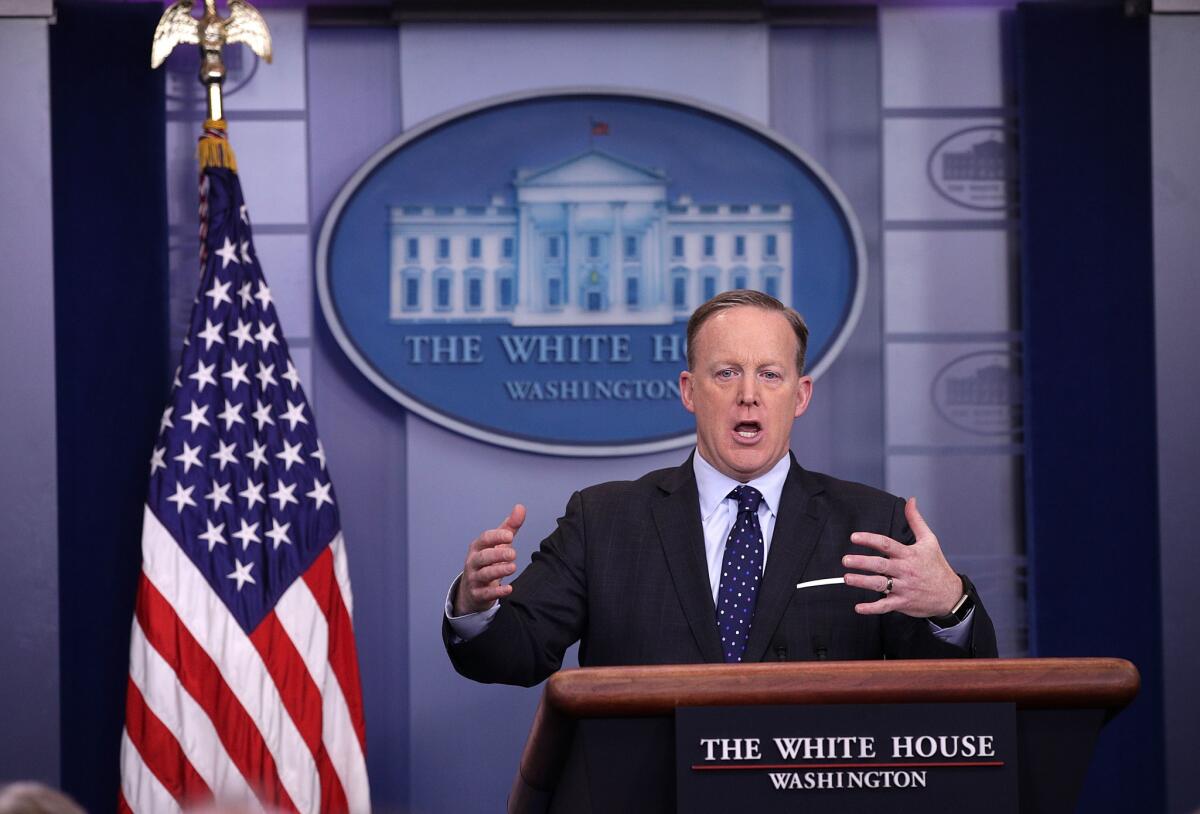
Responding to Democrats’ threat to filibuster Supreme Court nominee Neil Gorsuch, White House Press Secretary Sean Spicer attacked the move as partisan and predicted it would backfire.
“We find [Senate Minority Leader Charles] Schumer’s announcement truly disappointing because it breaks with the tradition of how the Senate has handled Supreme Court confirmation votes in modern times and represents the type of partisanship that Americans have grown tired of,” Spicer said.
Schumer, the New York senator, said Democrats would demand that Gorsuch receive at least 60 votes before his nomination comes to a full floor vote.
Republicans only have 52 seats in the Senate and so far no Democrats have announced they plan to vote for President Trump’s nominee. But Republicans have threatened to use their majority to simply change the rules to lower the minimum threshold to 51 votes should Democrats filibuster.
Spicer noted that Supreme Court nominees have rarely been subjected to filibusters.
“We call on Sen. Schumer and the Democrats to abandon this attempt to block Judge Gorsuch from receiving a fair up-or-down vote that he and the American people have voted for,” Spicer said.
- Share via
U.S. to recommend approval of Keystone XL pipeline, AP sources say

Senior U.S. officials say the State Department will recommend approval of the Keystone XL pipeline, clearing the way for the White House to formally approve it.
Two officials told the Associated Press that Undersecretary of State for Political Affairs Tom Shannon would issue the recommendation Friday. A 60-day deadline to complete a Trump administration review is set to expire next Monday.
The pipeline requires a presidential permit. The officials say the White House would announce the permit’s issuance after the State Department makes its recommendation. The officials weren’t authorized to comment publicly ahead of the announcement and requested anonymity, the AP said.
Shannon is making the recommendation because Secretary of State Rex Tillerson has recused himself from the matter. Tillerson is the former chief executive of Exxon Mobil.
The Obama administration had rejected the pipeline.
- Share via
White House still lacks the votes to pass healthcare bill, spokesman says
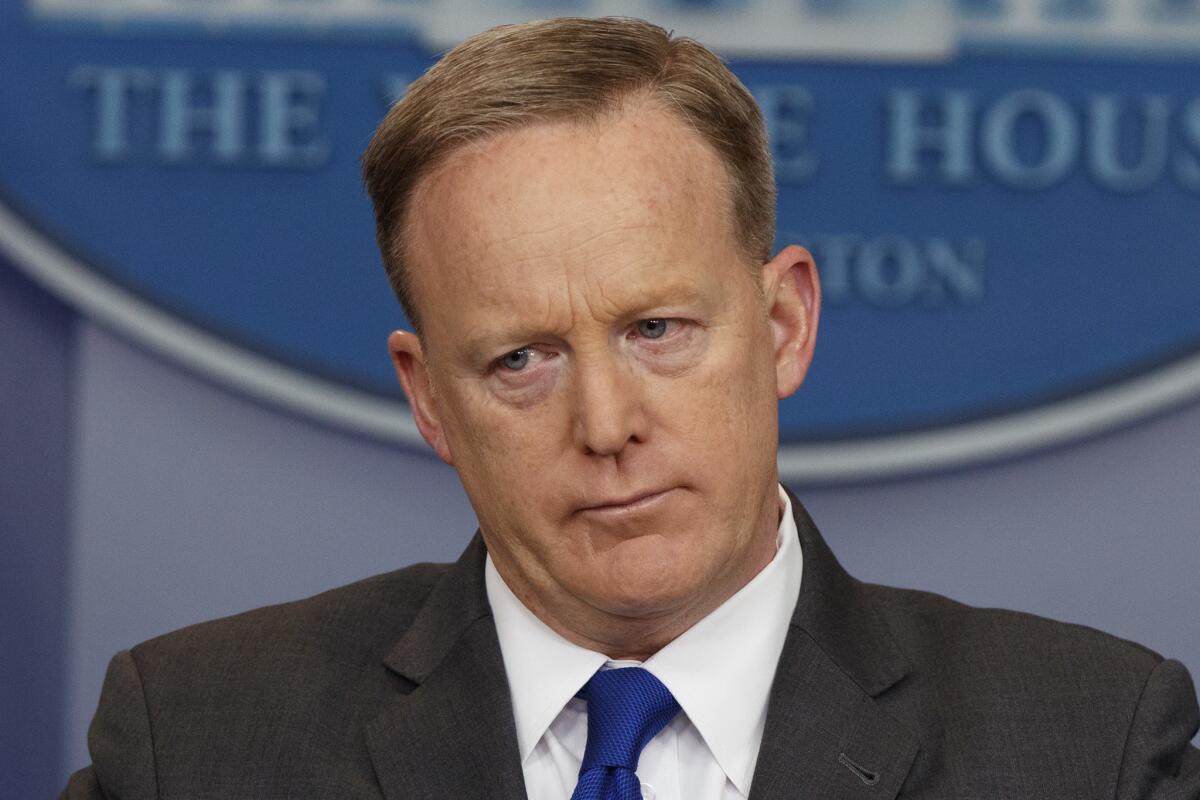
Despite intensive lobbying by President Trump and congressional leaders, the Republican healthcare bill still lacks majority support with hours left before the scheduled vote, White House Press Secretary Sean Spicer said Thursday.
Although Spicer insisted that the vote-gathering is continuing to “make progress,” he made clear that the White House does not yet have a majority.
“I anticipate that we will get there,” he said at his daily press briefing.
His remarks came after a meeting between Trump and members of the conservative House Freedom Caucus. White House officials have floated a variety of proposals to try to woo enough votes from conservatives to get to a majority. Many of the conservatives say the bill does not go far enough to repeal President Obama’s Affordable Care Act.
This afternoon, Trump will try to shore up the other end of the GOP caucus, meeting with members of the centrist Tuesday Group. Many of the proposals being made to pick up conservative votes run the risk of alienating more moderate members.
- Share via
Senate votes to overturn FCC’s tough privacy rules for broadband providers
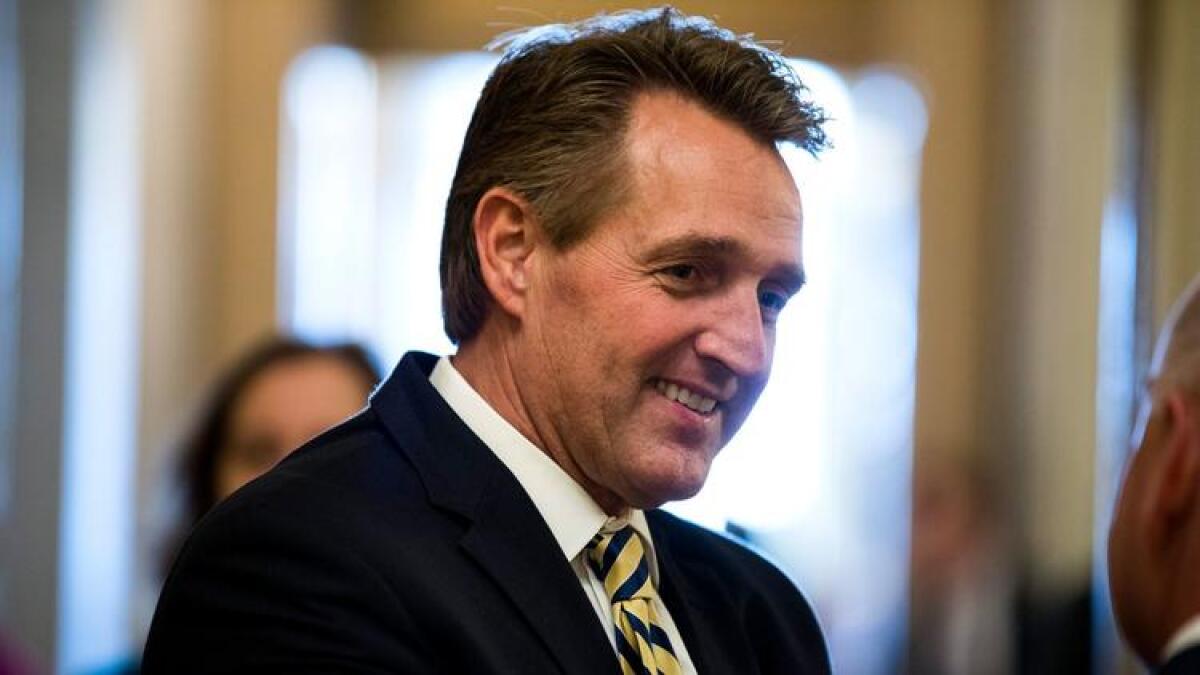
The Senate narrowly voted Thursday to overturn tough new privacy rules for Internet service providers, employing a rarely used procedure to invalidate restrictions that cable and wireless companies strongly opposed.
The Republican-backed measure, approved 50 to 48, repeals regulations approved on a 3-2 party line vote in October by the Federal Communications Commission when it was controlled by Democrats.
The bill is expected to pass the House in the coming weeks. President Trump, who campaigned on rolling back federal regulations, is likely to sign the repeal.
“The FCC privacy rules are just another example of burdensome rules that hurt more than they help,” said Sen. John Cornyn (R-Texas).
- Share via
Inadvertent surveillance of Trump transition team raises far-reaching questions
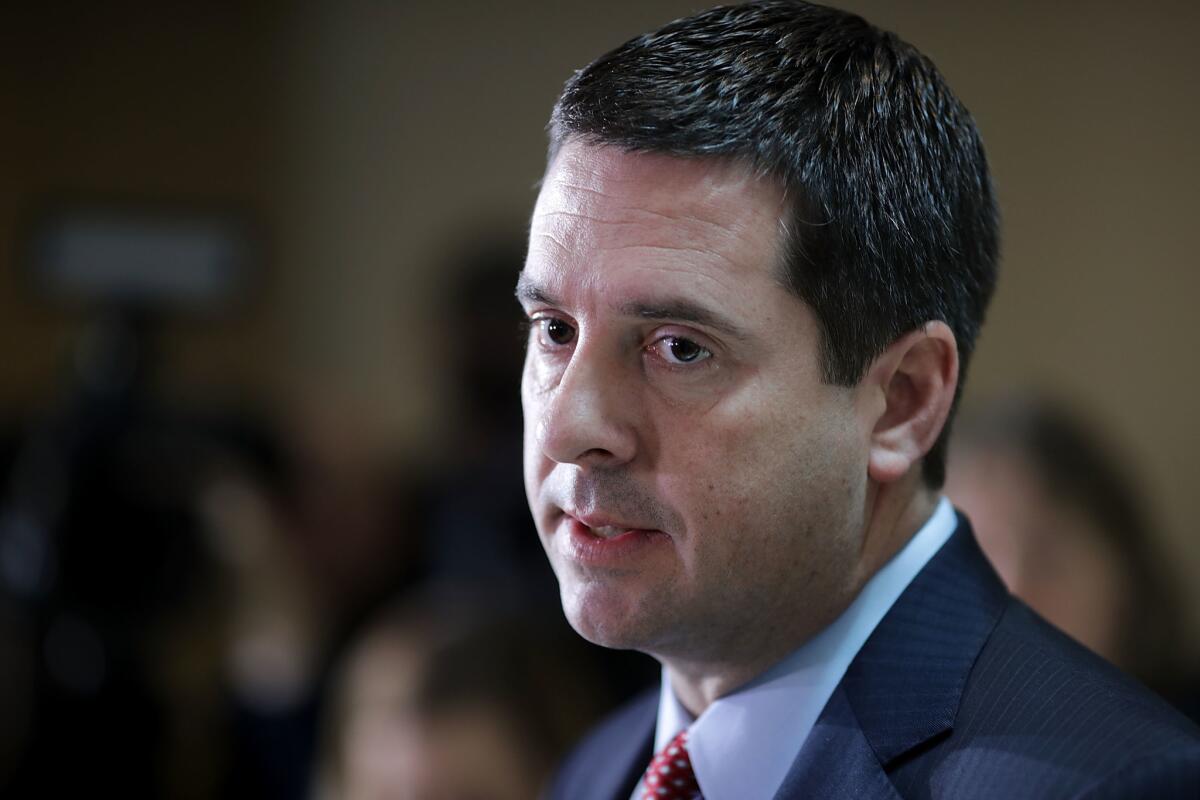
The disclosure by Rep. Devin Nunes (R-Tulare), chairman of the House Intelligence Committee, that communications by Trump transition members were inadvertently picked up by U.S. surveillance legally collecting foreign intelligence raises questions that are likely to consume Congress and the White House for months.
Among them:
Who in the Trump transition team was captured by the surveillance? That’s not clear. Nunes gave no names other than to say it was possible that then-President-elect Trump might have been mentioned in classified intelligence reports written at the time. Numerous transition officials could have communicated with foreign ambassadors or others in the United States who were under court-authorized surveillance for counter-intelligence purposes — and thus inadvertently, but legally, had their communications monitored by U.S. intelligence. White House Chief of Staff Reince Preibus, White House aide Stephen Miller, Trump’s son-in-law Jared Kushner and Trump’s adult children all played formal roles in Trump’s transition, along with many other Trump associates and former government officials. Nunes himself was a member of the transition executive committee.
Who were Trump transition members talking to? Again, Nunes didn’t say, except to note that the surveillance was not part of an ongoing FBI investigation into whether the Trump campaign coordinated with Russian authorities who were meddling in the election. In addition to foreign diplomats or other obvious contacts, the U.S. intelligence dragnet could include almost any person in the U.S. under court-approved surveillance who was in contact with transition officials or who claimed to have been in contact with Trump transition members.
What were they talking about? Again, Nunes didn’t say. But it’s most likely that the classified intelligence reports that Nunes cited discussed either attempts to influence the incoming Trump administration or policy changes that a foreign government was considering in response to Trump’s election. It’s also possible that the surveillance picked up discussions about business deals, though that is unlikely to generate intelligence reports unless the communications suggested a crime was being committed.
Was the surveillance done under a Foreign Intelligence Surveillance Act warrant? Nunes said it was, which suggests that the communications occurred between Trump transition officials and other people in the U.S, not overseas, since the National Security Agency doesn’t need a warrant to conduct eavesdropping overseas.
What are the requirements for obtaining a FISA warrant? The FBI asks a special federal court that conducts its proceedings in secret for such a warrant when it has reason to believe that someone in the U.S. is acting as an agent of a foreign power — in the worst-case scenario, conducting espionage against the U.S. But its also possible to get FISA warrants to intercept routine communications by ambassadors and other foreign officials in the U.S., which seems to be how Trump’s former national security advisor, Mike Flynn, was detected on phone calls with Russia’s ambassador last year.
Aren’t the identities of U.S. persons who are picked up inadvertently by surveillance supposed to be protected under the FISA law? Yes. But senior intelligence officials can decide to include their names or other identifying information in classified intelligence reports if they believe that doing so is important for understanding the intelligence, or if it shows clear evidence of a potential crime. This process, known as unmasking, could have happened with the Trump transition team. Nunes said it had, but Rep. Adam Schiff (D-Burbank) said that in most cases he had been told the identities were not unmasked but were obvious. So far, Flynn is the only member of Trump’s team who is known to have been picked up by the surveillance.
How did Nunes get the information? He said he got it from intelligence sources but did not identify them.
Does this mean President Trump was correct to claim on Twitter that he was wiretapped by President Obama? No. There is no evidence of a wiretap at Trump Tower and the intercepts were not aimed at Trump or his aides. They were aimed at foreign intelligence targets with whom they apparently were communicating. A president cannot order an FBI wiretap.
- What’s the impact of all this? At a minimum it has disrupted the House Intelligence Committee’s efforts to conduct a bipartisan investigation into Russia’s role in the election. Schiff, the ranking Democrat, was furious that Nunes held a news conference and then briefed the president on Wednesday. On Thursday, a committee aide said Nunes had apologized “for not sharing information about the documents he saw with the minority before going public” and that he “pledged to work with them on this issue.”
- Share via
Senate Democrats plan filibuster to stop Gorsuch confirmation to Supreme Court
Democrats plan a filibuster against Neil Gorsuch, President Trump’s nominee to the Supreme Court, setting up a Senate fight that they are almost certain to eventually lose.
The long-expected announcement of the filibuster plan came from Senate Minority Leader Charles E. Schumer (D-N.Y.). In a message on Twitter, Schumer said that Gorsuch would “face a cloture vote,” referring to the Senate process for filibusters.
Democratic vote counters are confident they have more than the 40 votes needed to sustain a filibuster, at least for a time. Currently, 48 senators caucus with the Democrats, including two who were elected as independents.
That leaves Senate Republicans with two paths they could use to confirm Gorsuch.
One option would be to have repeated cloture votes to test whether some Democrats, especially those from states carried by Trump in the presidential election, might break ranks after a symbolic vote or two.
The other option would be to move immediately to change Senate rules to allow a confirmation with only 51 votes.
Democrats already set the precedent for changing the rules in 2013, when they voted to require only a simple majority to confirm all presidential appointments other than Supreme Court justices. At the time, Republicans protested, but Majority Leader Mitch McConnell of Kentucky has strongly hinted he would follow suit if needed to get Gorsuch confirmed.
One issue for McConnell will be whether some veteran Republican senators are reluctant to change the filibuster rule without at least going through the motions of trying to gain 60 votes for cloture. McConnell has said he wants to get Gorsuch confirmed before the Senate takes its Easter recess, scheduled to begin April 6.
The move to a filibuster does not come as a surprise. Democratic senators have been under intense pressure from activist groups in the party to fight the Gorsuch nomination even if, ultimately, they’re doomed to lose.
- Share via
Russia inquiry threatened by claims that Trump’s team was named in foreign surveillance reports
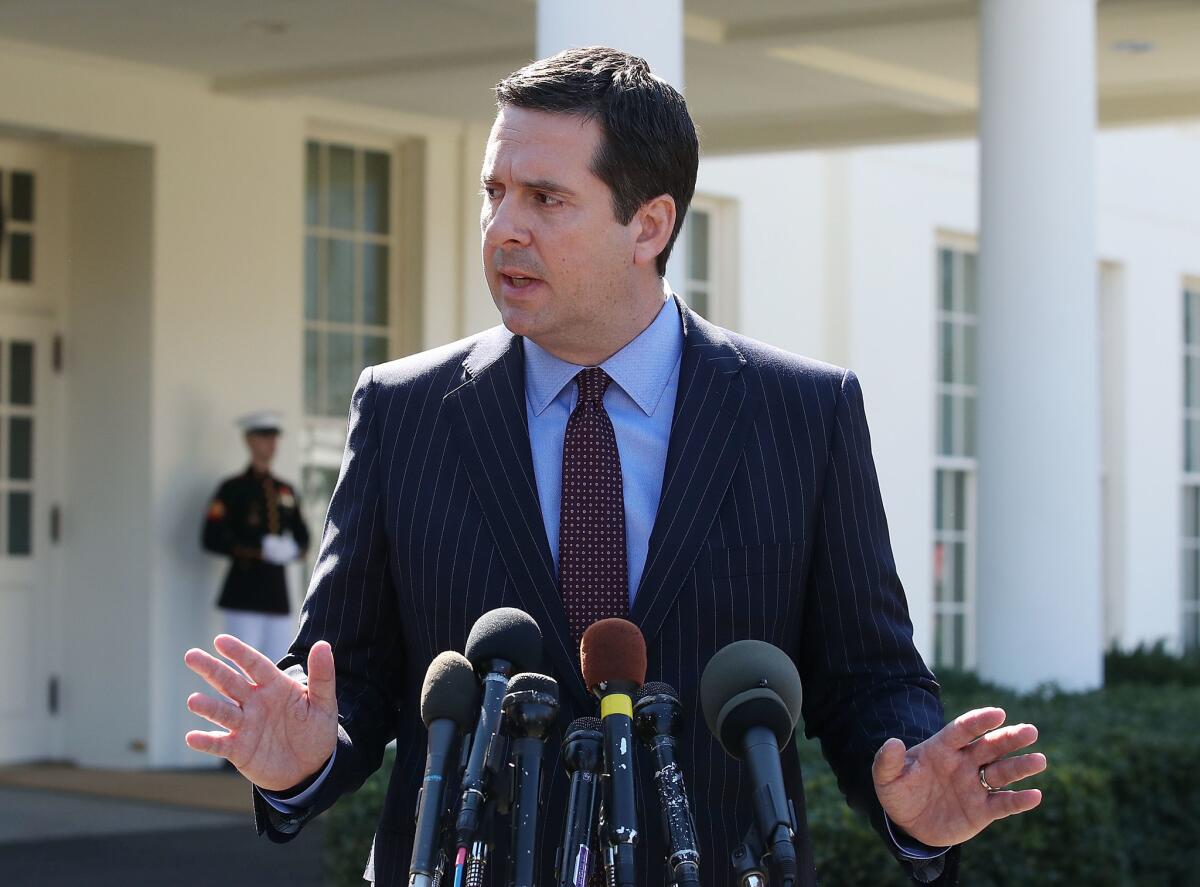
U.S. intelligence agencies inadvertently intercepted communications involving the Trump transition team late last year, the chairman of the House Intelligence Committee said Wednesday, a disclosure that President Trump said “somewhat” vindicated his claim that he was wiretapped by President Obama.
But Democrats immediately disputed that claim, asserting that the intercepts appeared to be court-authorized intelligence gathering that did not target Trump or his aides and may not have disclosed their names even in classified intelligence reports.
Rather than confirming Trump’s claims, the disclosures by Rep. Devin Nunes (R-Tulare), chairman of the House committee, sparked a political uproar that threatened to obliterate attempts to conduct a bipartisan congressional investigation into whether Trump campaign aides coordinated with Russian intelligence agencies during the 2016 presidential race.
- Share via
Obama defends Affordable Care Act as Republicans look to take first step in repeal
Former President Obama marked the anniversary of the Affordable Care Act with a robust defense of the law Republicans will seek to begin repealing Thursday.
In a lengthy written statement, Obama made no explicit mention of the action pending in the House. But he clearly contrasted the grueling process that ended with his signing the law seven years ago and the positive impact he said it has had with the aims of congressional Republicans and his successor today.
The health law was passed after a battle “carried out in congressional hearings and in the public square for more than a year,” Obama noted. By contrast, lawmakers still haven’t seen final text of the bill scheduled to be voted on Thursday night in the House. It is still the subject of a furious round of last-minute negotiations between President Trump and House conservatives.
Obama listed key new protections guaranteed in the current law — coverage for those with preexisting conditions, lower costs for prescription drugs for seniors and free preventive care — all of which could be stripped now.
The Democrat also took on common GOP talking points about “Obamacare.”
“Reality continues to discredit the false claim that this law is in a ‘death spiral,’ ” he wrote. And “this law is no ‘job-killer,’ ” he added, pointing to a record streak of job growth.
Obama conceded that improvements could be made to further reduce costs and stabilize markets.
“If Republicans are serious about lowering costs while expanding coverage to those who need it, and if they’re prepared to work with Democrats and objective evaluators in finding solutions that accomplish those goals — that’s something we all should welcome,” Obama said. “But we should start from the baseline that any changes will make our health care system better, not worse, for hardworking Americans.”
Obama’s statement concluded by noting the grassroots efforts that were key in helping build support for his legislation, and noting Americans “who love their country still have the power” to support its goals today.
- Share via
Trump’s awkward alliance with Ryan faces biggest test: Will healthcare vote bind or push them apart?

President Trump and House Speaker Paul D. Ryan are staring at a moment that could define or derail their tenures, with the vote on the GOP measure to repeal and replace Obamacare approaching and the tally seemingly moving against them.
The two are not natural allies, something that was clear during the presidential campaign. As any number of Trump controversies swirled, particularly those that raised questions about the nominee’s temperament and judgment, Ryan (R-Wis.) did his best to keep his party’s standard-bearer at arm’s length.
But they began working closely after Trump’s victory in November to set a strategy for their legislative agenda.
Healthcare was the first big item — the bill that would fulfill a central campaign promise for the GOP and open the way to other priorities, including a major tax cut.
Now, however, the outcome of the healthcare vote, scheduled for Thursday evening, appears very much in doubt.
- Share via
Federal elections commissioner wants Trump to back up his allegations of voter fraud
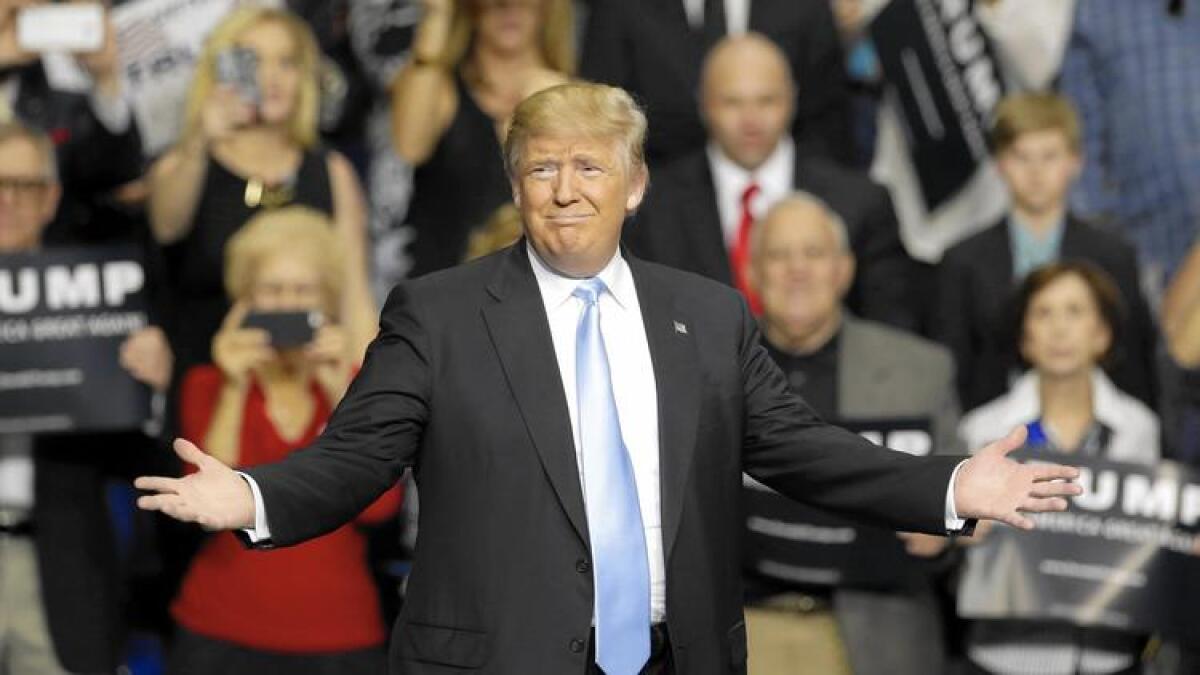
The questions about President Trump’s allegations of widespread voter fraud are not going away.
Ellen Weintraub, a Democratic commissioner at the agency, sent Trump a scathing letter Wednesday, calling on the president to produce evidence that illegal ballots were cast in last year’s election.
“This allegation of a vast conspiracy … has deeply disturbed citizens throughout America,” she wrote. “Our democracy depends on the American people’s faith in our elections. Your voter fraud allegations run the risk of undermining that faith.”
In January, days after he entered the White House, Trump said that between 3 million and 5 million illegal votes were cast in the November presidential election. He told members of Congress that he lost New Hampshire because “thousands” of people came from neighboring Massachusetts and voted illegally. White House officials at the time said the claim was based on studies and evidence presented to the president.
The administration has produced no evidence to back up these claims.
“Facts matter, Mr. President,” Weintraub wrote. “The American people deserve to see your evidence.”
Trump, who lost the popular vote to Hillary Clinton, has called for an investigation into voter fraud, but nothing formal has been launched.
In December, researchers at Dartmouth College conducted a study of abnormal voting patterns in the 2016 election. They looked into voting by noncitizens and the dead, among other things, and found no evidence to support Trump’s claims. After his statements about New Hampshire, the researchers homed in on voting there and found no irregularities.
Nationwide, Republican and Democratic elections officials said that voter fraud is rare and that it did not affect their states’ results.
Weintraub has drawn criticism from the nonprofit group Cause of Action Institute, which said that allegations of voter fraud fall outside the campaign finance jurisdiction of the FEC, an independent regulatory agency that focuses on campaign finance rules.
“This is not how the FEC operates,” James Valvo, a senior policy advisor for the group, told the Washington Post. “There are procedures in place for the agency to investigate allegations of violations of federal campaign finance law. Those procedures do not include individual commissioners sending public letters demanding evidence.”
- Share via
Schiff says Nunes can’t lead Russia inquiry and be a Trump surrogate
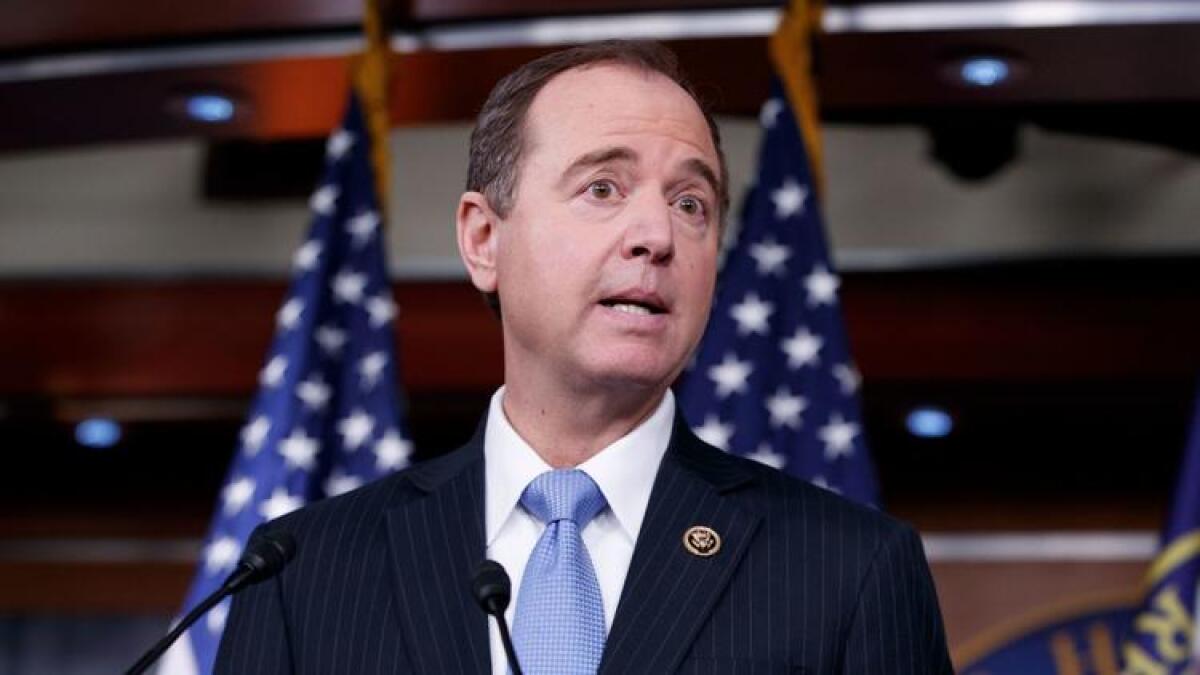
House Intelligence Committee Chairman Devin Nunes (R-Tulare) has risked undermining the credibility of the panel’s investigation of Russian interference of the 2016 election by sharing new information with the White House, his Democratic counterpart said Wednesday.
By briefing the public and then President Trump about intercepted communications involving members of the transition team, but not other members of the committee involved in the investigation, Nunes cast “quite a profound cloud over our ability to do our work,” Rep. Adam B. Schiff (D-Burbank) told reporters.
“The chairman will either need to decide if he’s leading an investigation into conduct which includes allegations of potential coordination between the Trump campaign and the Russians, or he is going to act as a surrogate of the White House. Because he cannot do both,” Schiff said at a Capitol Hill news conference.
The assessment, even if delivered in Schiff’s typically understated fashion, reflected a potential breakdown in what is traditionally a nonpartisan partnership between the top Republican and Democrat on the Intelligence Committee.
It was all the more striking given that both men have served together for more than a decade in the same state congressional delegation.
Schiff said he raised his concerns directly with Nunes after the Republican disclosed new information publicly and then to the White House. He stopped short of saying whether Nunes was improperly making classified information public, saying instead that his actions were “beyond irregular.”
Nunes’ actions further demonstrated the need for an independent inquiry into Russia’s actions during the campaign, Schiff said.
“We’re the only investigation there is. If we don’t do it, no one is going to do it,” Schiff said. “Now, perhaps the White House would like it that way. But the American people, I think, want there to be a credible investigation. And if we’re not going to conduct it, then we need to have an independent commission do it.”
- Share via
Trump says he feels ‘somewhat’ vindicated by spying revelations from Rep. Devin Nunes
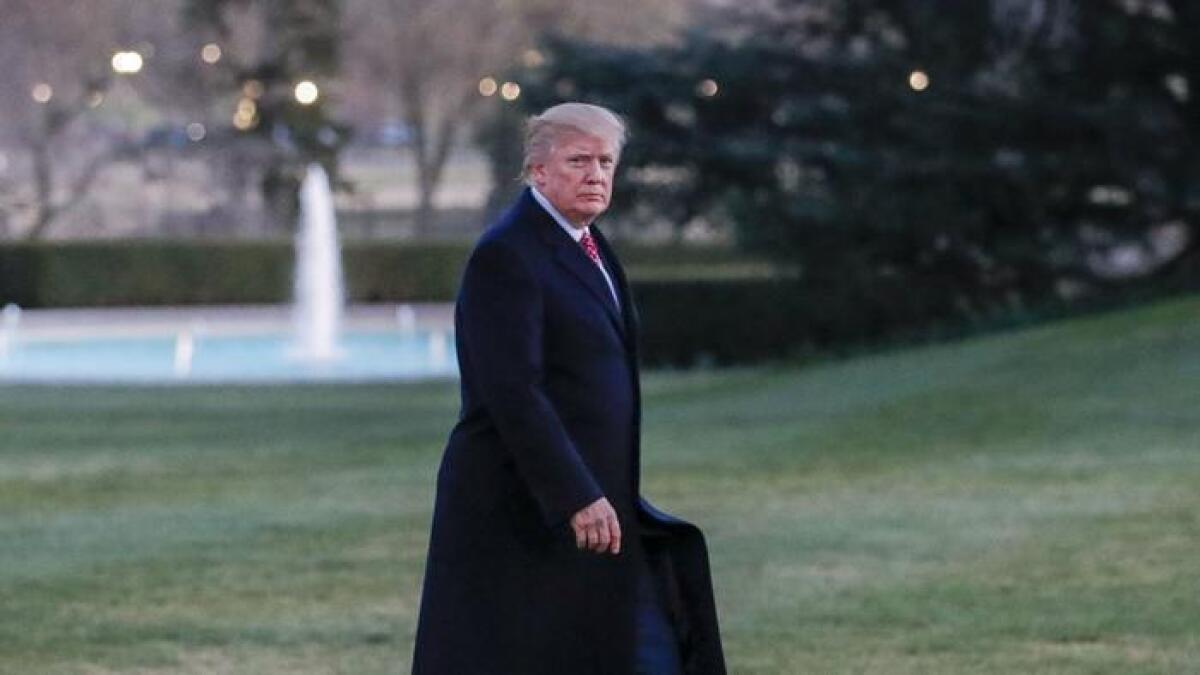
President Trump said he felt “somewhat” vindicated by revelations from the Republican chairman of the House Intelligence Committee that U.S. intelligence agencies may have picked up communications involving members of his transition team late last year.
While the intelligence reports do not back up Trump’s unsubstantiated claim that former President Obama had wiretapped Trump Tower, they apparently show that Trump and his associates may have been named in classified reports circulated in the weeks before Trump took office, Rep. Devin Nunes (R-Tulare) told reporters Wednesday.
Nunes visited Trump at the White House on Wednesday afternoon to tell him about dozens of intelligence reports from the CIA, FBI and National Security Agency he had seen. He said he reports included information about communications by Trump and those working for him in the transition.
The surveillance appears to have been conducted with legal authorizations, Nunes said, and the Trump team was not the intelligence target.
But Nunes said he was uncomfortable that intelligence officials were circulating reports that identified people close to Trump, or perhaps the president-elect himself, without having a clear foreign intelligence justification.
“What I’ve read bothers me, and I think it should bother the president himself and his team,” Nunes said outside the West Wing.
When asked by a reporter whether he felt vindicated by what Nunes had said, Trump said: “I somewhat do. I must tell you I somewhat do. I very much appreciated the fact that they found what they found,” Trump said.
Nunes told reporters at the White House that intelligence officials had brought the information to him “through the proper channels,” and he is concerned that some of the information collected may not have been handled properly.
When asked whether what he found meant that Obama ordered phones in Trump Tower to be wiretapped, as Trump had alleged, Nunes said simply: “That never happened.”
- Share via
Top Democrat on House Intelligence Committee has ‘grave concerns’ about handling of Trump team intercepts
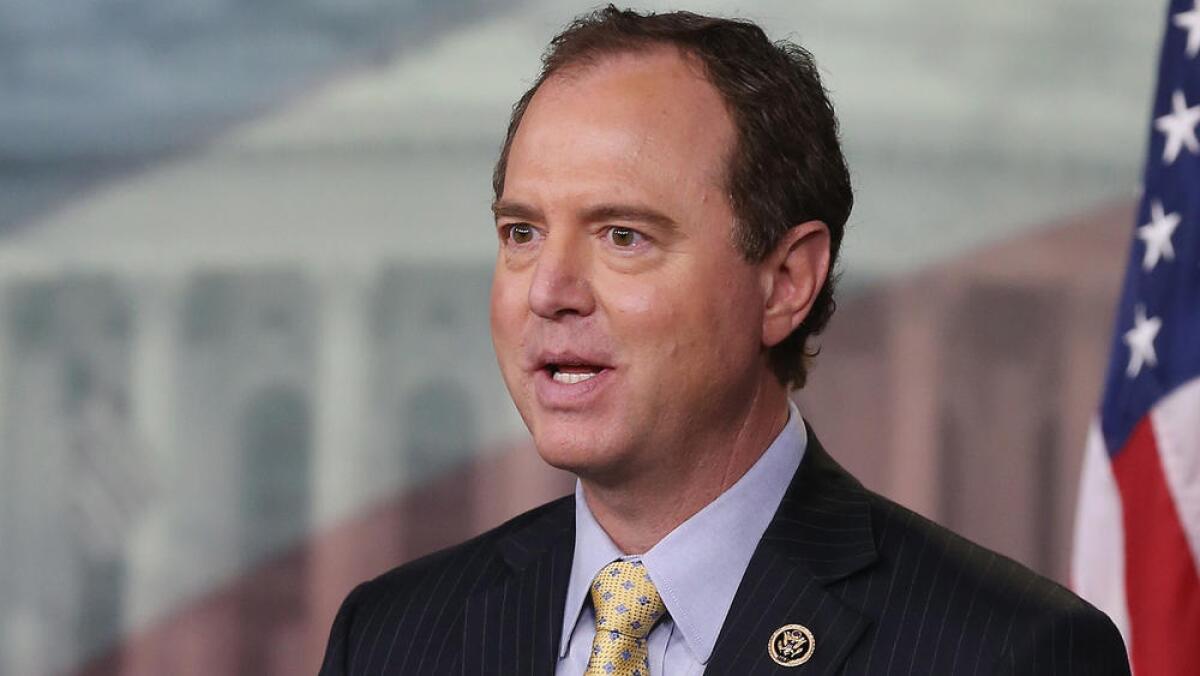
Rep. Adam B. Schiff (D-Burbank) said in a statement he had “grave concerns” about revelations made Wednesday by Rep. Devin Nunes (R-Tulare).
Nunes told reporters that U.S. intelligence agencies monitoring foreign targets hd incidentally heard communications involving members of the Trump transition team and that reports about those communications were disseminated around the government.
Nunes is chairman of the House Intelligence Committee and Schiff is the panel’s ranking Democrat.
Schiff called Nunes’ decision to talk to the media and the White House -- before speaking to him and the rest of the committee -- a “profound irregularity.”
Here is Schiff’s statement:
“This afternoon, Chairman Devin Nunes announced he had some form of intercepts revealing that lawfully gathered intelligence on foreign officials included information on U.S. persons, potentially including those associated with President Trump or the president himself. If accurate, this information should have been shared with members of the committee, but it has not been. Indeed, it appears that committee members only learned about this when the chairman discussed the matter this afternoon with the press. The chairman also shared this information with the White House before providing it to the committee, another profound irregularity, given that the matter is currently under investigation. I have expressed my grave concerns with the chairman that a credible investigation cannot be conducted this way.
“As to the substance of what the chairman has alleged, if the information was lawfully gathered intelligence on foreign officials, that would mean that U.S. persons would not have been the subject of surveillance. In my conversation late this afternoon, the chairman informed me that most of the names in the intercepted communications were in fact masked, but that he could still figure out the probable identity of the parties. Again, this does not indicate that there was any flaw in the procedures followed by the intelligence agencies. Moreover, the unmasking of a U.S. person’s name is fully appropriate when it is necessary to understand the context of collected foreign intelligence information.
“Because the committee has still not been provided the intercepts in the possession of the chairman, it is impossible to evaluate the chairman’s claims. It certainly does not suggest -- in any way -- that the president was wiretapped by his predecessor.”
- Share via
GOP healthcare bill in serious jeopardy as dozens of Republican lawmakers withhold support
The Republican bill to repeal and replace Obamacare hit serious trouble Wednesday, with more than 30 GOP House members -- more than enough to sink it -- refusing to back the proposal.
With the vote count looking uncertain at best, Speaker Paul D. Ryan (R-Wis.) now must decide whether to push forward with plans to vote on Thursday or put it off to allow more time for negotiations.
The White House stepped up its efforts to sway resistant lawmakers, including meetings with President Trump and other officials.
So far, however, those appeals appeared unable to sway enough votes for the bill to gain a majority. Assuming that all the chamber’s Democratic members vote against the bill, Republicans can afford to lose 21 from their ranks.
The White House insisted, though, that Thursday’s vote was on, setting up a potential showdown with opponents.
“If you want to see Obamacare repealed and replaced, this is the vote, this is the time to act,” said Trump Press Secretary Sean Spicer. “There is no Plan B,” he said.
Republican hold a majority in the House and Senate but lawmakers have struggled to agree on legislation to replace the Affordable Care Act, also called Obamacare. Many conservatives say the bill doesn’t go far enough to repeal Obamacare, while some centrists fear it goes too far and will deprive too many people of health coverage.
Conservatives claimed they have the votes to defeat the measure.
“We easily have enough votes -- with a buffer -- to kill this legislation unless it’s substantially improved,” Rep. Mo Brooks (R-Ala.) said as he emerged from a private meeting of the conservative Freedom Caucus.
Caucus members appeared unmoved after a lengthy meeting at the White House with Vice President Mike Pence and other top administration officials, including White House advisors Stephen Bannon and Kellyanne Conway and Chief of Staff Reince Priebus.
“We still haven’t seen the movement we want,” Rep. Scott DesJarlais (R-Tenn.) said afterward.
Brooks dismissed the session as a “rah-rah” meeting.
“It’s ‘we really need you to help. It’s a part of a team effort. This is part of a sequence of events,’ those kinds of things, when really what we need is a healthcare bill that’s going to lower premiums for the people of America.”
Trump didn’t appear to do much better. The president met with 10 reluctant lawmakers brought in by the GOP whip’s team to win their support, and he met the day before with members of the more centrist Tuesday Group.
“I don’t know that anybody changed their mind,” said Rep. Charlie Dent (R-Pa.), a co-chairman of the Tuesday Group.
“I went into the meeting with serious reservations about the bill, and I still have serious reservations about the bill,” Dent said.
Rep. Adam Kinzinger (R-Ill.) said the president was very engaged and asked a lot of questions.
“There were people with concerns in there, and as they voiced them, he did everything he could to address them,” said Kinzinger, who was also in the Tuesday Group session.
“It’s obviously a huge, deep issue, so I don’t know if anybody was swayed.”
Conservative opponents are demanding, among other things, legislative language that would undo requirements for the level of benefits that insurers have to provide. Such rules are too restrictive, and looser policies would reduce insurance premiums, they argue.
At the same time, more moderate Republicans are worried that too many of their constituents will lose access to care because of the bill’s rollback of coverage under Medicaid, the safety net program for low-income, disabled and older Americans.
Other Republicans are also concerned that they are being asked to vote on changes to the bill without updated analysis from the nonpartisan Congressional Budget Office. Earlier this month, the budget office said that the number of Americans without insurance would rise by as much as 24 million over the next 10 years if the bill becomes law.
Meanwhile, protesters trying to save Obamacare rallied both inside and outside the Capitol on Wednesday.
Former Vice President Joe Biden joined Democrats on the East Front of the Capitol to celebrate the seventh anniversary of the law’s passage.
- Share via
Trump Labor nominee Acosta frustrates Democrats by dodging questions at confirmation hearing
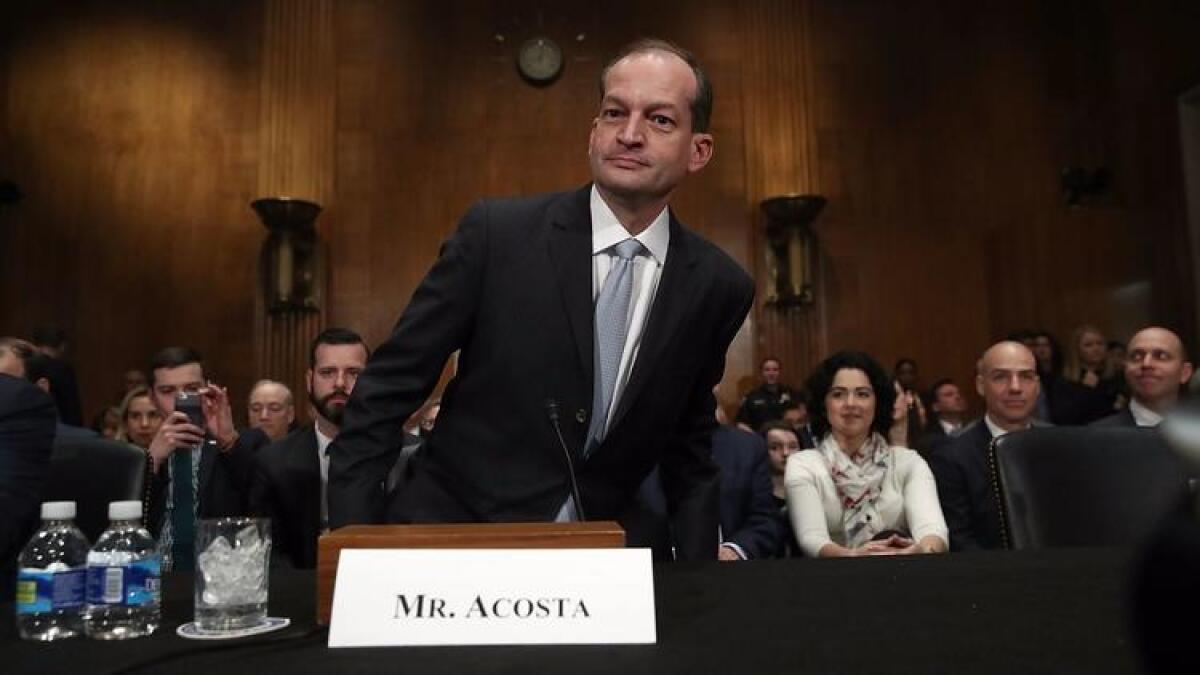
President Donald Trump’s second nominee for Labor secretary, law school dean R. Alexander Acosta, frustrated Democrats at his Senate confirmation hearing Wednesday by dodging questions about how he would handle some key workplace rules enacted by the Obama administration.
But Acosta, a former Justice Department official, had strong support from Republicans during the hearing before the Senate Health, Education, Labor and Pensions Committee, and he appeared on track for confirmation.
That was a sharp contrast to Trump’s first pick for the job, Southern California fast-food executive Andy Puzder, who withdrew last month after some GOP senators balked at voting for him amid a series of controversies. On Tuesday, Puzder said he is stepping down as chief executive of CKE Restaurants.
Acosta is a much more conventional pick than the outspoken and flamboyant Puzder. The dean of the law school at Florida International University in Miami since 2009, Acosta acted like a lawyer in cautiously answering some tough questions.
- Share via
Trump transition communications were swept up in U.S. spying on foreign targets, Rep. Nunes says

U.S. intelligence agencies picked up communications involving members of the Trump transition team late last year and reports of the conversations were circulated within the government, the chairman of the House Intelligence Committee said Wednesday.
“I recently confirmed that on numerous occasions, the intelligence community collected information on U.S. individuals involved in the Trump transition,” Rep. Devin Nunes (R-Tulare) told reporters.
The eavesdropping appears to have been legal and inadvertently picked up Trump associates because they were communicating with individuals under government surveillance, Nunes suggested.
The surveillance was apparently unrelated to an ongoing FBI counterintelligence investigation into whether Trump campaign aides coordinated with Russian intelligence agencies that sought to interfere in the 2016 presidential race, Nunes said.
“Details about U.S. persons involved in the incoming administration with little or no apparent foreign intelligence value were widely disseminated in intelligence community reports,” he said.
Under the law, identities of Americans whose communications are picked up by intelligence eavesdropping of foreign targets are supposed to be kept confidential unless the conversations relate to espionage or some other potential crime that warrants further investigation.
FBI Director James B. Comey and National Security Agency Director Adm. Michael Rogers testified to Nunes’ committee on Monday that they had “no information” to back up President Trump’s claims in several tweets this month that President Obama had ordered wiretaps against him.
Nunes and other Republicans used the five-hour hearing to argue that leaks of classified information, especially those involving U.S. surveillance, were a threat to national security and should be prosecuted.
They repeatedly cited the case of Michael Flynn, who was ousted as Trump’s national security advisor last month after news reports disclosed that he had misled Vice President Mike Pence about phone conversations with the Russian ambassador, Sergey Kislyak.
The calls were picked up by U.S. surveillance targeting the Russian envoy, and a description of the contents were leaked to the Washington Post after the Justice Department warned the White House that Flynn could be subject to blackmail.
Nunes said “sources,” whom he did not identify, provided him the information about communications intercepts involving Trump transition members.
- Share via
In rebuff to high court nominee Neil Gorsuch, Supreme Court rules for children with autism
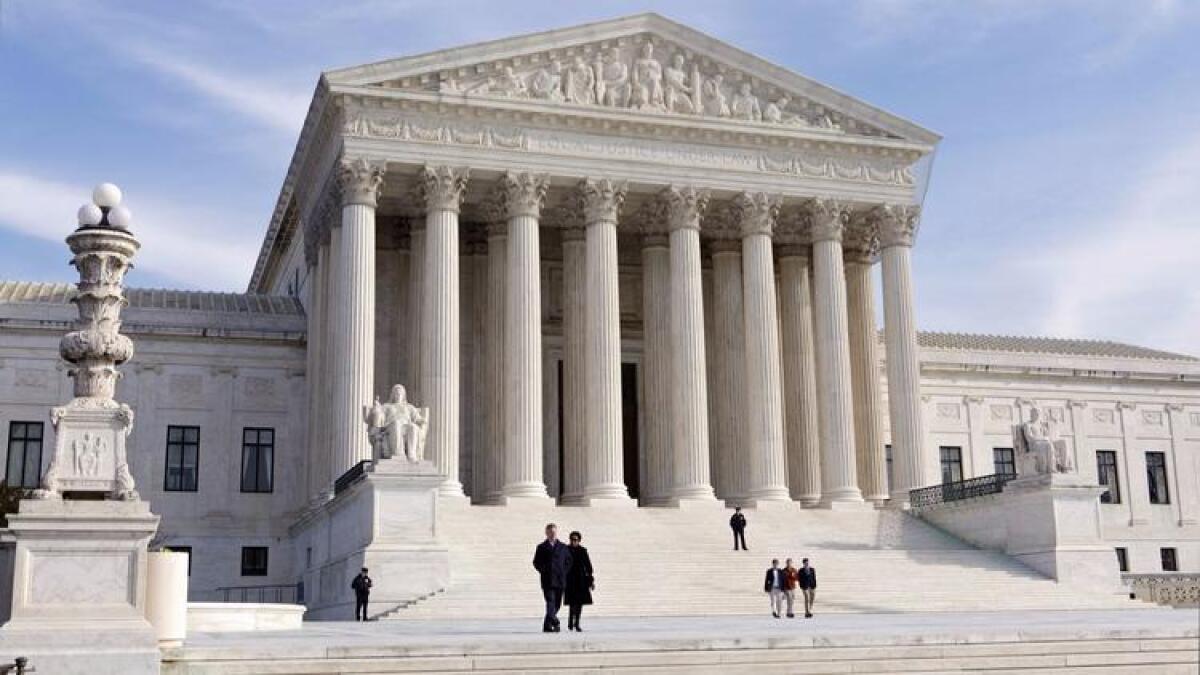
A unanimous Supreme Court strengthened the rights of nearly 7 million schoolchildren with disabilities Wednesday and did so by rejecting a lower standard set by Judge Neil M. Gorsuch.
The ruling, one of the most important of this term, came as President Trump’s Supreme Court nominee is wrapping up his third day of testimony before a Senate committee.
Justices ruled for the parents of Endrew F., a Colorado boy with autism who pulled their son from the public school after his progress “essentially stalled.”
They enrolled him in a private academy that specialized in autism, where his behavior and learning improved markedly. They then sued the school district for a reimbursement, alleging a violation of the federal law that promises a “free appropriate public education” to children with disabilities.
Chief Justice John G. Roberts Jr. said the school district had not met its duty under the law. Children like Endrew F. have a right to an “educational program that is reasonably calculated to enable [them] to make progress,” he said. And the learning program “must be appropriately ambitious in light of” the child’s capabilities.
This stand “is markedly more demanding than the ‘merely more than de minimus’ test applied by the 10th Circuit,” he said, including a 2008 opinion written by Gorsuch. Under that standard, a school need show only that it was providing a minimal special program with some level of benefit.
The high court did not mention Gorsuch’s opinion in the earlier case, but it reversed a 10th Circuit ruling that had relied on it.
Asked about the issue on Wednesday, Gorsuch said he was a part of a unanimous three-judge panel that had sought to follow a Supreme Court standard set in 1982.
Several liberal groups described the court’s decision as a direct rebuke of Gorsuch.
However, Senate Judiciary Committee Chairman Charles E. Grassley (R-Iowa) noted that Gorsuch was not part of the three-judge panel whose ruling was directly reversed in the court’s decision in Endrew F. vs. Douglas County.
- Share via
About that stinging WSJ editorial targeting Trump
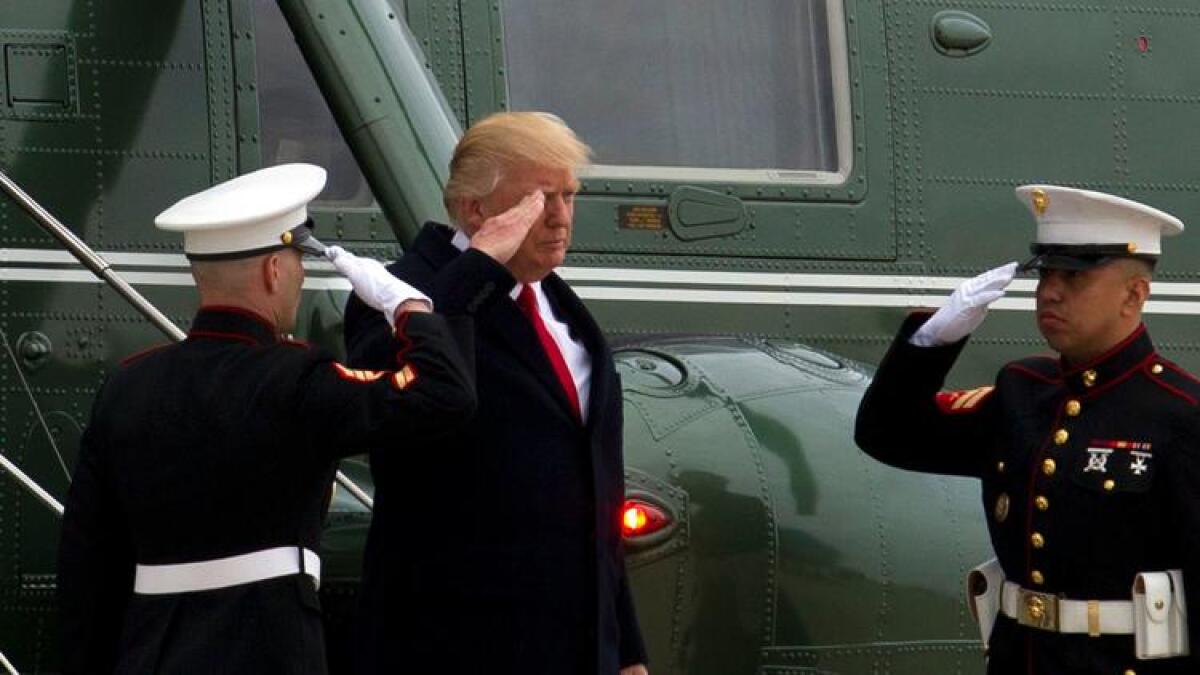
President Trump claimed that his phones were tapped by President Obama ahead of last year’s election.
False.
It’s an assertion first debunked last week by a bipartisan Senate panel, then this week by FBI Director James B. Comey.
Naturally, one might assume Trump would walk back those comments – someway, somehow. But that’s not Trump. It’s never been his style.
Instead, at least for now, the White House is not offering much else in terms of comment, even as some on Capitol Hill are calling on Trump to apologize to Obama.
And even some conservative media appear fed up with the unfounded claim.
Here are some of today’s headlines:
A president’s credibility (The Wall Street Journal)
Rupert Murdoch, owner of the Wall Street Journal, is friends with Trump.
That did not prevent the editorial board from delivering a powerful blow to Trump, assailing him on Wednesday for holding on to his claims that Obama wiretapped his phones.
“He has offered no evidence for his claim, and a parade of intelligence officials, senior Republicans and Democrats have since said they have seen no such evidence,” wrote the editorial board. “Yet the President clings to his assertion like a drunk to an empty gin bottle, rolling out his press spokesman to make more dubious claims.”
Ouch.
And some Trump allies are feeling the sting.
“It does hurt,” Rep. Pete Sessions of Texas said on CNN when asked about the editorial. “It hurts a lot not only for my party but for people to have a sobering look at what others are saying.”
Democrats always loved the Russians (Rush Limbaugh)
Even as an FBI investigation is well underway into possible collusion between Trump aides and Russians during the campaign, many conservatives have dismissed it as a witch hunt by Democrats.
Conservative talk radio host Rush Limbaugh is one of them.
“Given that the Democrat party has no history of disliking the Soviet Union, the Democrat party has no history of opposing the Soviet Union or Russia, we are being asked now to believe that the Russians wished to influence a U.S. presidential election,” Limbaugh argued.
He added, wryly, “This master stroke of statecraft by Putin was designed, however, to bring to power a man, Donald J. Trump, who has pledged to rebuild the United States militarily and economically.”
AHCA earns backing of prominent pro-life groups (TownHall)
The big vote is looming on Thursday, and – as of now – the Republican plan to replace Obamacare doesn’t appear to have enough votes to pass.
Still, some groups, such as the staunchly anti-abortion National Right to Life Committee, are backing it.
This piece notes the group recently penned a letter to members of Congress touting its support.
The group, in its letter, voiced support for the bill because it “contains the following essential provisions: 1) prevents federal tax credits from being used for plans that pay for abortions, 2) preserves non-taxed employer-provided health plans, 3) postpones the ‘Cadillac tax’ until 2025 and 4) eliminates roughly 89% of federal Planned Parenthood funding for the next year.”
We’ll see if it passes on Thursday.
- Share via
Feinstein says Gorsuch dodges specifics ‘like no one I have seen before’
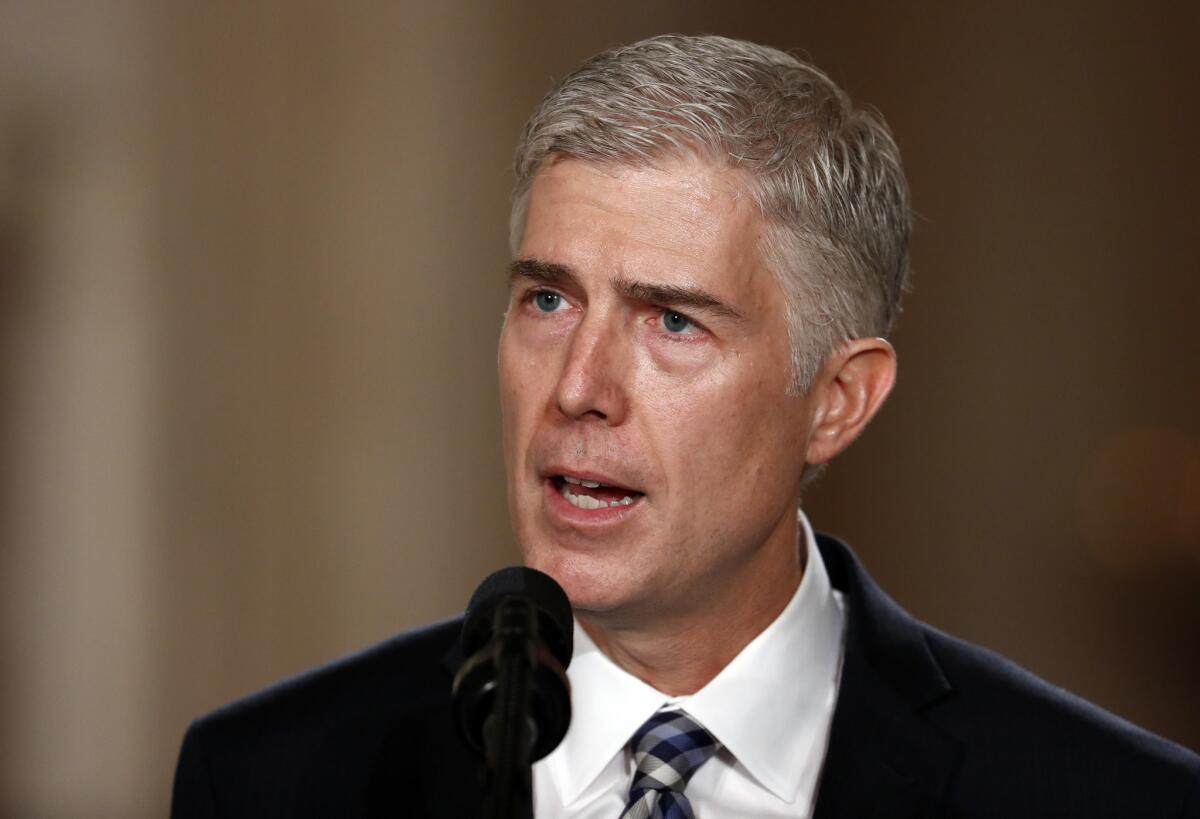
Conservatives are enamored with Supreme Court nominee Neil M. Gorsuch because he has declared himself a staunch originalist, much like the man he would replace on the court, the late Justice Antonin Scalia.
But Sen. Dianne Feinstein asked Gorsuch to articulate how far he would go in pursuing a philosophy that rejects the idea that the Constitution is a living, breathing document that evolves with society.
Feinstein demanded to know whether Gorsuch’s view of originalism leaves room for gay rights, women’s rights or the right to abortion. She told of having to sentence women to prison for abortion when she was a member of the California Women’s Parole Board, of suicides of women who could not get abortions when they were illegal and of cases of women passing around a donation plate so friends could travel to Tijuana for the procedure.
“We are still fighting for equal pay, equal work,” Feinstein went on. “And it goes on and on, and as women take their place in the workplace, in society … life changes. And the originalism of the days when the Constitution was written … don’t bring somebody forward, they bring them backward.”
Gorsuch sought to assure Feinstein that “no one is looking to return us to horse-and-buggy days. We’re trying to interpret the law faithfully, taking principles that are enduring and a Constitution that was meant to last ages and apply it and interpret it to today’s problems.”
He pointed to cases like one involving searches of homes with heat-seeking devices, where originalist judges seek to invoke “neutral principles, the law to apply it to current realities, not to drag us back to a past, but to move forward together as judges applying the law neutrally.”
Feinstein was not persuaded. She expressed frustration at how vague Gorsuch has been on every issue that might come before the court, saying, “You have been very much able to avoid any specificity, like no one I have seen before.”
When Gorsuch repeated his assertion that he is loath to overturn precedent — which presumably would include the precedent established in Roe vs. Wade that women have a right to abortion — Feinstein pointed out how she has heard similar remarks from previous GOP nominees who then became antiabortion votes once on the court.
“For the life of me, I really don’t know when you’re there what you’re going to do.… As you say, this isn’t text. This is real life. And young women take everything for granted today. And all of that could be struck out with one decision.”
- Share via
Tillerson meets with coalition nations to discuss strategy against Islamic State
The Trump administration will publicly assess its strategy against Islamic State for the first time Wednesday in a State Department summit with the 68 nations in the U.S.-led coalition against the militant group.
The meeting, hosted by Secretary of State Rex Tillerson, comes days after visiting Iraqi Prime Minister Haider Abadi won assurances from President Trump about more U.S. support in the war against Islamic State that has been raging for nearly three years.
In his opening remarks, Tillerson said the coalition had managed to reclaim large parts of Iraq and Syria from the militants even as intense fighting continues in some areas.
“Our end goal in this phase is the regional elimination of ISIS through military force,” he said, using an acronym for the terror group.
In a speech to Congress last month, Trump said he had asked the Defense Department for a plan to “demolish and defeat” Islamic State, but he has not rolled out a new strategy.
The Pentagon has about 5,200 troops in Iraq and 1,000 in Syria. They rely on Iraqi security forces and Kurdish guerrillas in Iraq, and U.S.-backed rebel militias in Syria, to carry out combat operations, while the U.S. and its allies provide intelligence, launch airstrikes and fire artillery to support the ground attacks.
Over the last year, the combined attacks have pushed out the Sunni militants from most major cities in Iraq. Despite a five-month U.S.-backed assault, heavy fighting is still underway to retake the group’s remaining stronghold in Mosul, Iraq’s second largest city.
The challenge is tougher in Syria, where the Pentagon has backed the Syrian Democratic Forces, a coalition of mostly Kurdish rebel groups that operates chiefly in northern Syria. Preparations are underway for an assault on the Islamic States’ self-declared capital of Raqqah.
Long-term challenges will be to rebuild the cities and towns destroyed by Islamic State during their occupation, or by coalition bombardments that sought to dislodge them.
Tillerson will ask other coalition nations to invest in the recaptured areas and to help provide humanitarian aid and other resources for the millions of people displaced in the fighting.
“We will continue to facilitate the return of people to their homes and work with local political leadership,” he said Wednesday.
“They will provide stable and fair governance, rebuild infrastructure and provide essential services,” he added. “We will use our diplomatic presence on the ground to facilitate channels of dialogue between local leadership and coalition partners.”
- Share via
Supreme Court nominee Neil Gorsuch says defending waterboarding was just part of his job as a lawyer
Sen. Dianne Feinstein on Wednesday returned to aggressively questioning Supreme Court nominee Neil M. Gorsuch about his apparent defense of waterboarding and other such interrogation tactics while he was working in the administration of George W. Bush.
Her questions focused on a set of talking points the nominee had prepared for former Atty. Gen. Alberto Gonzales in 2005 that asked whether “aggressive interrogation techniques employed by the administration yielded any valuable information.” In the margin, Gorsuch had written, “Yes.”
Watch live: Confirmation hearing for Supreme Court nominee Neil Gorsuch
Gorsuch demurred on Tuesday when Feinstein pressed him on what information he had showing that the techniques were effective, a finding that was contradicted by a 7,000-page report congressional investigators published on the issue. He asked for time to review the talking points in question.
When Feinstein brought the issue up again Wednesday, Gorsuch was prepared with an answer. He said he didn’t necessarily have any evidence to back up what was in the document.
“That was the position the clients were telling us,” he said. “I was a lawyer. My job was as an advocate. We were dealing with detainee litigation.”
Feinstein was unimpressed.
“It seems to me that people who advise have an obligation to find the truth in these situations,” said Feinstein, who helped lead an exhaustive bipartisan probe of American use of the torture tactics. “When we looked into it, we really saw the horrendous nature of what went on. … This is America. It is not what we stand for.”
- Share via
After a day of trying to close the deal, Trump remains short on healthcare votes
Despite President Trump’s personal appeals to lawmakers, the fate of the Republican healthcare bill remained uncertain Tuesday, as the fraught relationship between the president and congressional Republicans faces what could be a defining test.
“Honestly, a loss is not acceptable, folks,” Trump warned lawmakers, bluntly telling fellow Republicans that failure to pass the bill to repeal much of the Affordable Care Act could cost the GOP its majorities in the House and Senate.
The morning strategy session at the Capitol was the first time in his two months as president that Trump met with almost the full House Republican Conference that was elected with him in November. The membership reflects the disparate coalition of Republicans who aligned to make him their standard-bearer last year.
The question for the party now is whether that ideologically diverse group can govern.
- Share via
Under fire over Russia investigation, White House officials choose to change the subject
After the heads of the FBI and the National Security Agency denied President Trump’s claim that then-President Obama had wiretapped him, Trump’s Twitter account provided the best clue to how the White House would respond: Tuesday morning, it was silent on the subject.
Trump had started the day Monday with a tweet storm defending himself against allegations that his campaign had cooperated with Russian efforts to affect the 2016 election. He’s spent days quadrupling down on his unsubstantiated insistence that Obama had surveilled Trump Tower in New York.
But that sometimes-manic flurry of counterpunches has done little if anything to help the president, who has been frustrated by how controversies get in the way of his agenda, even as his own words often keep those controversies alive.
Some of Trump’s advisors think House Republicans could have done a more forceful job at Monday’s hearing of defending the president. Democrats spent much of the hearing laying out the circumstantial evidence for improper contacts between Trump aides and Russian officials.
Rather than lash out or try to rebut the Democrats’ case, however, White House aides have counseled the president to change the subject and talk about his sales pitch to members of Congress on healthcare and his Supreme Court nominee.
- Share via
How the phony conspiracy theory over wiretapping caught fire
When Michael Flynn, President Trump’s short-lived national security advisor, resigned last month, Mark Levin was outraged.
Not because Flynn had falsely denied speaking with the Russian ambassador about U.S. sanctions before Trump took office. Rather, the conservative talk radio host was furious that U.S. surveillance had picked up Flynn’s venture into freelance diplomacy.
“How many phone calls of Donald Trump, if any, have been intercepted by the administration and recorded by the Obama administration?” Levin demanded on his program, which reaches millions nationwide. “This, ladies and gentlemen, is the real scandal.”
With that, what began as rumors and unverified accounts percolating through right-wing media coalesced into a wild conspiracy theory adopted by a president with an itchy Twitter finger, a penchant for intrigue and eagerness to embrace information — however sketchy — that reinforces, rather than tests, his beliefs.
Trump’s unfounded claim that President Obama had wiretapped his telephone ricocheted throughout the country, shook Washington and stunned disbelieving U.S. allies. The fallout continues to rattle the embryonic Trump White House.
- Share via
The GOP drive to repeal Obamacare could snuff out a quiet revolution in how U.S. cities care for their poor
Over the last four years, this city at the foot of the Rocky Mountains has quietly transformed how it cares for its poorest residents.
As hundreds of thousands of Coloradans gained health insurance through the Affordable Care Act, known as or Obamacare, Denver built an extensive new system to keep patients healthy, hiring dozens of mental health specialists and nurses, expanding dental clinics and launching efforts to help patients manage debilitating illnesses, such as diabetes and heart disease.
Republican legislation to roll back Obamacare — slated to be voted on Thursday in the House — threatens to not only strip Medicaid coverage from millions of poor Americans, but also to take away the funding that has allowed communities like Denver to build better systems to care for them.
That is fueling rising alarm in cities such as Los Angeles, Cincinnati, Charleston, W.Va., and Boston, where safety net hospitals have also used the ACA’s insurance expansion to take on underlying challenges that make lower-income Americans sick, including unsafe housing, poor diet and untreated mental illness.
In Denver, the loss of coverage would be devastating, said Dr. Bill Burman, who for the past year served as interim chief executive of Denver Health, the city’s public healthcare system. “The insurance expansion has been absolutely critical to strengthening how we treat our patients. … I don’t think we could absorb those kinds of cuts without paring back.”
Particularly frustrating for Burman and other public health leaders around the country is the prospect that coverage may be stripped away amid growing evidence that this new approach is having an impact.
Denver Health, for example, has seen a slowdown in the growth of emergency room use since the coverage expansion began in 2014, with visits up just 4% between 2013 and 2016. By contrast, ER visits rose 15% in the previous three years.
- Share via
Some right-wing media sites under investigation for possible Russia ties
The investigation is well underway into any potential collusion between President Trump’s campaign aides and Russian officials during last year’s campaign.
A day after FBI Director James B. Comey confirmed the investigation, Trump and his allies are pushing back – forcefully.
Kellyanne Conway, a senior advisor to Trump, told Fox News on Tuesday that the investigation “has nothing to show for it.”
Conservative media, much like the administration, have down-played the investigation, and now some right-wing outlets are facing scrutiny themselves.
Here are today’s headlines:
FBI’s Russian-influence probe includes a look at Breitbart, InfoWars news sites (McClatchy)
OK, McClatchy is not considered so-called conservative news.
But this report focuses on the FBI looking into right-wing websites like Breitbart and InfoWars to see if they played any role last year in a Russian cyber operation that dramatically widened the reach of news stories that favored Trump’s presidential bid.
In recent months, intelligence officials have confirmed that Russia did seek to influence the 2016 election by, among other things, hacking into emails at the Democratic National Committee.
McClatchy, citing anonymous sources, reports “operatives for Russia appear to have strategically timed the computer commands, known as ‘bots,’ to blitz social media with links to the pro-Trump stories.”
The story generated a response from Alex Jones, who runs InfoWars.
“I don’t personally take this as a threat … I’m threatened for the country,” he said on his radio show. “I mean if the Russians want to secure our borders, cut our taxes, not have us go bankrupt, rebuild our military, block radical Islam — well then, hell, I’m a Russian agent! But I’m not.”
Democrats break out political playbook against Gorsuch in hearing (Weekly Standard)
His Senate confirmation hearings are underway and Democrats are ready.
The piece argues that Neil M. Gorsuch, whom Trump tapped as his Supreme Court nominee, is walking into a “fray of flying elbows,” mostly thrown by Democrats.
“The Senate minority’s number two and committee member Dick Durbin said Gorsuch was part of a Republican strategy to capture our judicial branch,” writes Chris Deaton.
A year ago, former President Obama nominated Merrick Garland to fill the Supreme Court position left vacant following the death of Antonin Scalia. However, Senate Republicans, led by Senate Majority Leader Mitch McConnell, refused to grant Garland a hearing.
Among Democratic topics of discussion for Trump’s nominee: Gorsuch’s past writings on executive power, Roe vs. Wade, and his lower-court opinion in Hobby Lobby vs. Sebelius for its application to Obamacare’s contraception mandate, to name a few.
Trump counters media narrative with victims of Obamacare (American Spectator)
The consensus is that, well, the House Republican plan to replace Obamacare isn’t perfect.
A report released last week by the nonpartisan Congressional Budget Office found that by 2026 nearly 24 million people would be uninsured. Some GOP governors have castigated the plan for its cuts to Medicaid.
But as this piece highlights, Trump has sought to find people who have suffered under Obamacare.
“There also is scant mention of the Americans who stand to lose coverage as healthcare providers drop out of the individual market or who pay their premiums but don’t see doctors because their plans’ high deductibles are prohibitive,” writes Debra J. Saunders. “There is little mention of the 6.5 million Americans who preferred to pay a penalty last year rather than purchase their own policies.”
- Share via
U.S. skips regional human rights panel examining reports of abuse by U.S. officials
The Trump administration did not attend a regional human rights hearing that examined how U.S. policies are hurting asylum claims or triggering other alleged immigration abuses.
For decades, U.S. administrations have enthusiastically supported the Inter-American Human Rights Commission as it defended rights throughout the hemisphere, especially in repressive countries like Cuba and Venezuela.
But no U.S. official attended Tuesday’s hearing, which examined Trump’s executive actions to restrict the admission of refugees and restrict travel from six mostly-Muslim nations.
The commission also heard cases from the Obama administration involving U.S. Border Patrol agents accused of turning back migrants seeking to cross the border to apply for asylum.
Mark Toner, a State Department spokesman, said State officials decided not to attend on the advice of government lawyers who said any testimony by them could harm pending litigation.
“This was deemed not appropriate by our legal experts,” Toner said.
He said the United States has “tremendous respect” for the commission’s role “in safeguarding human rights and fundamental freedoms throughout the hemisphere, including the United States.”
Human rights advocates said only the administration’s proposed travel ban has been blocked in federal court, not the border cases, and a U.S. delegate would not have to give testimony but could simply observe.
Maureen Meyer of the Washington Office on Latin America, which has worked on some of the border cases, said the U.S. absence sent a message that the Trump administration was uninterested in how its policies affected human rights.
“It is alarming because [the commission] is one of the last resorts for many of these people,” she said.
The commission is the autonomous human-rights branch of the 35-nation Organization of American States, the hemisphere’s most important alliance.
It was the second time this week that the U.S. skipped an international human rights forum.
On Monday, the Trump administration announced it was boycotting a meeting of the United Nations Human Rights Council in Geneva because of what it described as an anti-Israel bias in the discussion of Israeli abuse of Palestinians.
Toner said comparing the two events was “apples and oranges.”
- Share via
Sen. Al Franken brands Gorsuch a partisan and ‘absurd’
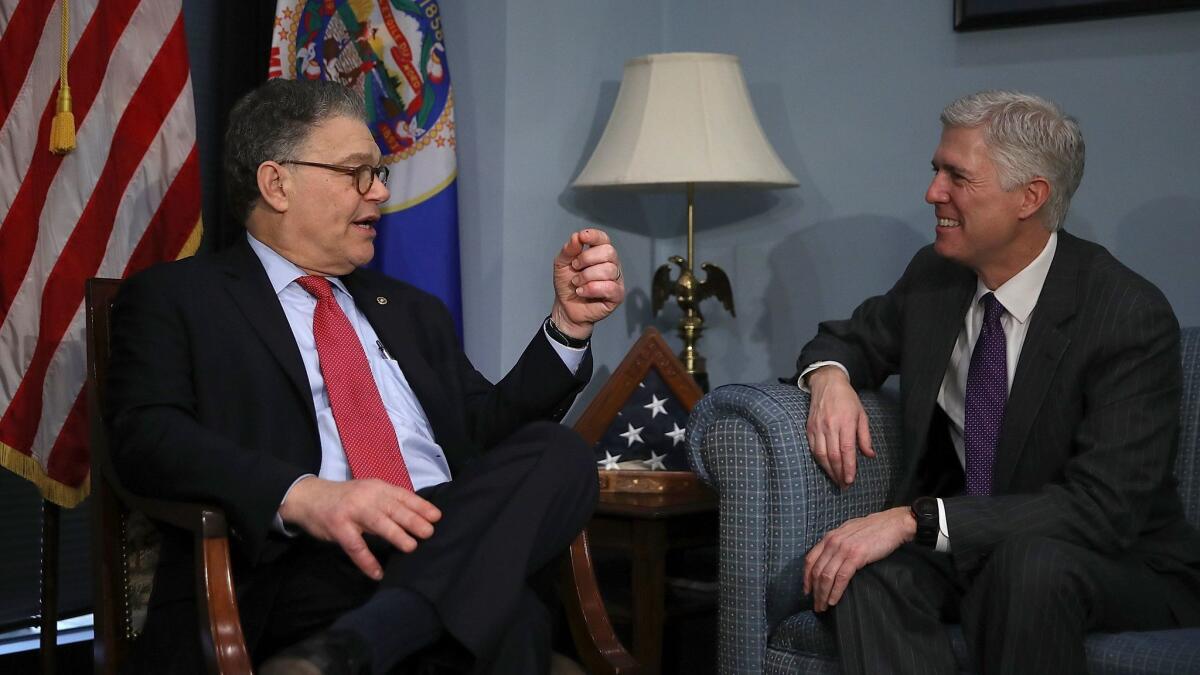
As Supreme Court nominee Neil M. Gorsuch asserts that he is beholden to no ideology or partisan agenda, Democrats on the Senate Judiciary Committee are working hard to make the case that is not true.
Sen. Al Franken of Minnesota argued it most effectively on Tuesday afternoon.
He relentlessly sparred with Gorsuch about the nominee’s dissent in the case of a trucking company employee who was fired after abandoning his cargo when no one came to help him during a breakdown, and he was stuck for hours in subzero temperatures. Gorsuch came down on the side of the company.
“I had a career in identifying absurdity, and I know it when I see it,” said Franken, a former “Saturday Night Live” performer and writer. “And it makes me question your judgment.”
He grilled Gorsuch on what the nominee would do if stuck in the same predicament as the trucking employee, who Franken said was beginning to experience symptoms of hypothermia.
“I don’t know what I would have done if I were in his shoes,” said Gorsuch, who had earlier told the panel that he felt constrained by the existing law at the time of the case to decide for the company, regardless of whether he empathized for the employee’s predicament. “I don’t blame him at all for doing what he did do. I thought a lot about this case. I totally empathize.”
Franken shot back. “I would have done exactly what he did,” Franken said. “And I think everyone here would have done exactly what he did. And I think it is an easy answer.”
The senator also grew impatient as Gorsuch recycled responses from earlier in the day that he is completely apolitical as a judge and has no place weighing in on political issues. He repeatedly cut the nominee off while building his case that Gorsuch had strong political opinions and ties to partisans, reading from exchanges with high-level Republicans during the administration of George W. Bush that suggested he was a fiercely loyal Republican foot soldier.
Then Franken turned to the Conservative Political Action Conference, the annual gathering of conservatives in Washington, where Franken said White House Chief of Staff Reince Priebus and senior advisor Stephen K. Bannon pointed to the Gorsuch nomination as a central part of their plan to “deconstruct the administrative state” and roll back 40 years of regulatory law.
“Are you comfortable with your nomination being described in such transactional terms?” Franken asked Gorsuch.
“There is a lot about this process that makes me uncomfortable,” Gorsuch said.
- Share via
Trump didn’t quite close the deal with House GOP on Obamacare repeal bill
President Trump might not have quite closed the deal Tuesday when he swooped over to Capitol Hill to lobby reluctant Republicans to get behind the GOP plan to replace Obamacare.
The most conservative Republican lawmakers remained deeply skeptical despite the president’s hard sell during a morning meeting in the Capitol basement.
The momentum Speaker Paul D. Ryan hoped to gather ahead of Thursday’s vote left leaders scrambling to shore up support.
“I haven’t heard anyone who changed their mind after this morning,” said Rep. Warren Davidson (R-Ohio), a member of the conservative House Freedom Caucus, who remains opposed.
“The president’s a persuasive guy and he’s well liked,” said Davidson, adding that most of the opponents “worked hard to see our president elected.”
But he added, “I didn’t run on a pretty slogan like ‘repeal and replace.’ I ran on fixing the problem.”
Trump warned House Republicans they would lose their majority in the next election if they failed to repeal and replace the Affordable Care Act.
The president’s speech was part pep talk, part finger pointing, and he singled out Rep. Mark Meadows (R-N.C.), the Freedom Caucus chairman, joking, “Oh, Mark, I’m gonna come after you,” according to a source in the room.
But even amid the nervous laughter, the most conservative lawmakers seemed ready to take that risk.
Rep. Walter B. Jones (R-N.C.), who said the session was his first time meeting with the president, was taken aback by Trump’s behavior. It did not win his vote.
“For me, I’m raised in the South. I’ve learned to say thank you, no thank you,” said Jones, a veteran congressman often at odds with his party. “That’s no way. You shouldn’t single anybody out. They’re not up here to represent a president or an administration. They’re up here to represent the people of their district.”
Rep. Paul Gosar (R-Ariz.) said he would not be moved by such tactics and skipped Trump’s talk for an unrelated meeting on water issues important to his state. He is voting no.
“I don’t care who says it. I’ve lived this,” said Gosar, a dentist, who said he feels the bill is being arbitrarily rushed. “I’m tired of this place: You got to pass something because there’s some little deadline? Do the right thing.”
Republican leaders can afford to lose no more than about 20 votes and still pass the bill with a simple majority.
Outside groups were adding pressure Tuesday, with the conservative Heritage Action opposing the bill but the influential U.S. Chamber of Commerce supporting it — and both promising the vote would be counted in their annual scorecards of lawmakers’ performances.
The right-leaning Club for Growth started running ads in the districts of 10 Republican lawmakers who had expressed reservations about the bill, pushing them to vote against it.
After making late changes to the bill to attract more support, Republican leaders want to build momentum ahead of Thursday’s vote.
They’ve punted many of the toughest issues — including a promise to boost tax credits to help older Americans pay for healthcare — to the Senate, where Majority Leader Mitch McConnell (R-Ky.) promised to take up the bill as soon as next week.
Senate Minority Leader Charles E. Schumer (D-N.Y.) said the late changes were no better than “putting a fresh coat of paint on an old jalopy” and suggested Republicans were “walking the plank” by taking votes on a bill that will not pass the Senate.
- Share via
Gorsuch open to idea of cameras in Supreme Court
On the heels of a C-SPAN poll that found 76% of Americans want to be able to watch Supreme Court arguments on television or over the Internet, Supreme Court nominee Neil Gorsuch said it is something he would be open to considering.
Several other current and former justices have long resisted such efforts. “I can tell you the day you see a camera come into our courtroom, it’s going to roll over my dead body,” former Justice David Souter told a congressional committee in 1996.
But asked about the issue by Sen. Amy Klobuchar (D-Minn.), Gorsuch said, “I come to it with an open mind. It’s not a question I confess I have given a great deal of thought to.”
Gorsuch joked that he is getting plenty of experience with cameras of late. “The lights in my eyes are a bit blinding sometimes,” he said. “So I have to get used to that.”
- Share via
‘Nobody speaks for me,’ Gorsuch says of ‘dark money’ group
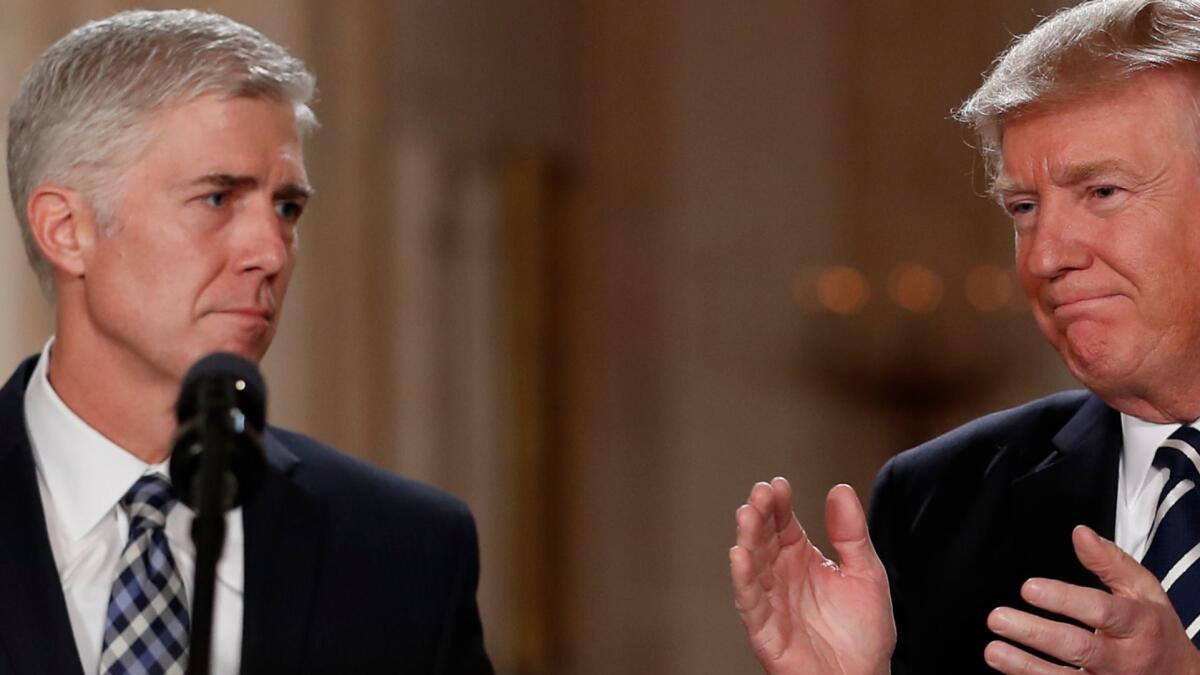
Democrats questioning Supreme Court nominee Neil M. Gorsuch took aim at the millions of dollars from unidentified donors that have gone to a political organization advocating for his confirmation.
Sen. Sheldon Whitehouse (D-R.I.) sparred with Gorsuch extensively on the issue, ultimately calling on him to publicly urge the donors to the group to reveal themselves.
Gorsuch demurred.
Whitehouse also asked Gorsuch to opine on why the donors are so invested in seeing him on the court.
“You’d have to ask them,” Gorsuch said.
Whitehouse shot back: “I can’t because I don’t know who they are. It is just a front group.”
The exchange seemed to annoy the otherwise unflappable nominee.
When Republicans on the panel came to his defense and gave Gorsuch another opportunity to address the issue of what Whitehouse called “dark money” supporting his nomination, Gorsuch was resolute.
“Nobody speaks for me,” he said of the suggestion the group represented him. “Nobody. I speak for me. I am a judge. I don’t have spokesmen. I speak for myself.”
- Share via
Democratic National Committee leader faces steep climb to break GOP dominance
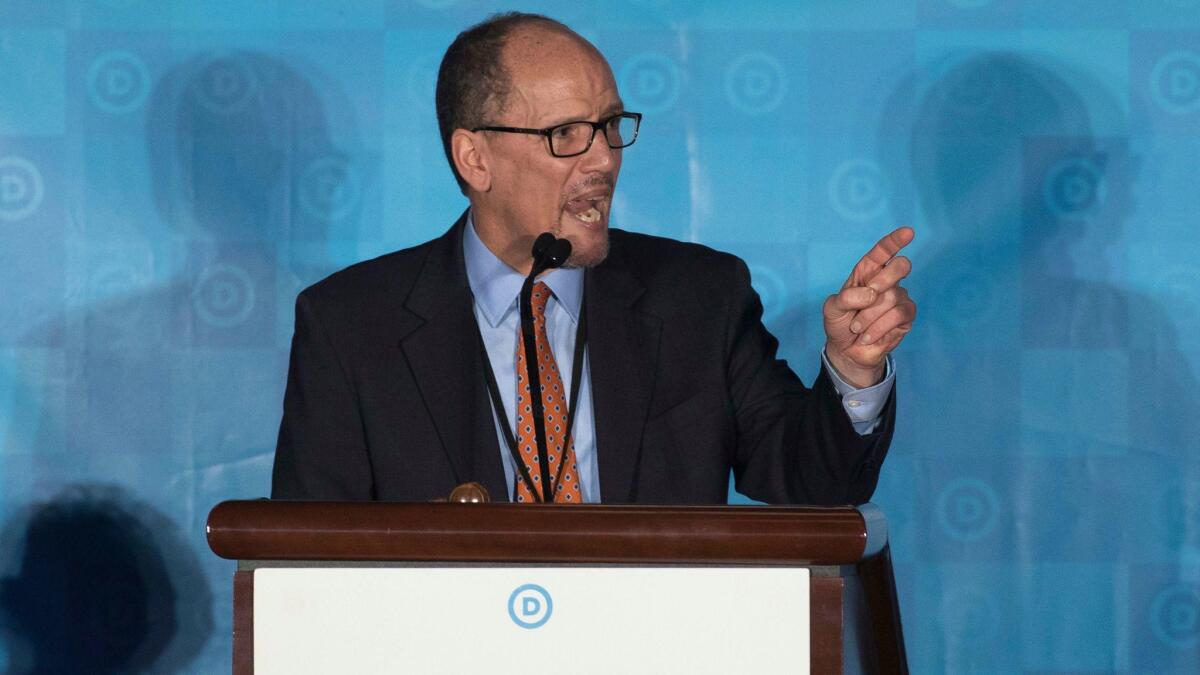
Tom Perez can only hope that the Democratic Party has hit bottom.
He has taken over as chairman of the Democratic National Committee just as the party is struggling to recover from a November rout that left Republicans in charge of the White House, both houses of Congress and most of the nation’s governorships and state legislative chambers. It’s hard to imagine how things could get any worse in 2018 or 2020.
In an interview with the Los Angeles Times, Perez was candid about some of the party’s failures in 2016, most notably its abandonment of vast stretches of rural and small-town America.
But Perez, 55, who was Labor secretary under President Obama, offered little detail on what changes the party would make to win over President Trump’s supporters in those areas.
He also glossed over the internal rancor that lingers from the party’s split between establishment leader Hillary Clinton and insurgent Bernie Sanders in the Democratic presidential race.
What follows are excerpts from Perez’s remarks.